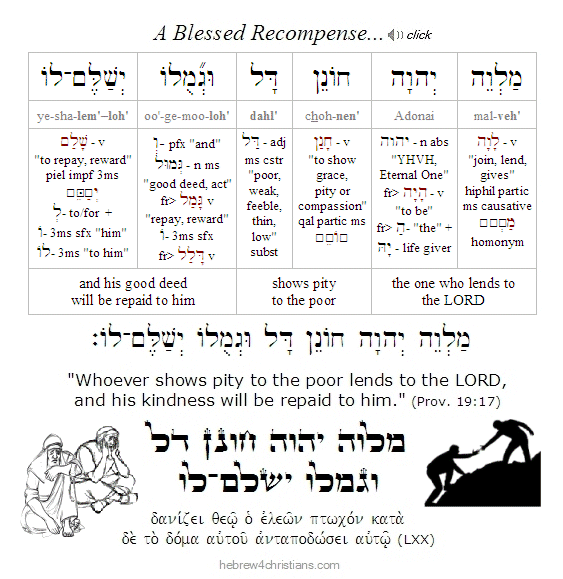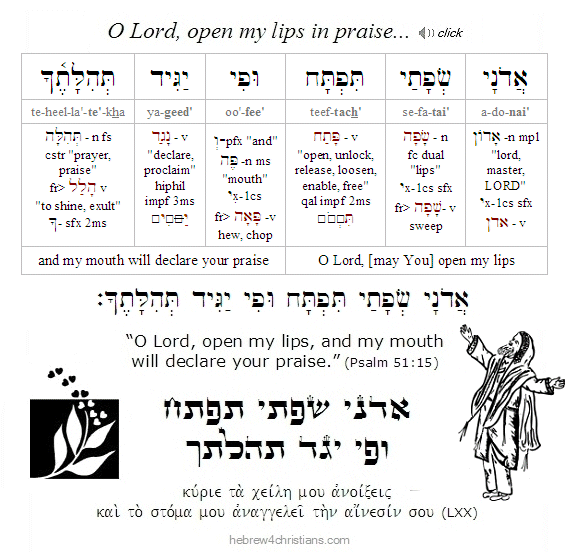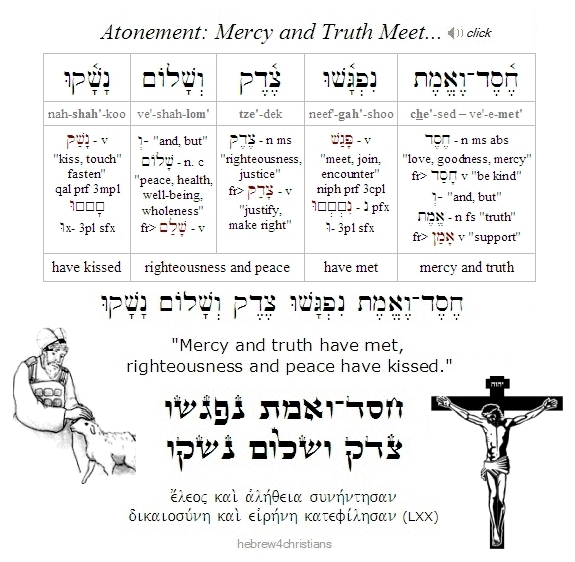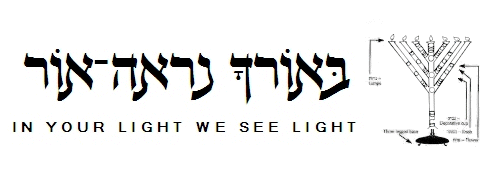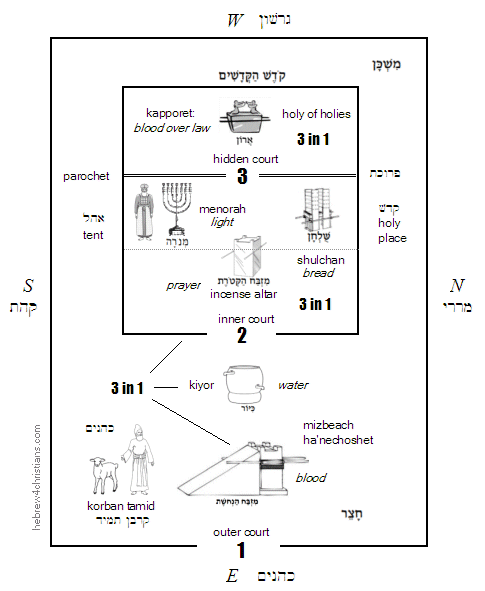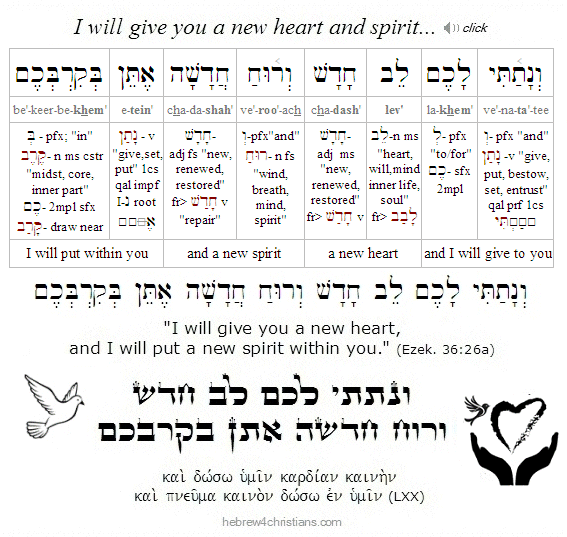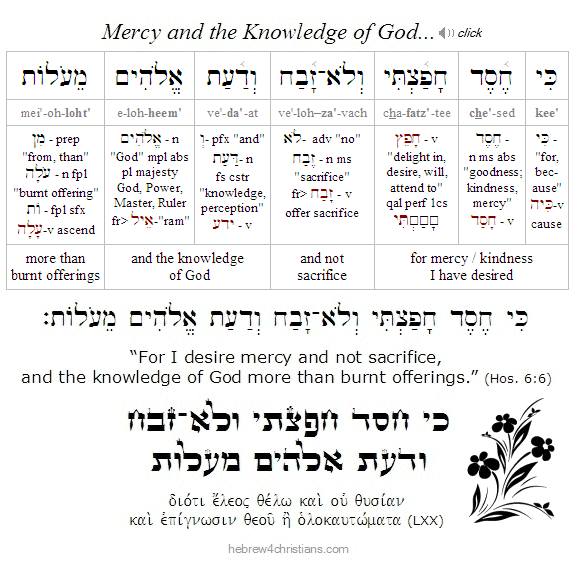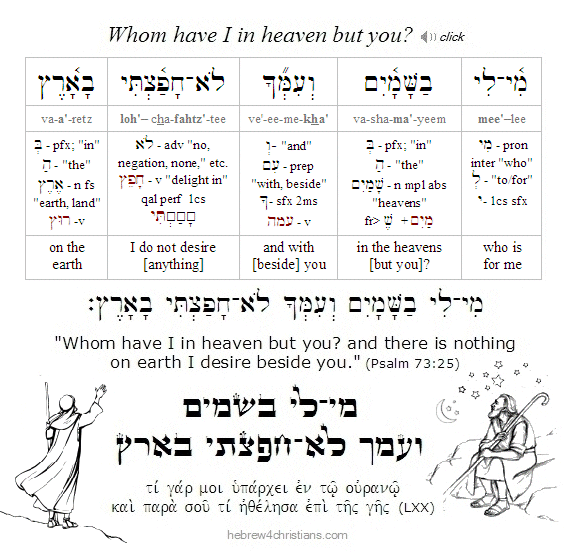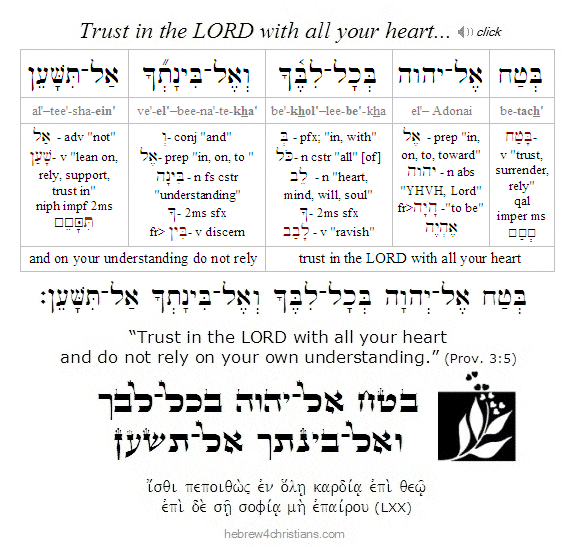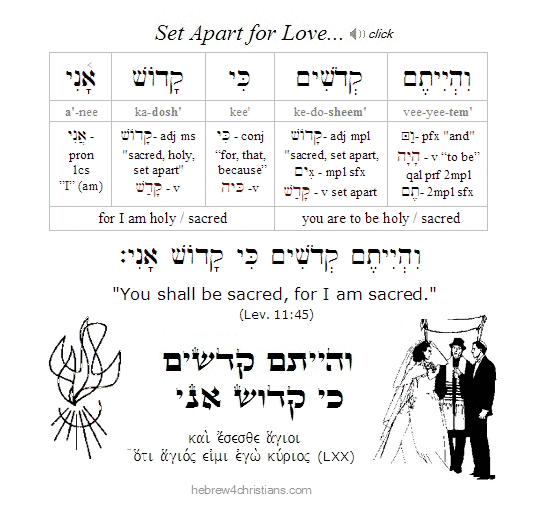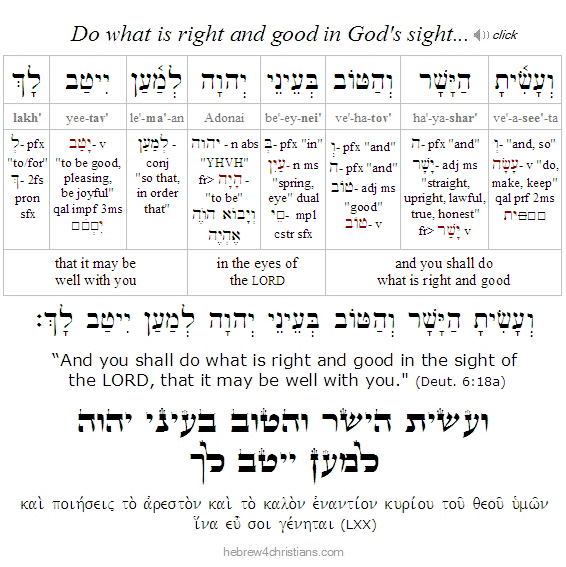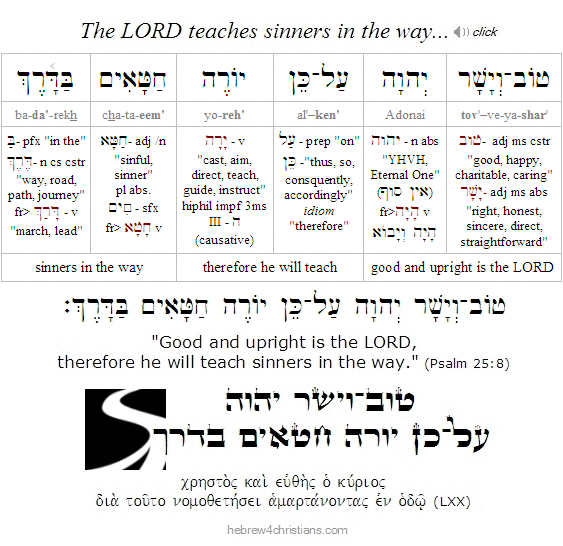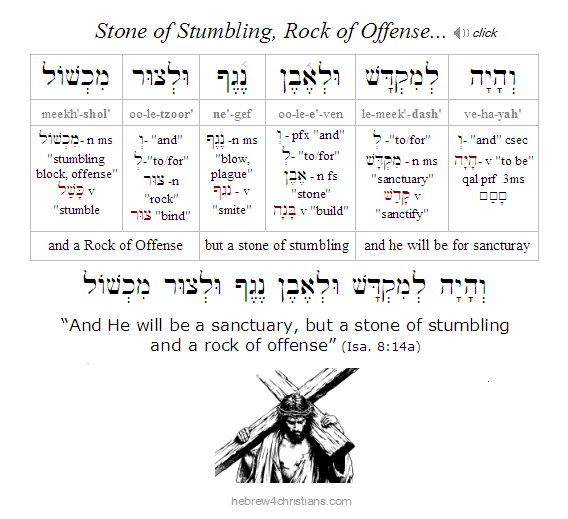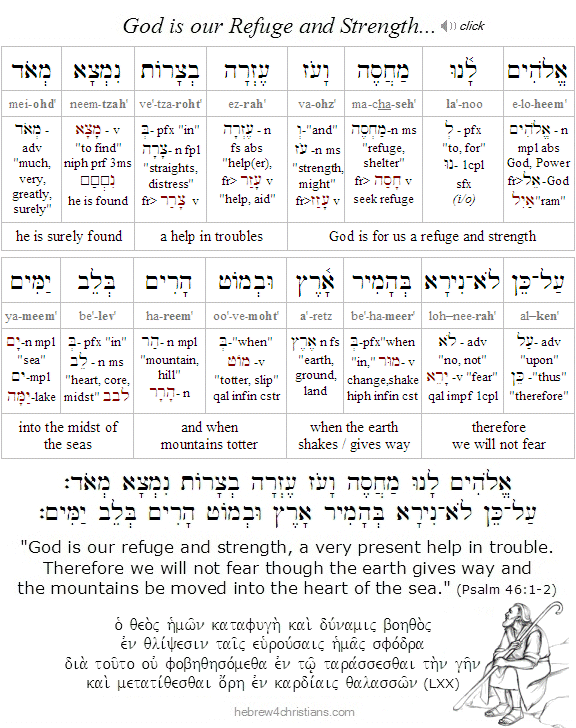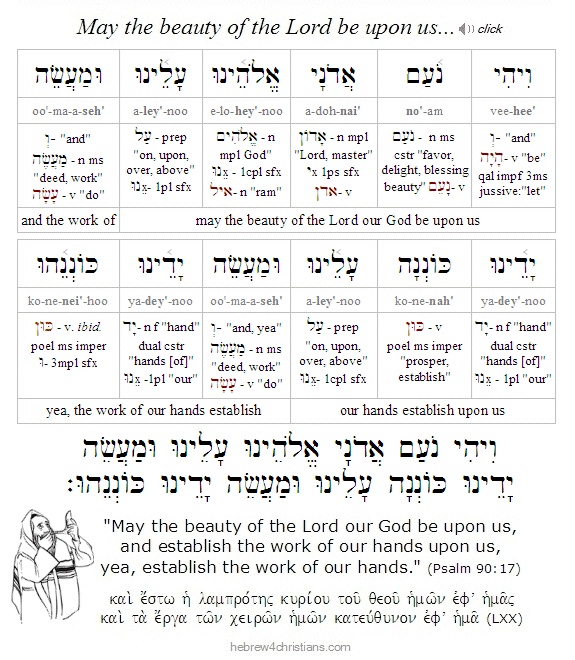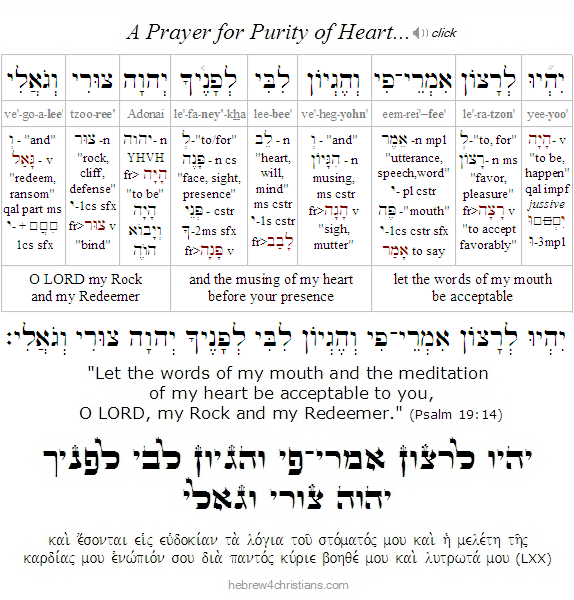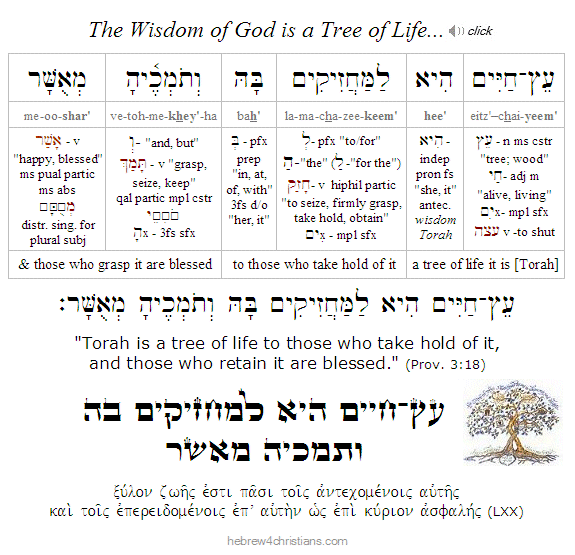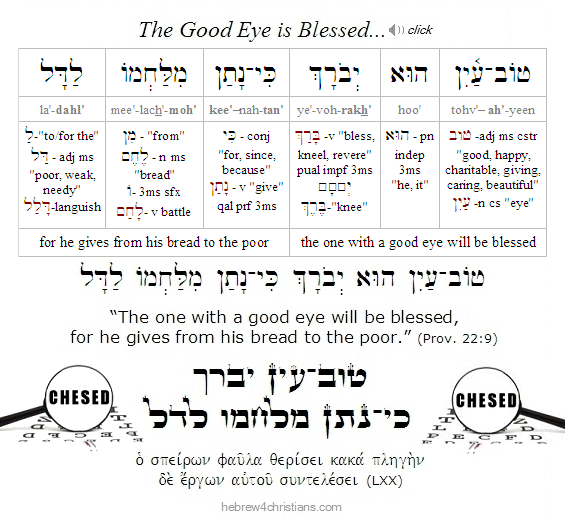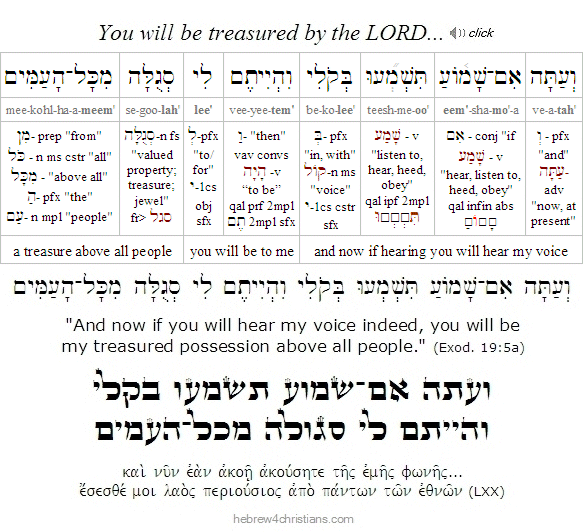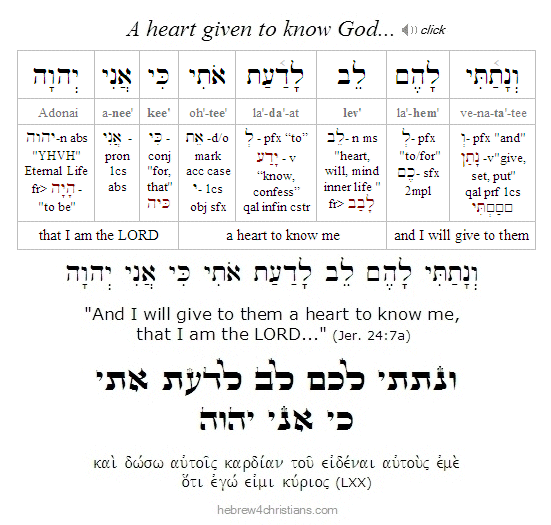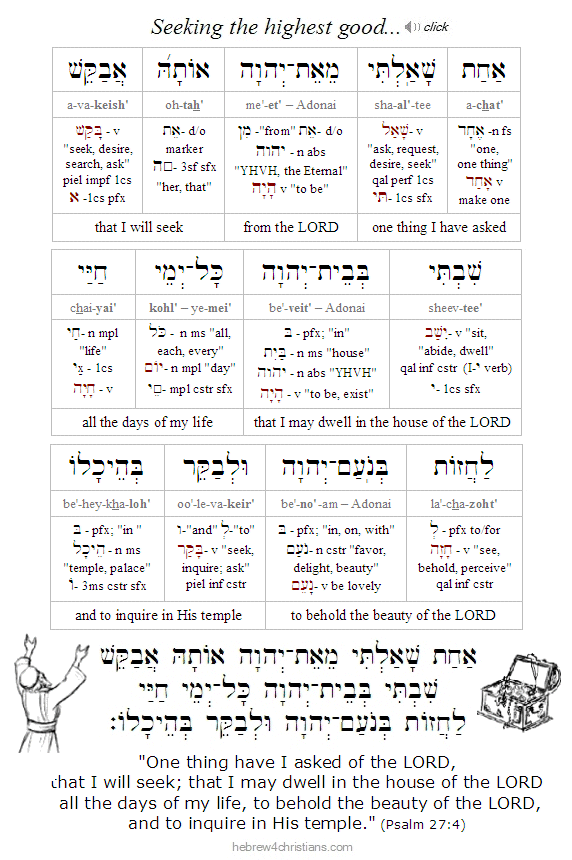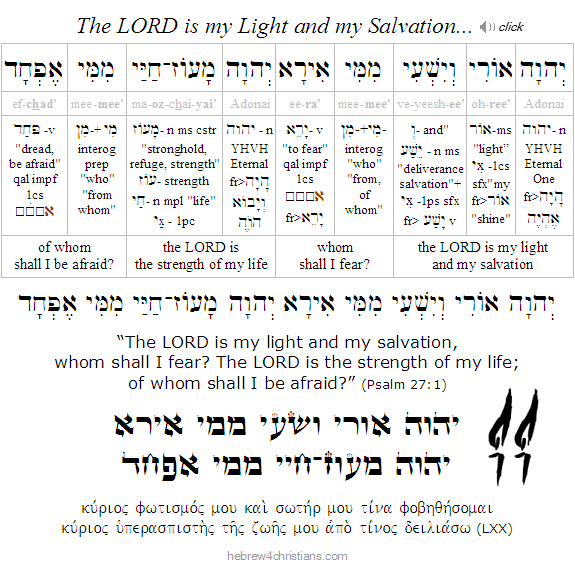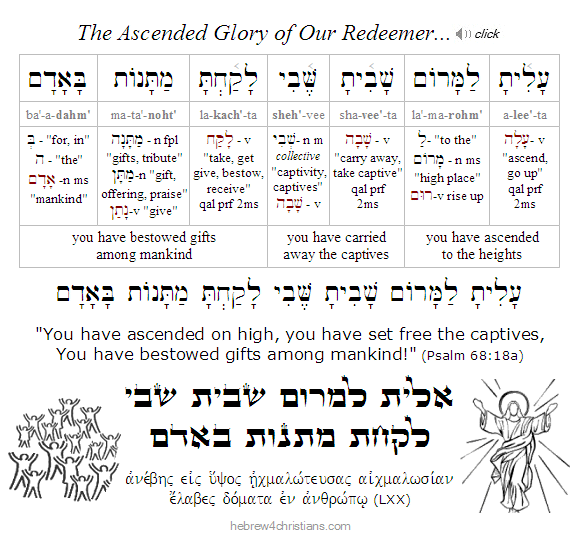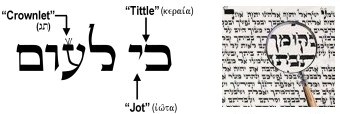|
Jewish Holiday Calendar
For February 2025 site updates, please scroll past this entry....
The Torah divides the calendar into two symmetrical halves: the Spring and the Fall, indicating the two advents of Messiah. The Biblical year officially begins during the month of the Passover from Egypt (called Rosh Chodashim, see Exod. 12:2), and the spring holidays of Passover, Unleavened Bread, and Firstfruits both recall our deliverance from Egypt and also our greater deliverance given by means of the death, burial, and resurrection of the Messiah, the great Passover Lamb of God. Yeshua was crucified on erev Pesach, buried during Unleavened Bread, and was resurrected on Yom Habikkurim (Firstfruits). The holiday of Shavuot (i.e., "Pentecost") both commemorates the revelation of the Torah at Sinai as well as the revelation of the Ruach HaKodesh (Holy Spirit) at Zion.
The intermediate months of summer end with the advent of the sixth month of the calendar, called the month of Elul, which recalls the time Moses interceded on behalf of Israel after the sin of the Golden Calf. To commemorate this time of our history, we likewise focus on teshuvah (repentance) in anticipation of Rosh Hashanah and especially in anticipation of Yom Kippur, the great "Day of Atonement." In Jewish tradition the 30 days of Elul are combined with the first ten days of the seventh month (called the "Days of Awe") to set apart "Forty Days of Teshuvah" leading up to the Day of Forgiveness for Israel. Immediately following Yom Kippur, the mood changes as we begin preparing for a joyous week-long celebration called Sukkot (i.e., "Tabernacles") that concludes with the holiday of Simchat Torah.
The winter holidays (חגי החורף) remember special times when God acted on behalf of His people so that they would triumph over their enemies, and therefore they prophetically picture the final victory in the world to come:
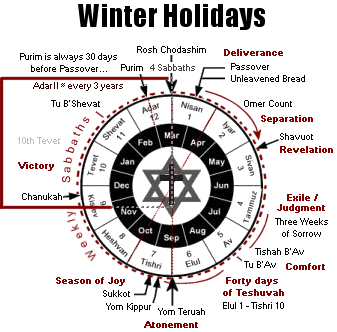 |
The Winter Holidays:
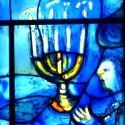
Note that in accordance with tradition, the following holiday dates begin at sundown:
- Month of Tevet (Mon., Dec. 30th [eve] - Wed. Jan. 29th [day])
- Month of Shevat (Wed. Jan. 29th [eve] - Thurs. Feb. 27th [day])
- Month of Adar (Thurs. Feb. 27th [eve]) - Sat. March 29th [day])
- Month of Nisan (Sat. March 29th [eve]) - Sun. April 27th [day])
 |
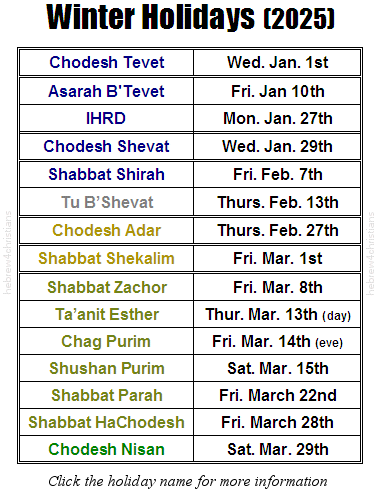 |
Note: For more about the dates of these holidays see the Calendar pages....
February 2025 Updates
Truth and the Sacred...
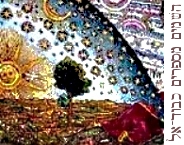
02.28.25 (Shevat 30, 5785) Our Torah portion this week (Terumah) proclaims God's word: "Let them make me a mikdash ("holy place," "sanctuary"), that I may dwell in their midst" (Exod. 25:8). Though this verse refers to the physical mishkan (i.e., the "Tabernacle"), it more deeply refers to the duty of the heart to sanctify the Name of God and bring a sense of holiness to the inner life. This requires that we focus the mind and heart to honor the sacredness of life, taking "every thought captive" to the truth of God in Messiah (2 Cor. 10:5). The truth of God is for life, chaverim...
Since our minds and hearts are gateways to spiritual revelation, we must be careful to not to abuse ourselves by indulging in sloppy thinking or unrestrained affections. God holds us responsible for what we think and believe (Acts 17:30-31), and that means we have a duty to honor moral reality and truth. There is an "ethic of belief," or a moral imperative to ascertain the truth and reject error in the realm of the spiritual. Since God holds us responsible to repent and believe the truth of salvation, He must have made it possible for us to do so ("ought" implies "can"). And indeed, God has created us in His image and likeness so that we are able to discern spiritual truth. He created us with a logical sense (rationality) as well as a moral sense (conscience) so that we can apprehend order and find meaning and beauty in the universe He created. All our knowledge presupposes this. Whenever we experience anything through our senses, for example, we use logic to categorize and generalize from the particular to the general, and whenever we make deductions in our thinking (comparing, making inferences, and so on), we likewise rely on logic. We have an innate intellectual and moral "compass" that points us to God.
God created people so that they could discern truth about reality. The mind functions according to logical laws because it is made in the image and likeness of God Himself... God Himself is the ground of all logic, since He created reality and structured the world to be knowable according to its laws. As it is written: "In the beginning was the word/logic (ὁ λόγος), and the λόγος was with God, and the λόγος was God" (John 1:1). God created a world that exhibits order and great beauty. And since human beings were created b'tzelem Elohim, in the image of God, our thoughts (and the words used to formulate our thoughts) as well as our actions are likewise intended to exhibit order and beauty. "For the fruit of light (καρπὸς τοῦ πνεύματος) is found in all that is good and right and true" (Eph. 5:9). Therefore "whatever is true... think on these things" (Phil. 4:8).
Followers of Yeshua are commanded to love the truth and to think clearly about their faith. The ministry of reconciliation itself is defined as "the word of truth, by the power of God, through weapons of righteousness" (2 Cor. 6:7). Indeed, the word of truth (τὸν λόγον τῆς ἀληθείας) is a synonym for the "gospel of salvation" itself (Eph. 1:13; Col. 1:5; James 1:18). We are saved by Yeshua, who is the "way, the truth, and the life" (John 14:6). God commands all people to believe this truth (Acts 17:30-31; 1 Tim. 2:4). People perish because "they refuse to love the truth and so be saved" (2 Thess. 2:10-12). Therefore we see that the issue of truth is central to salvation itself....
Hebrew Lesson
Psalm 25:10 reading (click):
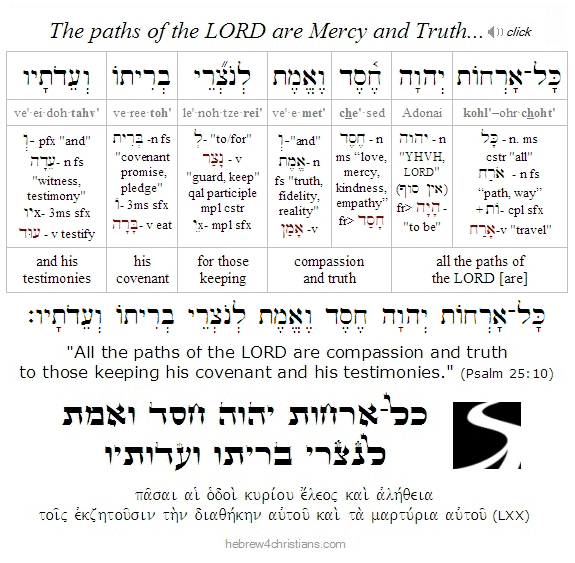 |
Audio Discussion:
Rich toward Heaven...
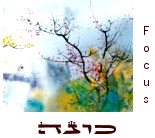
02.28.25 (Shevat 30, 5785) In our Torah for this week (i.e., Terumah) we read: "Take for Me an offering..." (Exod. 25:2). The midrash says that this teaches that when you give tzedakah (charity) to those in need, you "take" God to yourself, as it is written: "For the LORD stands to the right of the needy" (Psalm 109:31), and "whoever shows pity to the poor lends to the LORD, and his kindness will be repaid to him" (Prov. 19:17).
It may seem counter-intuitive to carnal and worldly reasoning, but when you give to others, you will receive even more in return (Mal. 3:10). Indeed the person who seeks treasure for himself is not rich toward God, since we only have what we have given away in kindness (Luke 12:21). As our Lord taught: "Give, and it will be given to you. Good measure, pressed down, shaken together, running over, will be put into your lap. For with the measure you use it will be measured back to you" (Luke 6:38).
מַלְוֵה יְהוָה חוֹנֵן דָּל
וּגְמֻלוֹ יְשַׁלֶּם־לוֹ

"Whoever shows pity to the poor lends to the LORD,
and his kindness will be repaid to him."
(Prov. 19:17)

"Take for me an offering..." (Exod. 25:2). This is a paradoxical statement: Is it a command or a freewill offering? The answer is that it is both, for we are compelled to come to the Lord who kindly invites us to draw near to him.
Consider that the One who fills heaven and earth condescends in profound humility to dwell with us... And it is from his heart of amazing grace that He says, "There I will meet with you" (Exod. 25:22). The infinite one becomes finite so that we can connect with him, just as Yeshua emptied Himself, "tabernacling" with us, so that we could be raised up and eternally drawn into the heart of God.
The Place of God...
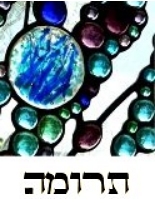
The following is related to this week's Torah reading, parashat Terumah...
02.28.25 (Shevat 30, 5785) "Let the people make me a sacred place (מִקְדָּשׁ) that I may dwell in their midst" (Exod. 25:8). But what is this other than heartfelt and earnest prayer? The materials of the sanctuary come from "freewill offerings" (נְדָבוֹת), which derive from the inner yearning of the soul...
We offer our hearts up to God, and the Lord, in his great mercy, fills us with faith, hope, and love. Our spiritual need for God is his habitation with us; our hunger and thirst for healing and life is a gift from heaven (Matt. 5:6). Our blessed desperation impels us to pray because we cannot help praying. As Abraham Heschel once said, "prayer is more than a light before us; it is a light within us." At its deepest level, prayer is not about asking but receiving; it is not so much appealing to God as it is allowing God to appeal to us.
As John Bunyan once wrote, "Rather let thy heart be without words than thy words be without heart." Amen. Adonai sefatai teef'tach, "O Lord, may You open my lips," oo'fee yageed tehilate'kha, "and my mouth will declare your praise" (Psalm 51:15).
אֲדנָי שְׂפָתַי תִּפְתָּח
וּפִי יַגִּיד תְּהִלָּתֶךָ

"O Lord, open my lips,
and my mouth will declare your praise"
(Psalm 51:15)

Half-Cubits and Mystery...
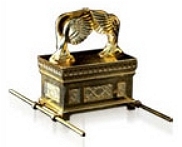
The following is related to this week's Torah reading, parashat Terumah...
02.28.25 (Shevat 30, 5785) The renowned "Ark of the Covenant" (ארון ברית־יהוה) was constructed using fractional measurements (i.e., "half-cubits") to specify its length, width, and height: "They shall make an Ark of acacia wood (ועשׂוּ ארוֹן עֲצֵי שִׁטִּים). Two cubits and a half (אַמָּתַיִם וָחֵצִי) shall be its length, a cubit and a half (ואַמָּה וָחֵצִי) its breadth, and a cubit and a half its height" (Exod. 25:10). The sages comment that the "half-cubit" is symbolic of our fractional understanding, alluding to mystery and even paradox.
"You shall overlay it with pure gold, inside and outside shall you overlay it, and you shall make on it a crown of gold (זֵר זָהָב) around it" (Exod. 25:11). The heart of the Tabernacle held the law of God, a picture of Yeshua who bore the law of God within his heart (Matt. 5:17-18). And though the Ark was made of wood from the common thorntree, it was covered inside and out with pure gold and bore a "crown" where the sacrificial blood was offered for atonement, a picture of Yeshua who clothed himself in our humanity, bore the crown of thorns, and shed his blood for our eternal atonement (Heb. 9:12).
Note that the Hebrew text says "they shall make an ark of acacia wood" (Exod. 25:10). Unlike other furnishings of the Tabernacle that were made by Betzalel, the text uses the plural verb here: "they shall make an ark" (וְעָשׂוּ אֲרוֹן), which implies that every person had a part in upholding the Torah. More - each person had a part in the place of blood atonement offered upon the kapporet - the cover of the Ark - which again symbolizes that Yeshua offered his life for the sins of the whole world (1 John 2:2). Shalom chaverim.
Hebrew Lesson
Psalm 85:10 reading (click for audio):
The Light of the Servant...
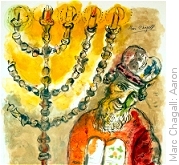
The following is related to our Torah portion this week, parashat Terumah...
02.28.25 (Shevat 30, 5785) One of the main components of the Mishkan (i.e., Tabernacle) was the Menorah (מְנוֹרָה), a beautifully designed lampstand that illuminated the Holy Place. Our Torah portion this week (Terumah) reveals that all its intricate parts (i.e., its seven branches with seven lamps, nine flower blooms, eleven fruits, and twenty two cups) were formed from a single piece of pure gold (זָהָב טָהוֹר) that was "beaten" or "hammered" into shape (Exod. 25:36). The gold color is symbolic of the divine substance (gold has a hint of the color of blood combined with the pure white). The six lamps of the menorah faced the central lamp, called the shamash or "servant," so called because it bore the flame from which the other lamps were kindled.
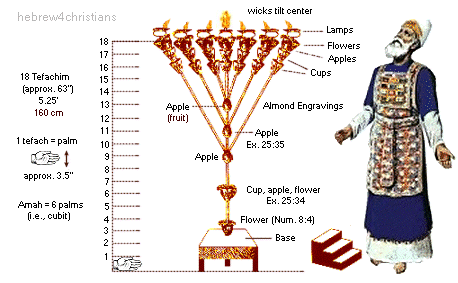 |
The seven lamps of the menorah were lit daily, "from evening until morning," starting from the central lamp (i.e, the shamash) and then moving right to left (Exod. 27:21). According to the Talmud (Shabbat 22b), while all the lamps received the same amount of olive oil, the "westernmost" lamp (according to Rashi, the center lamp, due to its orientation) miraculously never ran out of oil, even though it was kindled first in the sequence. When Aaron would rekindle the lamps every evening, he saw the shamash still burning, so he simply refilled it with oil and trimmed its wick. This miracle is also said to have occurred during the Temple period, though it abruptly ended about 40 years before the destruction of the Second Temple (c. 30 AD), after the death of Yeshua the Messiah, the true Servant and Branch of the LORD. As it is attested in the Talmud: "Our Rabbis taught: During the last forty years before the destruction of the Temple the lot ['For the Lord'] did not come up in the right hand; nor did the crimson-colored strap become white; nor did the westernmost light shine" (Yoma 39a).
The Scriptures declare that God is light, and Yeshua is the true Light of God (1 John 1:5; John 1:9). The light from the menorah reveals spiritual light. It was hidden from view from the outside of the Tabernacle, but was seen while inside the holy chamber, before the holy place of sacrificial atonement. The light itself came from the burning of pure and beaten olive oil - a symbol of anointing and the Holy Spirit (רוּחַ הַקּדֶשׁ). It enabled service to God to be performed, though it was not a light to be used for profane purposes. Notice that the six lamps faced the central lamp - a picture of Yeshua, the Light of the World whose arms and legs were "hammered" for our sins.... He is the suffering servant (shamash) who lightens everyone in the world; He is the central light that upholds the other branches (John 15:5).
Hebrew Lesson
Psalm 36:9 Hebrew reading:
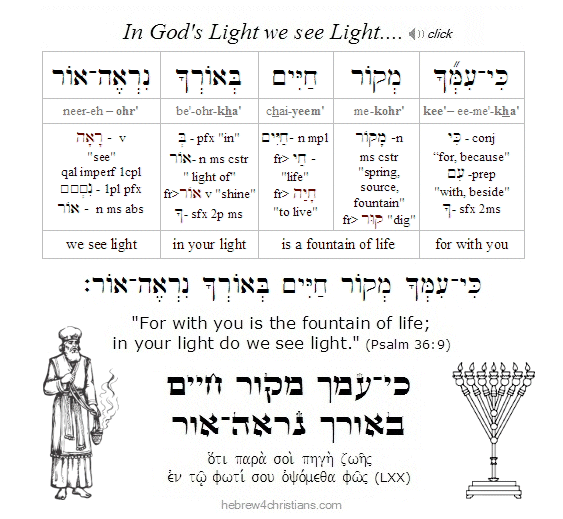 |
For more on this fascinating subject, see "A Closer Look at the Menorah."
Remedy for the Soul...

02.27.25 (Shevat 29, 5785) A great lesson is found in the Psalms: "I lift up my eyes to the hills, from where comes my help? My help is from the Lord, the Maker of heaven and earth" (Psalm 121:1-2). The sages recommend this verse to be better read as: "Will I lift up my eyes to the hills to find help? No, for my help is from the Lord..." The focus should not be upon the physical "high places" of the earth but upon the Ground of all being itself. We are to look to Lord, "oseh shamayim va'aretz," "the Maker of heaven and earth."
Some people look for "high places," ideals, "mountain top" experiences to bring heaven down to earth, and therefore they have little use for rawness of gospel truth. In their striving to attain virtue, they are offended at the cross because it bespeaks our need, brokenness, and the sigh of human frailty. Divine Wisdom, however, is distilled through real experience, which inevitably reveals our poverty of spirit and our powerlessness to heal ourselves. The fear of the Lord is the beginning of such wisdom, since this fear is the realization of our inability to transcend our own "fallenness," that is, to be delivered from our perverse inclination to destroy ourselves. The fear of the Lord reveals our alienation from what is truly good and what we truly need, regardless of whatever we imagine to be ideal.
Moses was a case in point. Trained and educated in the wisdom and ideals of ancient Egypt, as a young man he became a "failed messiah" when he sought to ascend to the truth in his own virtue and strength, and consequently was he sent into exile for 40 years to learn his own nothingness. When the Lord called out to him from the paradoxical bush that he was chosen to lead Israel from Egyptian bondage, Moses replied "Who am I?" And that marked the moment of Moses' revelation. The lesson of Moses in Midian is that encountering God comes from emptying the "self" of its illusions. Salvation, if it is possible at all, is the sovereign work of God; the "flesh" has nothing to do with it.
Poor human nature sighs over what might have been but has been lost to fecklessness and sinful frailty. Time reveals the abandonment of all carnal hope, even of ethical and religious ideals, and to look only to the Lord the maker of heaven and earth, for help. And that is the message of the cross again, which scandalizes romantic conceits of pride by revealing them useless before the heavenly verdict. The cross reveals our need for salvation from ourselves, from the albatross of sin slung heavily about our necks.
Yeshua did not come to present a higher ideal than was given in the law of Moses, for if we despair to keep the law of God and understand our powerlessness, how would teaching an even higher ideal help? He did not come as a teacher but as our deliverer, and for that he was born to die. He emptied himself and made himself nothing to so that he would offer his life upon the altar of the cross, and by his death we are healed.
He speaks to those who hunger and thirst for salvation: "Come to me you who labor and are heavy laden, and I will give you rest. Take my yoke upon you and learn from me, for I am humble and lowly of heart, and you shall find rest for your soul. For my yoke is easy, and my burden is light" (Matt. 11:28-30). The answer is found in him - in his work for us - wherein he dies in our stead and remakes us through the power of the Holy Spirit. By means of his death we are freely given his blessing of life, everlasting holiness, and deliverance from sin. This is the "good news" of the gospel - encouragement for those whose hearts have fainted, who have despaired over lost ideals and who desperately know they have failed in life.
The message of Yeshua is to come to him to find your help in the Lord. He will take you up, remake you, and restore your wasted years, made safe in the arms of the one who alone is your help, the Maker of heaven and earth.
The old hymn sings true:
"Just as I am, without one plea,
But that Thy blood was shed for me,
And that Thou bidst me come to Thee -
O Lamb of God, I come, I come."
Whatever your present condition, God loves you with the very passion that led Yeshua to the cross. The Lord is present for you now, if you will believe, not some time later, after you've attempted to remedy yourself or after you have somehow "endured to the end." Chaverim, we never get beyond this place of need wherein we come to know God as the only sure help for our lives, which is to say that we never get beyond our need for the cross...
Hebrew Lesson
Psalm 121:1-2 reading (click):
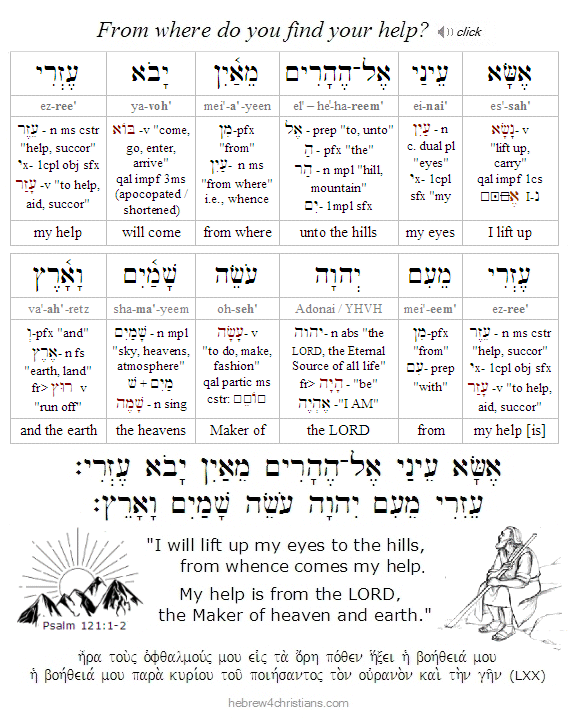 |
Trusting love for you...
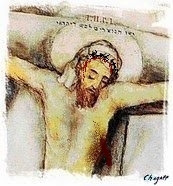
"When you think of what you are, and despair; think of what He is, and take heart." - Spurgeon
02.27.25 (Shevat 29, 5785) "Father forgive them, for they know not what they do" (Luke 23:34). Yeshua's intercession is not just for the sins we have consciously committed but to the sins done in the blindness of our unconscious; his sacrifice was offered not just for our known acts of sin, but for the wayward condition of our darkened hearts... This is essential. When God forgives our sin, it goes beyond forgiveness of the sinful behavior to the innate and underlying sickness of the heart. Divine forgiveness is remedy for our alienation, our lostness. It is healing of our deepest self, our secret heart, the "who we are" place of our new creation. If God accepts us at all, he accepts us completely, and that means we are made righteous by means of his love and grace.
Teshuvah ("repentance") is not about becoming better but about becoming different. It is about newness of life. As Yeshua said, "Unless you are born again, you cannot see the kingdom of heaven." Believe that you have received it and it will be yours (Mark 11:24).
Hebrew Lesson
Psalm 63:3-4 Hebrew reading:
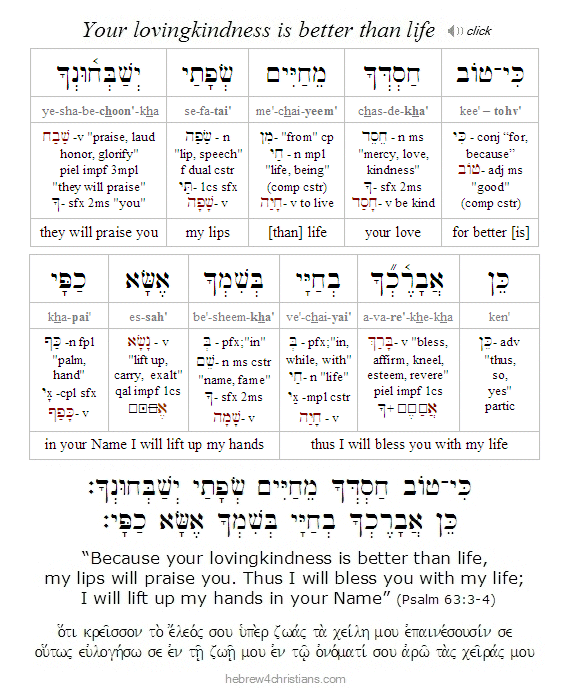 |
Eternal life is found in the one who "loved me and gave himself for me" (Gal. 2:20). I put no trust in religion, nor in the reformation of my character, nor in my will to believe, but solely in the kindness of the one who heals me from the ruin of myself.
Being Born of God...
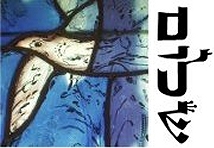
02.26.25 (Shevat 28, 5785) Today I would like to consider an important passage of Scripture that speaks about how we are forever changed by God's grace, mercy, and power. It is written that "all who receive Yeshua, who believe in his name, are given the right to become the children of God, and are born, not of blood nor of the will of the flesh nor of the will of man, but of God" (John 1:12-13).
These precious words, written in the prologue of the Gospel of John, are inestimably important for us, for they explain what it means to be a child of God (ילד יהוה), one who is "begotten" by the Father, and therefore they help us discern whether we belong to him or not... Let's take some time to think about some of this.
First there is an implied distinction between those who "receive" him, namely Yeshua, and those who do not. This indicates, among other things, that God is not the universal father of all people, irrespective of creed or faith, but is rather the Father of those who receive the truth of Yeshua and believe in his name. There are many, Yeshua said, who do not know the truth of the Father, and therefore they are not regenerated or born from above.
Second it must be noted that "receiving" Yeshua is not the same thing as simply saying or acknowledging that he is the Savior and Lord. "Not everyone who says to me, 'Lord, Lord,' will enter the kingdom of heaven, but the one who does the will of my Father who is in heaven. Many will say to me, 'Lord, Lord, did we not prophesy in your name, and cast out demons in your name, and do many mighty works in your name?' And then will I declare to them, 'I never knew you; depart from me, you workers of lawlessness' (Matt. 7:21-23). We must be unflinching as we consider this and all its ramifications. Yeshua warned us that there will be "many" who will assume that "all is well" with their soul only to be shocked to realize that they never were "known" by the Lord.
In this connection, consider that the Greek text translated "received him" (ἔλαβον αὐτόν) uses an active verb, not a passive form. In other words, "receiving him" means deliberately taking hold of Yeshua by faith, not merely accepting that he is who he says he is. It's entirely possible to believe that he is who he says he is, that is, to accept it as true, without receiving him in a spiritually significant way. Actively taking hold of Yeshua and clinging to him is the "narrow way" that leads to life, but simply regarding him as a great teacher while living life on your own terms is the "broad way" that deceives the soul and leads to destruction... Yeshua does not give us the option to be "neutral" with regard to our relationship with him. "No one can serve two masters, for either he will hate the one and love the other, or he will be devoted to the one and despise the other. You cannot serve God and mammon." You cannot both have Yeshua and live life your own way.
Parenthetically, someone might wonder why making an earnest decision to "receive" Yeshua is essential to salvation. Is he really the only way? And why does it matter to God what people believe? Is he intolerant of others? The question behind these sorts of questions is whether knowing the truth is possible and if so, why that matters. The Scriptures state that God has given us intuitive awareness that he exists and that we are accountable for our actions. "For the invisible things of God from the creation of the world are clearly seen, being understood by the things that are made, even his eternal power and Godhead; so that they are without excuse" (Rom. 1:20). God has created each soul with "eternity within the heart," that is, a sense that God is their creator and the first cause of all that exists (Eccl. 3:11). "The heavens declare the glory of God, and the expanse above proclaims his handiwork. Day to day pours out speech, and night to night reveals knowledge. There is no speech or words where their God's voice is not heard" (Psalm 19:1-3). Paul reasons that because of these things everyone has heard the truth of God resounding within their hearts and souls.
In questions of moral reality it is also clear that truth matters. The moral law has been written upon the hearts and consciences of all people (Rom. 2:14-15). We do not need someone to teach us that stealing is wrong, lying is wrong, torturing others is wrong, and so on. Such moral axioms are intuitively known and universally observed. Regarding matters of spiritual truth, the same logic applies in direct proportion to its significance for both our lives and because of the immense importance of the matter to God himself. After all, if it is indeed the truth that the sacrifice of Yeshua is the central act healing for all of humanity, that it is the pivot upon which the very possibility of the re-creation of the universe itself depends, then honoring this and receiving the promise of God in Yeshua is the most significant and prodigious decision you will ever make in this life.
But why faith? Why is it so important to believe? Why does our eternal destiny depend on its presence or absence within our hearts? Because the original transgression of Adam and Eve was that of unbelief, as I've written about elsewhere, and therefore repentance turns on the obedience of faith, that is, by trusting the word of God and accepting his rightful authority in our lives. Sanctification means, among other things, relinquishing the transgression of defining what is good and what is evil in our own terms by submitting ourselves to God's blessing given in the Tree of Life recovered by the Son of Man, Yeshua our "Second Adam" who overcame the lies of the serpent... We are saved by grace through faith in Him. It is not our faith that saves us but his grace; our faith is the means by which we connect with him.
Those who resolutely receive Yeshua, that is, those who "believe in his name" (להאמין בשמו) are given the "right" to become the children of God. But notice that believing in his name is exclusionary in scope, meaning that it is in his name alone that salvation and life is bestowed from above. "There is salvation in no one else, for there is no other name under heaven given among men by which we must be saved" (Acts 4:12); "I, I am the LORD, and besides me there is no Savior" (Isa. 43:11); "Turn to me and be saved, all the ends of the earth! For I am God, and there is no other. By myself I have sworn; from my mouth has gone out in righteousness a word that shall not return: 'To me every knee shall bow, every tongue shall swear allegiance.' (Isa. 45:22-23). Every knee shall bow and every tongue shall confess that Yeshua is none other than the LORD God our Savior, to the glory of God our Father (Phil. 2:9-11; Rom. 14:11). There is only one way to be made right with God, and that is through Yeshua.
This of course implies not only that God was "in Christ" but that Christ is in God, and that we receive Yeshua as the Divine Word and Lord over all, the Son of Man who is seated at the right hand of glory. Yeshua, and Yeshua alone, is "the way and the truth and the life," apart from him no one can know the heart of the Father (John 14:6). Indeed, the author of the Book of Hebrews says that though God spoke in times past by means of the prophets, but now he speaks to us "in Son," that is, in the language of the redemption in Messiah. Yeshua is the manifestation and message of all that God has to say to us regarding eternal life. He is the "brightness of God's glory," the "express image of God" who upholds all things by the word of His power, the one who purges us from our sins, is raised from the dead, and is seated at the right hand of the Majesty on High (Heb. 1:1-3). Note that the idiom of being "at the right hand" of God indicates that the "humanity" of Yeshua has been exalted as our eternal Mediator and Priest as well as the exalted ruler over all.
To "believe in his name" (εἰς τὸ ὄνομα αὐτου), then, means to receive who he is, and this entails the whole story of redemption, from the primordial beginning of God as YHVH who breathed out life to man, the original transgression that evoked the divine judgment; the sacrifice of the lamb with the promise of the coming Redeemer who would undo the curse of spiritual death, and so on. The story further includes the call of Abraham and the promise that his Seed would be the redeemer to come and the subsequent odyssey of Abraham's descendants would serve as a parable of God's deliverance as illustrated by the exodus from Egypt. The giving of the law at Sinai and the vision and of the Sanctuary foretold the need for atonement as the blood was presented over the law of God, a vision of the sacrifice of the Seed upon the cross at Calvary. To receive who he is means that we take hold of his blessing for our life and understand that the story of redemption includes us as well.
The "right" to become (or to be) a child of God is the bestowal of life granted by God's prerogative and agency that implants the "seed" or "divine nature" within you so that you are mysteriously transformed into a "new creation" (בְּרִיאָה חֲדָשָׁה), that is, made into a new kind of being that has been "begotten" or "fathered" by God. King David praised God that he was "fearfully and wonderfully made," though he anticipated the need for something more when he asked God to create in him a new heart (Psalm 51:10). Likewise the prophets foresaw the need for a new heart and spirit that God would one day bestow (Ezek. 11:9, 36:26; Jer. 24:7, 31:33). But the important point is that the new birth is exclusively the work of God, not a work of religion or spiritual aspiration. It is an "invisible" birth that comes from above (John 3:1-5). As the apostle put it: "You have been born again, not of perishable seed but of imperishable, through the living and abiding Word of God" (1 Pet. 1:23).
This implies that God alone chooses who will be his children, and while this may offend human pride that wants to arbitrate the decision, there can be no serious question that the Almighty, the source of all truth and justice, is "unfair" about the election of those who belong to him. By definition it must be affirmed that God alone saves and gives life, and that salvation is not the result of human wisdom, religiosity, or even good will. After all, if mankind could heal itself there would be no need for a Savior in the first place...
Only God saves a person and imparts divine life to them. John makes this very clear in the verse we are considering by unmistakably ascribing this power to God alone. He eliminates the other options. Saved souls are "not born of blood" (οὐκ ἐξ αἱμάτων), that is, not by bloodlines or special ancestry, nor are they born of "the will of the flesh" (οὐδὲ ἐκ θελήματος σαρκός), that is, by natural instinct as by human procreation, nor are they born of "the will of mankind" (οὐδὲ ἐκ θελήματος ἀνδρός), that is, by the choice or science of human beings, but, concludes John, they are born by God alone (ἀλλ᾽ ἐκ θεοῦ ἐγεννήθησαν).
The Lord alone gives the right or "authority" for someone to be his child. It does not come from our history, our reputation, our intelligence, our genetics, or even our will, but from God alone. The Greek word for "right" or "authority" in this verse is eksousia (ἐξουσία), which literally means "out of" or "from being" itself, implying that this is a supernatural bestowal of grace from the LORD whose inscrutable name evokes life itself (אֶהְיֶה). As Yeshua said, "No one can come to me unless the Father who sent me draws him" (John 6:44). This is the truth of the gospel which is "the power of God (δύναμις θεου) unto salvation for everyone who believes" (Rom. 1:16). It is this power that "translates" the essence of our being so that we become a "new creation" forever. We are made partakers of the sacred brotherhood (and sisterhood) of the redeemed, with Yeshua himself as our great King. We shall see him "as he is," and transformed into his glorious image forever.
Here is the "good news" of the gospel: To all who receive him, to those who are drawn to him, who seek and desire him above all else, God imparts life from above that will transform them forever. The "sign" of being a reborn soul is the desire to take hold of Yeshua at all cost, to lay down your life as you celebrate him as the greatest blessing of your life...
Addendum
Allow me to reflect a bit more about this vital subject with you... There are two essential relationships we always have, two relationships that will be with us forever. The first is our relationship with ourselves, the "inner dialog" that negotiates the impulses and thoughts that arise within our souls, and the second is our relationship with God, and these are profoundly connected. If we are born from above, the nature of who we are is transformed and we know God as our Father, and therefore we know ourselves as his child. It the Voice of the Father that mediates who we are to ourselves and establishes our being. If we are not born from above, however, we will not know God as our Father or ourselves as his child but will relate to him as the Judge and who will consign us to eternal despair...
Because there is no such thing as a "person" apart from relationship, we cannot truly know ourselves apart from God, who mediates his love in Yeshua. This is a further aspect of knowing "his name," that is, who he is to us and who we are to him. This is why Yeshua called God "Father" or "Abba," for this is his name known in intimacy as his child, as one conceived and born of him. On the other hand, if we do not truly know God, we will be left trapped within our own inner dialog, with weeping and gnashing of teeth. We will be in exile from what establishes and grounds who we are, and therefore we will never know rest... A divided house cannot stand.
The idea of being a "child" (τέκνον) connotes affection and intimacy that comes from trust and dependency. We are "children of God" as we cry out to our Father for help or for comfort. The new life from above understands God to be its source and end. God created this new life to be in relationship with him, so that his child would know the love and kindness of his Father.
You may feel like you are the same person you've always been; you may have memories connected with your former life, but if you are truly God's child you are given a new heart and soul, a deeper or "true self" that is the offspring of God's life within you. This is the "spiritual man," the hidden life of Christ within, as opposed to the former "life of the flesh" that retains its hold on the old Adamic nature.
Part of our "education for eternity" is learning how to "mortify" the flesh with its affections and lusts and to walk as God's children - set free from the control of the lower nature. This means, however, that there is a struggle within us, an inner conflict deep within, in which we are refined by testing to live as we have been redeemed to be -- rather than identifying ourselves as victims of circumstances and carnal passions. As we surrender more and more to the Lord, knowing ourselves as his beloved child, we will walk in victory over slavery to our past.
What a glorious trip! What a journey we are on as God's children. Like the Israelites who were once bound and lost to the world, enslaved to dark powers, the Lord breaks through and redeems his children. It was the blood of the Passover lamb that was offered that set the people free, just as it was the blood of Yeshua that was offered that sets us free. The life is in the blood, and the blood of God was given to be the means of our regeneration.
Hebrew Lesson
Isaiah 63:13 reading (click):
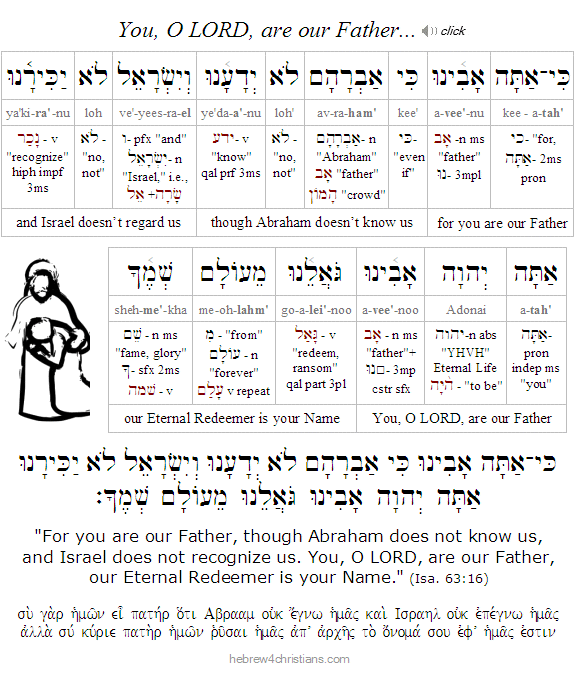 |
The Divine Encounter...

02.26.25 (Shevat 28, 5785) In our Torah reading for this week (i.e., parashat Terumah) the Lord told Moses to construct the Mishkan (or "tabernacle") exactly according to the pattern he was shown during his revelation on Mount Sinai (Exod. 25:40). At the inmost center of this Tabernacle -- the place of utmost holiness -- the Ark of the Covenant (אֲרוֹן־הַקּדֶשׁ) was placed, a "three-in-one" box that held the tablets of the covenant. The Ark served as a symbol of kisei ha-kavod (כִּסֵּא הַכָּבוֹד), the Throne of Glory, since it stood entirely apart as the only furnishing in the Holy of Holies (קדֶשׁ הַקֳּדָשִׁים). Upon the cover of the Ark (i.e., the kapporet) were fashioned two cherubim (i.e., angel-like figures) that faced one another (Exod. 25:17-18). According to the Talmud (Succah 5b), each cherub had the face of a child - one boy and one girl - and their wings spread heavenward as their eyes gazed upon the cover (Exod. 25:20). It was here - in the midst of sacred innocence, humility, purity, and hope - that the sacrificial blood was offered to make atonement for our sins, and it was here where God's Voice would be heard (Exod. 25:22; Num. 7:89).
The allusion of two innocent children's faces peering before the Throne of God gives fresh meaning to the statement that unless you "turn and become like children, you will never enter the kingdom of heaven" (Matt. 18:1-3). The most important things of life are only known through love, and so-called knowledge apart from love is actually nothing (1 Cor. 13:2). Knowledge "puffs up" (φυσιόω), that is, it swells and feeds the ego and its posture before others, whereas love "builds up" (οἰκοδομέω), that is, it is other-focused and seeks to create a sense of habitation and a place of safety. "If anyone imagines that he knows something, he does not yet know as he ought to know; but if anyone loves God, he is known by Him" (1 Cor. 8:2-3). May God help us shine his love as His dear children...
Love is the reason we turn to God; it is the basis for teshuvah: "We love Him because He first loved us." We answer God's love by turning to Him.... that is the very first step. We must first receive hope into our hearts and that starts us on our way.
Hebrew Lesson
Jeremiah 31:33b reading (click for audio):
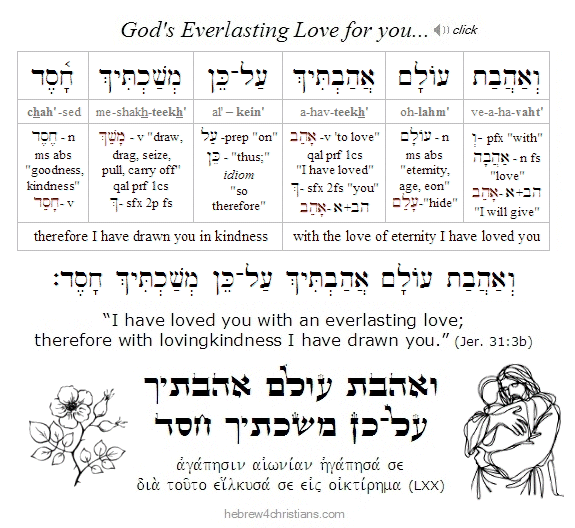 |
Shadows and Substance...

02.25.25 (Shevat 27, 5785) Our Torah portion this week (Terumah) reveals that the Mishkan (or "Tabernacle") was designed to provide an elaborate "parable" or "pattern" (i.e., tavnit: תַּבְנִית) that points to the salvation of our God (יְשׁוּעַת אֱלהֵינוּ). The Mishkan (as a whole) was intended to designate a central and sacred place (מִקְדָּשׁ) symbolizing the Divine Presence, with the tribes carefully arrayed on each side (east, west, north, and south, in cruciform), and the four families of the Levites arrayed on each side of the courtyard (Num. 2). The gate opened from the east, where the tribe of Judah was positioned (Gen. 49:10) and where the Kohanim (priests) had their camp just outside the court (Heb. 7:14).
The Camp Formation:
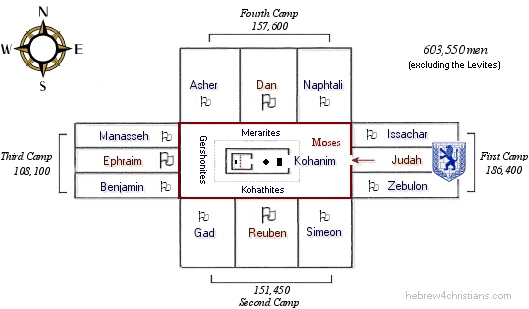 |
As you entered the Mishkan itself, you would immediately behold the mizbe'ach (i.e., copper altar), which revealed the "korban principle," namely, that the only way to draw near to God is by means of sacrificial blood offered for the sinner, as is stated in the Torah, "For the life of the flesh is in the blood, and I have given it for you on the altar to make atonement for your souls, for it is the blood that makes atonement by the life" (Lev. 17:11), and "without the shedding of blood there is no forgiveness of sins" (Heb. 9:22). In this connection note that it is God who gives us the blood for atonement, and indeed the central (and ongoing) sacrifice on the altar was the daily offering of a defect-free male lamb along with unleavened bread and wine called "korban tamid" (קָרְבַּן תָּמִיד).
The Pattern of the Mishkan:
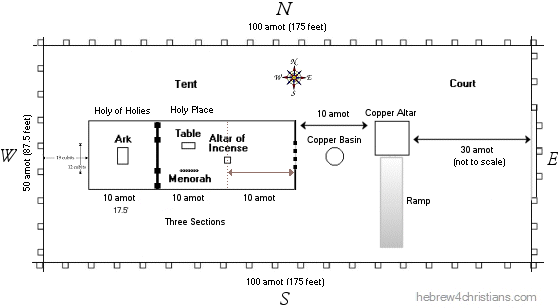 |
The korban tamid commemorates the Lamb of God and the deeper meaning of the Passover, which the LORD called "my Offering, my Bread" (see Num. 28:1-8). Note further that the sacrifice of the lamb upon the altar was openly displayed in the courtyard, just as the cross of Messiah was a public display (John 19:16; Col. 2:14-15), though the atonement for sin was made only after the High Priest sprinkled sacrificial blood upon the covering of the Ark of the Covenant that held the testimony of the law during the Yom Kippur service. Unlike the public sacrifice of the lamb upon the altar, the Yom Kippur ritual pictures the "hidden offering" of the blood before the Throne of God in the holy of holies "made without hands," that is, the greater priesthood of the Messiah who secures an eternal atonement (Heb. 10).
Therefore understand that the Mishkan (and later the Temple) was a provisional pattern designed by God to foretell the Substance and Reality to come, as it is written: "the Word became flesh and tabernacled with us" (John 1:14), and "when our Messiah appeared as the high priest of the good things that have come, He passed through the greater and more perfect Mishkan not made with hands (τῆς μείζονος καὶ τελειοτέρας σκηνῆς οὐ χειροποιήτου), that is, not of this creation, and entered once for all into the most holy place not by the blood of goats and calves but by his own blood, and so he himself secured eternal redemption for us" (Heb. 9:11-12).
Note that the High Priest was required to perform the Yom Kippur avodah (service) alone, while wearing humble attire, divested of his glory, and in complete solitude: "No one may be in the tent of meeting from the time he enters to make atonement in the Holy Place until he comes out" (Lev. 16:17). The Hebrew text literally says, "no adam (אָדָם) shall be in the tent," which suggests that something more than the natural man is needed for divine intercession. And just as Moses alone approached God in the thick clouds at Sinai to receive the revelation of the Altar as mediator of the older covenant (Exod. 24:15), so Yeshua, the Mediator of the New Covenant, went through his severest agony on the cross as the darkness covered the earth (Luke 23:44; Matt. 27:45).
Hebrew Lesson
Exodus 25:40 Hebrew reading:
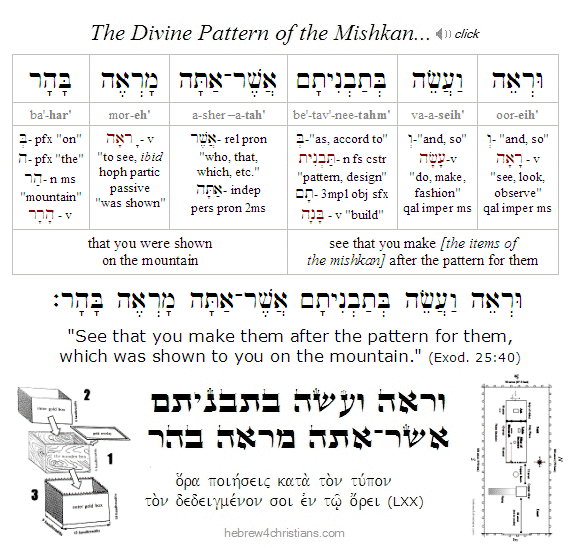 |
Sanctifying God's Name...

02.24.25 (Shevat 26, 5785) Some people who profess faith in God become disillusioned when they experience hardship and trials in their lives. They get offended because they had assumed that God ought to be their ticket to the "good life," that is, to a life of blessing and ongoing prosperity ("your best life now!"). When unexpected misfortune or trouble comes, however, their faith in God is shaken and sometimes breaks down altogether...
This indicates that their faith in God was regarded as a means to the end of personal fulfillment and happiness, and therefore that the Lord was "accepted" only so long as things were going well for them. The focus was not so much on God as it was on the self, as God is primarily regarded as the gift-giver or "servant" of the soul to be made happy...
An idolatrous conception of God is rooted in self-deception... The Lord does not exist for our sake, but on the contrary, we exist for His. Genuine faith is always tested in the "school of suffering," and our education for eternity is the divine curriculum.
Yes, there are sunny days of comfort and beauty along the way of faith, but there are also days of adversity, trouble, disappointment, and grief. Where is God then, in harrowing moments of anguish and desolation? "God did not spare my dying child.. he did not heed my prayers... How can I trust him now?" "Where was God when I was bereft of my innocence, brought low and forsaken? Where was he when I needed him most?" "How long, O LORD, will you forget me, forever? How long will you hide your face from me?"
Such experiences, as painful as they are, nevertheless are part of the plan of God, his "Torah of adversity" that strips away all our illusory hopes, desires, and dreams so that we might know Him as our only true hope. Our various "idols" of the heart and mind must be demolished; our faulty assumptions exposed, and our world turned upside-down. Our hearts must be first made barren and lost, so that we can come to know God in the truth....
"The LORD has given; and the LORD has taken away: may the Name of the LORD be blessed" (Job 1:21). This is the first great lesson of a mature faith: to bow before the LORD God as the Sovereign Power over all and to accept his decrees. We cannot cajole the LORD to do our will; we can offer him no counsel; we cannot manipulate him through flattery, tears, or defiance... Religious rituals do not propitiate his will. God is the all-powerful one before whom we can do nothing but yield ourselves in trust. "Give thanks to God for everything" (1 Thess. 5:18) includes even those things we may not prefer...
We are not the center of things; God is not our servant to make us happy; we owe our existence to Him alone. All we offer him is our need. The first lesson, then, can be understood as the truth that there is indeed a God, and you are not Him.... Understanding these truths opens your eyes to the reality of the LORD, to His great Majesty and Glory, in which everything about you -- your beginning, your middle, and your end, yea, every moment of your life -- is under his sovereign power and overarching providence. And when you internalize these truths, when you esteem them ardently within your heart, you then can pray to the Living God who is over All, the LORD of Glory who upholds and sustains all things by the word of His power.
The way of faith is not easy, even if our hearts are aflame with the truth of God's overmastering brilliance, power, and grace. There remains the ongoing struggle to accept God's will and to trust in Him despite the darkness of our finitude, brokenness, and powerlessness. Asking why the LORD God does he does leads away from childish ideas of "karma" unto the mystery of suffering, to the cross of Messiah, to the sacrifice of love.
At first we may try to justify suffering for the sake of an inscrutably greater good, but ultimately such reasoning is insufficient and we are rendered silent. If we persevere, we begin to hear the Voice of God from the midst of the whirlwind, as God reveals his glory as the sacred center of Reality before whom all things mysteriously revolve.
We are consigned to live under the "dark cloud of unknowing" because God's plans and purposes exceed all our finite comprehension. We are given precious promises, but we see "through a glass darkly" until our redemption is made complete. We do not need -- nor can we supply -- rationalizations for what God does in his universe, though the life of faith believes that his mercy and love pervades everything (Deut. 4:24).
Meanwhile we will suffer in this world; we will be afraid; we will hurt; we will die, and things will often not make sense to us. But our faith is expressed in courage that is willing to accept all things - both the good and the bad -- as part of God's plan. We are given the cup to drink, just as Yeshua was given, and we can surrender to God's will even for the sorrows and sufferings we may experience along the way. Remaining faithful to the LORD in the midst of the ambiguities of life is a kiddush Hashem, that is, a life that sanctifies God's Name.
Hebrew Lesson
Job 1:21b reading (click for audio):
מקדש הלב
Shrine of the Heart...
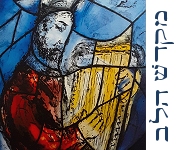
02.24.25 (Shevat 26, 5785) The sages have said that salvation may be likened to spiritual rebirth that delivers us from the "narrow places of Egypt" (i.e., from mitzrayim: -מ, "from," and צַר, "narrow") into newness of life... The first step of lasting deliverance (יְשׁוּעָה) is to receive the great revelation: "I AM the Lord your God," which begins the healing process (Exod. 20:2). We are set free from our bonds to surface appearances when we are made fully conscious of God's Presence, since we then understand everything in holy relationship with Ultimate Reality, the Ground and Source of all life (Acts 17:28).
As is written in our Scriptures: "We look not to the things that are seen but to the things that are unseen: For the things that are seen are transient, but the things that are unseen are eternal" (2 Cor. 4:18). Therefore the Lord says in our Torah portion, "Make for me a sacred place (מִקְדָּשׁ) so I can dwell within you" (Exod. 25:8). Each of us is created to be "mikdash ha'lev" (מקדש הלב) that is, a sacred place for God (1 Cor. 3:16; 1 Cor. 6:19). Making a sanctuary of the heart means choosing to stay connected with reality, attuning the heart to hear the Voice of the Spirit, and consciously walking before the Divine Presence.
Hebrew Lesson
Psalm 16:8 Hebrew reading Lesson
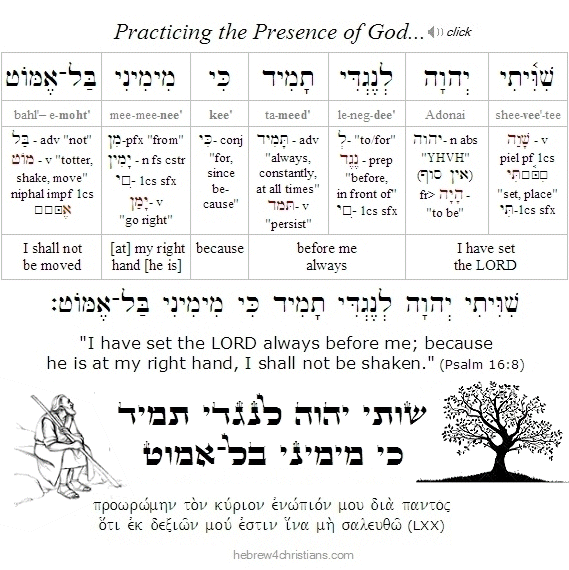 |
The Hebrew word terumah (תּרוּמָה), the name of our Torah portion, means "gift" or "contribution," which first of all refers to the decision to give of our hearts to enshrine God's Presence. We "set the LORD always before us"; we abide in the Vine and remain connected to Him (Psalm 16:8; John 15:5). It two-way partnership: we first believe God's invitation to abide within his heart and live as his beloved child, and then we make a sacred place for Him within our heart as the place of his dwelling (Rev. 3:20).
King David wrote, עוֹלָם חֶסֶד יִבָּנֶה / olam chesed yibaneh: "The (eternal) world is built with love" (Psalm 89:2), and so indeed is God's place within our hearts... We make God lovely and beautiful and wonderful and precious to us; we enshrine him and lift up our souls unto him in adoration and thanks. When we are willing to take part in the building of the sanctuary, God reveals to us "the pattern," that is, the inspiration that evidences His presence in our lives. As Yeshua said, "Let your light so shine" (Matt. 5:16).
 |
The Beauty of the LORD...

02.24.25 (Shevat 26, 5785) The nature of beauty has been an enduring mystery to artists and philosophers over the millennia, and various attempts have been made to define it. For example, some have defined beauty as an order, arrangement, and harmony of some kind (understood either as objective qualities inherent in something beautiful, or as a subjective sentiment of a person experiencing something that is esteemed as beautiful, and most often as a combination of both). In other words, something is regarded as beautiful because it possesses a certain arrangement of qualities or characteristics that evoke pleasure or satisfaction in the mind or heart of a person.
The Scriptures teach us, however, that beauty is part of the very composition of things; the design and form of whatever exists, and that the revelation of beauty attests to the glory of God. Beauty is not simply "in the mind of the beholder," but is objectively real, as part of the very structure of reality. Consider, for example, the flower that blooms, the bird that sings, the star that shines, and the sunset that suffuses the evening skies. "The heavens declare the glory of God, and the firmament proclaims his handiwork; day to day pours out speech, and night to night reveals knowledge" (Psalm 19:1-2).
The beauty of the natural world is grounded in mind of God, since God actively created and designed creation for his purposes and pleasure (see Gen. 1:1, 31; Rev. 4:11). The creation bears witness to the brilliance of the Creator, and the imprint of God's handiwork is evident in the concinnity, order, and marvels of the natural world itself. This is particularly evident in the case of man, who is endowed with a conscience, or an intuitive "moral compass" that discerns the demands of justice and understands right and wrong. The conscience serves as an inner witness that speaks peace, harmony, and goodness when the moral law is observed, and unhappiness, disorder, and evil when it is disregarded or suppressed. As I've mentioned before, the ancient Greek mindset regarded what is beautiful as what is good, whereas the Hebrew mindset regarded what is good as what is beautiful. The difference is one of orientation. Doing our duty before God, obeying "the moral law within," is what is truly beautiful, not merely appreciating symmetry, order, harmony, and so on. Beauty is a type of the good, in other words, and justice expresses the truth of the good in relation to oneself and others. Beauty is also a type of truth, since what is beautiful expresses and reveals truth, whereas what is not truly beautiful expresses what is false. The heart attests to the reality of the Creator and realizes its ontological indebtedness to God (Rom. 1:20).
Theologically, the "beauty of the LORD" (נעם־יהוה) can be understood as the effulgence of God's manifold perfections, everything about his heart and character that evokes ecstatic wonder, solemn awe, and irresistible attraction in his conscious creatures. It is the brightness and loveliness of God, the "charm of his unsurpassed excellence," his perfect justice and infinite compassion for his creation. The LORD is "the Rock, his work is perfect, for all his ways are justice. A God of faithfulness and without iniquity, just and upright is he" (Deut. 32:4). The beauty of the LORD is likened to the purity of Divine Light, the radiance and splendor that is incomprehensibly mysterious and good. The New Testament says "For God, who said "Let light shine out of darkness," is the one who shined in our hearts to give us the light of the glorious knowledge of God in the face of the Messiah" (2 Cor. 4:6). Yeshua is the Divine Light; the Radiance and Beauty of God manifest in the flesh (1 Tim. 3:16). "He is the radiance of the glory of God (הוּא זהַר כְּבוֹדוֹ) and the exact imprint of his nature, who upholds the universe by the word of his power" (נוֹשֵׂא כל בִּדְבַר גְּבוּרָתוֹ; Heb. 1:3). "All things were made by him; and without him was not any thing made that was made" (John 1:3).
So how do we wake up to the beauty of the LORD? How do we come to "see the invisible blessing" that pervades all things? How may we encounter the truth that "the whole world is filled with the irrepressible glory of the LORD" (Isa. 6:3)? .
Frederick Buechner once described a "holy hush" that came over a boisterous crowd of people when they first encountered the giant redwood trees at Redwood National Park. As the people began to take in their surroundings, everything seemed to change - the loud chatter faded; the light, the atmosphere, and especially the awe of being in the presence of these enormous and ancient trees (some of which had been standing since the time of Yeshua), induced a sense of smallness and humility before the glory that surrounded them.
You may have experienced this sort of awe also, perhaps while observing the starry night sky, or while watching the sun set over the mountains or upon the rim of the Grand Canyon, or when witnessing the birth of a baby, or when listening to music that touched your heart and brought tears to your eyes, and so on. Such experiences are sometimes called "self-transcendent," since they move us outside of our ordinary consciousness in an encounter with something great, breathtaking, wonderful, and sublime...
Encountering the glory of the LORD evokes conflicting emotions within the heart, a powerful combination of fear and attraction that is sometimes called the "numinous." The LORD our God is beautiful beyond anything we can imagine, yet were we to directly encounter him we would be so overwhelmed that we would "fall to the ground as one dead" (Rev. 1:17); nonetheless he puts his hand upon us and says, "Don't be afraid; for I am with you." By his gracious touch, then, we are able to look upon the radiance of his presence, to receive the vision of his majesty and transcendent beauty and loveliness. And the amazing thing is that this is what he wants; this is the very desire of his heart, after all, the prayer to the Father that we should behold his glory (see John 17:22-24). And this, I believe, is part of what is meant when it is said that we are made temples of the Holy Spirit (1 Cor. 3:16). " You yourselves are like living stones being built up as a spiritual house, to be a holy priesthood, to offer spiritual sacrifices acceptable to God through Yeshua the Messiah" (1 Pet. 2:5).
This topic relates to our Torah reading for this week, parashat Terumah. As we are drawn by God's grace to love the Lord and to understand how truly beautiful and wonderful and kind he is to us, we will be willing to worship him and celebrate his loving glory. To be alive before God is to be alive to his beauty. Your heart will flutter in joyful excitement to sing: "Give unto the LORD the glory due unto his name; bow down to the LORD in the beauty of holiness" (Psalm 29:2). We sanctify the LORD God within us by affirming his superlative beauty, his infinite goodness, the greatness of his power, the perfections of his justice and truth, his unfathomable kindness, and his unsurpassing and everlasting love. The recognition of the beauty of the LORD is the awareness of his holiness, wherein our heart will esteem his sacred glory as our most precious and extraordinary gift. The beauty of the LORD our God is the heart of love and life and wisdom and truth, the Supreme Being of which no greater can be conceived, for ever and ever. Yehi Shem Adonai Mevorakh. Amen.
Hebrew Lesson
Isaiah 6:3 Hebrew reading:
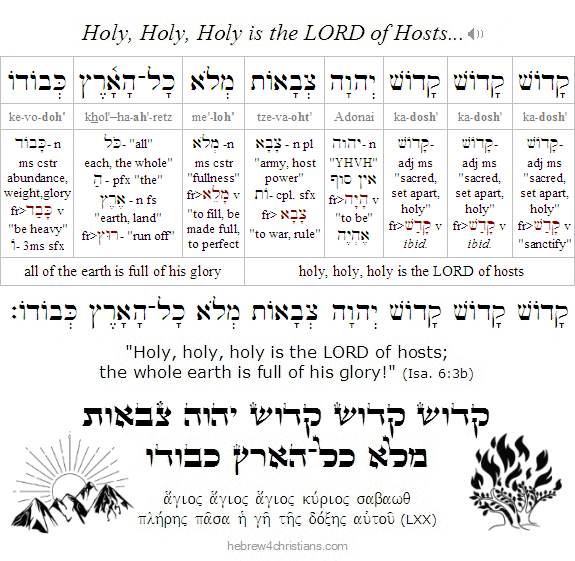 |
Parashat Terumah:
Enshrining God's Presence...

The Kotzker Rebbe said that where we read, "this is my God, and I will praise him, my father's God, and I will exalt Him" (Exod. 15:2), we may be understood this to mean, "this is my God, and I will make a dwelling for Him within me..."
02.23.25 (Shevat 25, 5785) Last week's Torah (i.e., Mishpatim) explained how the Israelites entered into covenant with the LORD at Mount Sinai. The terms of the covenant were written down in Sefer HaBrit ("the Book of the Covenant"), which contained a variety of laws (מִשְׁפָּטִים) to govern the Jewish people in the Promised Land. When the people agreed to obey the terms of the covenant, Moses took sacrificial blood and sprinkled it on them saying, "Behold the blood of the covenant that the LORD has made with you in accordance with all these words" (Heb. 9:18). Moses then re-ascended the mount to receive the tablets of stone inscribed with the Ten Commandments and to learn additional Torah from the LORD.
Now the goal of the Sinai revelation was not only the giving of the Ten Commandments to the Israelites but more importantly enshrining the Divine Presence within their hearts... Therefore in our Torah portion for this week (i.e., parashat Terumah), we read how God asked the people to offer "gifts from the heart" to create a "place" for Him: "Let them make for me a holy place that I may dwell in their midst" (Exod. 25:8). The Hebrew word for "holy place"is mikdash (מִקְדָּשׁ), which comes from the root word kadash (קָדַשׁ), "to be set apart as sacred." A mikdash is therefore a "set apart space," or a "holy place" that represents something profoundly treasured - a place of beauty and worship, a refuge, a place of rest. Other words that share this root idea include kedushah (holiness), kiddushin (betrothal), kaddish (sanctification), kiddush (marking sacred time), and so on. When God said, "Let them make for me a mikdash," then, he was inviting the people to make a symbolic sacred place for His Presence to be manifest, the Holy of Holies representing God's Throne...
The LORD then showed Moses the three-in-one pattern (i.e., tavnit: תַּבְנִית) according to which the sacred place of the mikdash was to be surrounded by a mishkan (מִשְׁכָּן), or a tent-like dwelling place set apart for the Divine Presence. First an ark of acacia wood was to be overlaid with pure gold inside and out. The ark was to be fitted with gold rings and gold covered poles to make it portable. The two tablets of the law were to be stored inside the ark. Two cherubim (angel-like figures) were to placed facing each other over a cover of the ark called the kapporet (i.e., "Mercy Seat"). The ark was to be housed within an inner chamber of the tent called the Holy of Holies. Adjacent to the Holy of Holies was a second chamber called the Holy Place. This chamber would contain a table overlaid with pure gold that held twelve loaves of bread along with a golden, seven-branched menorah. The Holy of Holies was separated from the Holy Place by an ornamental veil called the parochet before which a golden altar of incense would be placed.
The various "materials" required to make the mishkan (and mikdash), namely, the gold, silver, brass, red and purple yarns, fine linens, oils, spices, precious stones, and so on, were to be supplied from the people by means of free-will offerings given to honor the LORD. Collectively these offerings were referred to as terumot (תְּרוּמוֹת), meaning consecrated "donations" or "contributions" (from the verb רוּם meaning to raise or lift up) though later the word generally referred to various tithes given to the priests.
Hebrew Lesson
Exodus 25:2a Hebrew reading:
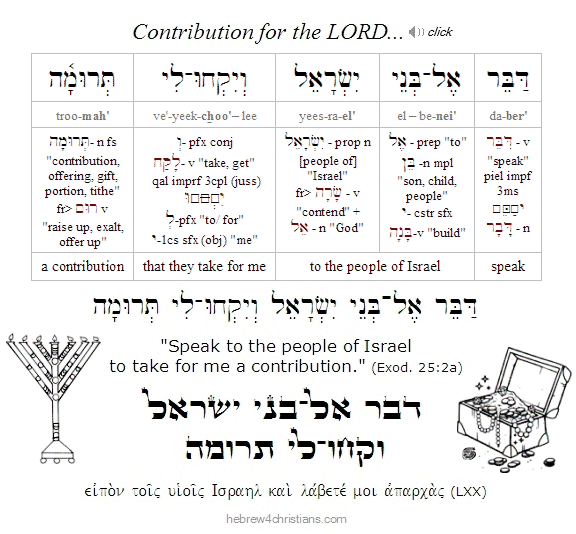 |
The LORD then described the pattern of the tent of the Tabernacle (i.e., ohel: אֹהֶל) along with its exact dimensions. The tent was designed to be portable, with a wooden frame covered by richly colored fabric and the hide of rams and goats. The outer court was to include an altar with horns of copper at each corner. The portion ends with a description of the outer court, which was to be entirely enclosed by an ornamental fence made with fine linen on silver poles with hooks of silver and sockets of brass.
Tripartite Structure of the Mishkan
Love's Promised Healing...

02.21.25 (Shevat 23, 5785) In his famous "Sermon on the Mount," Yeshua revealed the inner condition of the heart, despite the various pretenses that people may contrive to evade the truth.... "You have heard that it was said, "Do no murder," but I say to you, harbor no anger; you have heard "do no adultery," but I say to you harbor no lust..." You have heard it said, "Do not break an oath," but I say to you swear no oath at all, but let your word be enough.
Yeshua brings the Torah inside, to the heart, to reveal our great need. A person who makes an oath assumes he can keep the law, that he can control the impulses and sickness of his own deceptive heart. That is the source of the problem (Jer. 17:9; Eccl. 9:3; Mark 7:21). The Lord reveals what we are inside so that we may realize our need for deliverance from ourselves. What we really need is a miracle on the order of splitting the sea or raising the dead, namely, a new heart (לֵב חָדָשׁ) and a new spirit (רוּחַ חֲדָשָׁה) put within us. For those of you who might struggle with pride, fear, anger, lust, and hardness of heart, please take hold of hope. God can turn "stone to flesh" and make you fully alive by His power.
The heart (lev) is the inner person, the seat of the emotions, thought, and will. A new heart (lev chadash) represents the transformation of the whole of your inner nature - with the impartation of new appetites, new passions, new desires, etc. (Psalm 51:10). A new spirit (ruach chadashah) implies the renewal of your inner life – the rebirth of your will. This is the "law of the Spirit" (תוֹרַת רוּחַ הַחַיִּים) and the new principle of eternal life (Rom. 8:2).
The "stony heart" (lev ha'even) represents unfeeling, self-serving numbness of being. This heart is the locus of yetzer hara, the inner selfish impulse that is the common heritage of the "natural man." The Targum renders this as, "I will break the heart of the wicked, which is hard as a stone.'' A hard heart has a form of "sclerosis" that makes it closed off and impermeable to love from others, and especially from God. Scripture uses various images to picture this condition, including a "heart of stone" (Ezek. 36:26, Zech. 7:12), an "uncircumcised heart" (Jer. 9:26), a "stiff neck" (Deut. 31:27), and so on. Stubbornness is really a form of idolatry, an exaltation of self-will that refuses to surrender to God.
The heart of flesh (lev basar) represents an inner life of genuine feeling and joy that makes a fit habitation for the radiance of the Divine Presence. After all, the word for "grace" (χάρις) is directly linked to the word for "joy" (χαρά). This heart is soft and tender - a spiritual and sanctified heart - that is submissive to the will of God. It is upon the inner "tablets" of this heart that the Torah of God truly written (Jer. 31:33).
There aren't two gospel messages: one for the sinner and the other for the saint... The message of the gospel is always "good news" to those who are sin-sick and riddled with guilt and shame, and it is always "bad news" for those who deny their inner condition before God and believe that they can justify themselves. In other words, there's no "gospel" message apart from the message of the cross of Yeshua, and the cross represents the end of the ego and its devices. We don't get saved in order to follow the path of self-righteousness; we get saved to be witnesses of God's righteousness... We love God because He first loved us (1 John 4:19).
May it please God to give us all soft hearts and renewed spirits that are empowered to love in the truth and to walk before His Presence... May He perform a divine "heart transplant" so that we may feel the heartbeat of the Spirit within us. Amen.
Hebrew Lesson
Ezekiel 36:26 reading (click for audio):
The Torah of Mercy...
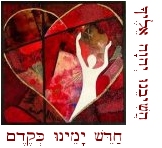
"What you must do is love your neighbor as yourself. There is no one who knows your many faults better than you! But you love yourself notwithstanding. And so you must love your neighbor, no matter how many faults you see in him." - Martin Buber
02.21.25 (Shevat 23, 5785) It has been said that grace is getting what you don't deserve, whereas mercy is not getting what you do... Yeshua said, "Blessed are the merciful, for they shall receive mercy" (Matt. 5:7). This is not a reciprocal law like karma, i.e., you get in return what you first give, since we cannot obtain God's mercy as reward for our own supposed merit (Rom. 4:4). No, we are able to extend mercy to others only when we are made merciful ("full of mercy"), that is, when we first receive mercy as the gift of God (Eph. 2:8; Rom. 5:15). After all, you can't give away what you don't have, and if we have no mercy for others, it is likely that we have not received it ourselves, as the parable of the Good Samaritan reveals (Luke 10:25-8). Your forgiveness is your forgiveness, that is, as you forgive, so you reveal your heart. What you do comes from what you are, not the other way around. We are first changed by God's grace and then flow works of love. We judge others mercifully, with the "good eye," because we come to believe that we are beloved by God.
When Yeshua rebuked the "holier-than-thou" attitude of some people, he said: "Go and learn what this means, 'I desire mercy, and not sacrifice.' For I came not to call the righteous, but sinners" (Matt. 9:13). The pattern therefore abides: First you realize you are broken, impoverished of heart, and you mourn over your sinful condition (Matt. 5:3-4); then you hunger and thirst for God's righteousness, that is, for his healing and deliverance, and finally you learn to trust the mercy of God, that is, you come to accept that you are accepted despite your unacceptability (Matt. 5:5-6). As you begin "suffer yourself" and forgive your own evil, you are enabled to extend this mercy to others (Matt. 5:7). In this way you begin to see God in your relationships and obey the heart of truth (Matt. 5:8; 1 Sam. 15:22).
Though we love and honor truth, we must be careful never to use it as a weapon to judge or wound others (including ourselves). The failure to extend mercy, to demand your "rights" or hold on to grudges, implies that you are relating to God as Judge rather than as Savior (James 2:13). If we condemn what we see in others, we have yet to truly see what is within our own hearts; we have yet to see our desperate need for God's mercy for our lives. If you don't own your own sin, your sin will own you. Being merciful is a response to God's love and therefore is essential to genuine teshuvah (repentance). Walking in love is the deepest expression of truth, since love heals untruth and embraces hope for what is presently broken (1 Cor. 13:7). In light of this, take a moment to ask the LORD to help you relinquish the pain of your past by being full of mercy toward yourself and others. Honor God's love for you by forgiving yourself and showing compassion and mercy to others in your life...
Hebrew Lesson
Hosea 6:6 Hebrew reading (click):
Personal Note: I've been experiencing a lot of "spiritual warfare" over here, inner wrestling and suffering to express something I am searching God's heart about... Please keep me in your prayers friends. Thank you and Shabbat shalom to you all.
What Matters Most...
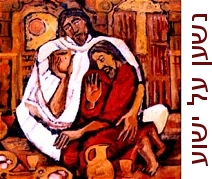
There is nothing more important, relatively speaking, than your relationship with God. It is the most important thing in your life, a matter of "ultimate concern."
02.20.25 (Shevat 22, 5785) Some people are presented with a false message of the gospel when they are asked to "accept Jesus" into their heart because the benefits are so good. Yeshua is depicted as an earnest Savior who is begging others to believe in him so that they can receive God's blessing. Unscrupulous "evangelists" often spice up the sales pitch: "If you come to Jesus and accept him as your Savior, you will be on easy street! You'll have your best life now - prosperity, health, money - and at the end of the rainbow you will live in an exclusive mansion and walk upon streets of purest gold! You will eat platefuls of heavenly pottage for your feasts and there will be nothing but happiness for your and your loved ones forever! So please, I beseech you, come to Jesus and let him show you how good he is! It's an offer you simply cannot refuse! Let him help you fulfill all your dreams!
God forbid such thinking... This is not the gospel. Yeshua was not about selling soap or offering "fools gold." Instead he spoke about finding a life that truly mattered, seeking first the truth of reality, and gaining "heavenly gold" that is refined by fire, tested and pure...
It takes "ears to hear," a heart awake to what matters... The true gospel message finds audience with those who are desperate over their lives, those who cannot escape their sorrows, and who therefore understand their terrible need for deliverance from themselves. "Blessed are the poor in spirit; blessed are those who mourn, blessed are the nobodies, blessed are those who hunger and thirst for God's righteousness, and so on. You will hear the Spirit call out, "Come to me, all you who labor and are heavy laden, and I will give you rest," only when your heart is heavy and you rare exhausted over dealing with yourself...
When we "accept" Yeshua as our Lord, we are not doing him some sort of favor, but instead we are confessing that he alone is our healer, our deliverer, and our Savior, and that there is no other Savior than him. We are confessing his favor, his grace, his mercy is what matters most of all. "Whom have I in heaven, but You? And there is nothing on earth I desire beside you..." Being in a right relationship with God, which is what salvation really is about, is a matter of life and death. It is not "pie in the sky when you die by and by," but your daily bread, your deepest hope, your ongoing need for God.
We are saved by trusting God's redemption given in Yeshua. But this is not something abstract or general but intensely personal. It goes down to our inner secrets, it cuts into the "joints and the marrow" of our lives, if finds the "edge" of where the soul meets the spirit (Heb. 4:12). We trust in our "kishkes," our guts, and from our "pupik," our belly button.
And while the way of the Lord is precious to us, it's not an "easy acceptance" or a matter of "easy believism." It's not the popular way of the crowd. It is not the way of pleasures or cheap thrills. No, as Yeshua said "narrow is the gate and difficult is the way which leads to life, and there are few who find it." The word "difficult" here means "hard pressed" or squeezed like grapes, in other words (and from the perspective of the grape) afflicted and troubled. The Apostle Paul affirmed this by teaching that it is through many tribulations that we enter into the kingdom of God (Acts 14:22). The danger of "easy believism" is that it is quite ready to "accept" all the sweetness and light of the gospel but it gets offended when there are bitter times of darkness. The story of Job teaches us to trust God when he gives and when he takes away, when things are going well, and when things fall apart... The way to enter into life is the "road less traveled," the narrow way, the way of humility.
It is written that the day of one's death is better than the day of one's birth. This is not a nihilistic statement of despair but one of sober hope. We aren't simply "introduced" to Jesus and acquiesce or "accept" that he is the Savior and then go about our daily lives as if other things are more important. We don't make a split decision that "probably" Jesus is real, offer up a little precautionary prayer to ask him to come into our hearts, and then gad about our business, perhaps mentally putting Jesus up on the mantle as an icon we may venerate. No, in Jewish thinking the day of your death is the summary of the meaning of your life, it's goal, so to speak. It is only after your death you will know who you really were in this life...
How were the Israelites saved in Egypt? They applied the blood to the door posts and the Angel of death passed them by. They believed God would do the saving work. They stayed awake through the night, ready to go, shoes on their feet, staff in their hands, ready to be go out under the outstretched arms of God. And later they crossed the sea, leaving their former lives behind, making their way to Sinai to learn the ways of the Lord.
Or how was the "prodigal son" brought to his senses? Was it because some evangelist came and told him that his father was willing to "forgive and forget" if only he would come back home? No, he was first broken and made to confess his lost estate; he had to be worn out by hunger and degradation. Only then did he "come to himself" and decide to go to his father. As he left the pig farm to make the journey, he rehearsed the truth of how he had sinned and how desperately he needed to be restored to his father...
Being in a relationship with God is revolutionary and transformative. It changes everything. You become a "new creation" with a profound longing to know God and to walk in his light. It's like being head over heels in love with someone. You can't stop thinking about them. You want to be with them all the time. You dream of them, you are excited about your future with them, and so on. So it is with a genuine follower of Yeshua. More than anything you want to know him and be connected with him. But being a "lukewarm" or "jaded" believer is a contradiction in terms, like being an indifferent lover. To paraphrase Hudson Taylor, Yeshua is either the Lord of all or he is not the Lord at all...
Why did Yeshua want to "vomit" out of his mouth the self-satisfied and opulent believers of Laodicea? Because we can only truly know him b'khol libeinu, with all of our hearts. Yeshua is the center of the life of a true disciple. No other relationship, no matter how important, is of higher priority. "If anyone comes to me but does not hate his own father and mother and wife and children and brothers and sisters, yes, and even his own life, he cannot be my disciple. Whoever does not bear his own cross and come after me cannot be my disciple" (Luke 14:26-27). Was Yeshua being "hyperbolic" here, or was he soberly warning us that we cannot know true love apart from him?
Let me end this brief message by encouraging you to pray and to implore the Lord to impart or to rekindle the depths of his passion and love within your heart... If you are struggling to sense his call, confess the truth and rejoice over your poverty of spirit, your mourning, and your terribly great need for him. Then ask him for the inner witness of his personal love for you and to fill your heart with the blessing to love him above all other things.
To quote the apostle Paul: "May God grant you to be made strong with power by his Spirit in your inner soul, so that Yeshua may dwell in your hearts through faith, and that you, being rooted and grounded in his love, may be able to receive with all the saints what is the breadth and length and height and depth of the love of Messiah that surpasses knowledge, and that you will be filled with all the fullness of God." Amen.
Hebrew Lesson
Psalm 73:25 (click for audio):
With your whole Heart...

God often sends us trials (ניסוים) so that we might turn to Him for help... As the sages have wisely said, "The main purpose of tefilah (i.e., תְפִלָה, prayer) is not to get us out of problems. The purpose of problems is to get us into tefilah." Indeed one of the worst things that can happen to a soul is to be forgotten by God, to be "let go" and no longer tested...
02.20.25 (Shevat 22, 5785) In our Torah portion for this week (i.e., parashat Mishpatim) we read, "Keep yourselves away from a false matter" (Exod. 23:7). In this connection note that the Hebrew word for falsehood (or lie) is sheker (שֶׁקֶר), which can be rearranged to spell kesher (קֶשֶׁר), meaning a band, gang, or group of people... The power of the lie is often found in the "group" rather than in the individual, and if enough people in a group repeat something untrue, eventually the individual's conscience will be overruled and the truth will be lost... This is a common methodology regularly employed by mass media for purposes of social engineering and political propaganda.
Regarding this commandment Abraham Twerski comments that it means we should act in a way that will not move us to "hide," and that includes hiding within the anonymity of the crowd. "Think about what you are about to do. Is there a possibility that you may at some time have to deny that you did it? If so, then do not do it" (Twerski on Chumash).
Each of us must individually strive to be yashar (יָשָׁר) - upright and honest - free from the complications and devious speech that attends to lies. We are to be "simple" (תָּמִים) with the LORD our God (Deut. 18:13), which requires that we are first willing to be rigorously honest with ourselves. "No person is saved except by grace; but there is one sin that makes grace impossible, and that is dishonesty; and there is one thing God must forever and unconditionally require, and that is honesty" (Soren Kierkegaard).
In this connection we note that the midrash teaches that the Hebrew word for "truth" (i.e., emet: אֱמֶת) is composed of the first, near-middle, and last letters of the alphabet, whereas the three letters that spell "falsehood" (i.e., sheker: שֶׁקֶר) all stand next to one another. The sages say this suggests that truth creates a firm foundation, secure, strong, and trustworthy, while falsehood is unstable. As it is written, "truth stands forever, falsehood has no legs." In other words, the way of truth is "self-authenticating" and made secure, whereas the way of falsehood is "unlivewithable" and made unsteady...
Hebrew Lesson
Deut. 18:13 Hebrew reading:
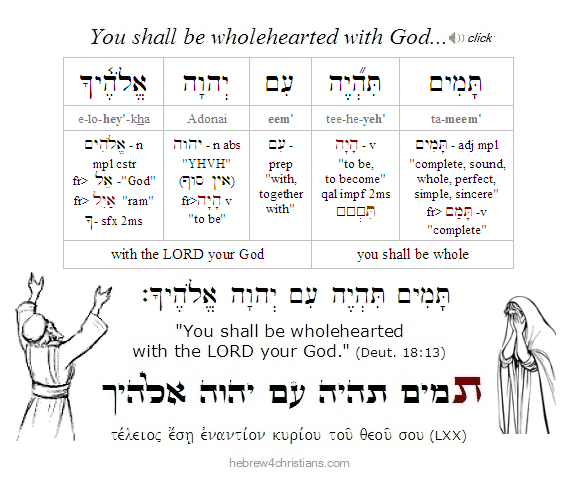 |
Trust and Understanding...

02.20.25 (Shevat 22, 5785) Most of us have read the great admonition: "Trust in the LORD with all your heart, and do not rely on your own understanding" (Prov. 3:5). But note the contrast between trusting and understanding in this verse.
Trust is a matter of heart, the decision to let go, whereas understanding is analytical, "objective," a matter of physical seeing. Human reason may help you discern the "what" of faith, but it is powerless to waken the soul, to breath life into heart, and to impart passion to seek God's Presence as your greatest need and your utmost good. That only comes through the sober awareness of your own sinful condition, the inner conviction that you are utterly undone and without hope apart from the intervention of God in your life, and the will to believe in the miracle...
בטח אל־יהוה בכל־לבך
ואל־בינתך אל־תשׁען

"Trust in the LORD with all your heart
and do not rely on your own understanding"
(Prov. 3:5)

Most commandments do not test how we comprehend our faith as much as they test the surrender of our heart. The test of faith requires bittachon (בִּטָּחוֹן) - that is, abandoning our need to understand so that we can hold fast to God's promise and blessing... "Fear not, for I am with you..." (Isa. 41:10). That's what we need most, to trust that we are safe in God's love, and that's the ultimate message of our atonement in Messiah.
You shall be holy to Me...
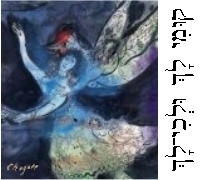
[ The following is related to this week's Torah reading (Mishpatim). ]
02.19.25 (Shevat 21, 5785) "You shall be holy to me" (Exod. 19:6; 22:31). That is, you shall be "set apart" to know and live in God's love; you shall dwell in the secret place of the Most High, a place prepared especially for you (Psalm 91:1; John 14:2).
Properly understood, holiness (קְדֻשָּׁה) expresses the realm of being loved, cared for, and watched over. It is an intimacy that is exclusively hallowed and made sacred. God calls you to his closed off chamber, the "holy of holies" where He dwells; there he invites you in, he welcomes you, he desires to see you (Heb. 4:16).
The deeper meaning of holiness is to be spiritually intimate with God. Hence the Spirit of Holiness uses romantic and even sexual imagery in the Song of Songs to express the deepest yearnings we have for connection with God...
Hebrew Lesson
Lev. 11:45b Hebrew reading:
The Work of Faith...
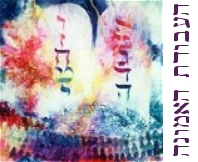
02.19.25 (Shevat 21, 5785) In our Torah portion for this week (i.e., parashat Mishpatim) we read that when the people gathered before Moses to receive the covenant, they said in unison: "All that the LORD has spoken we will do and we will hear (נַעֲשֶׂה וְנִשְׁמָע)." Note the order: first comes the decision to obey, and then comes understanding... As Yeshua said, "If anyone's will is to do God's will, he will know," and "if you know these things, blessed are you if you do them" (John 7:17; 13:17).
The heart of faith is willing to do what God asks before hearing what exactly is required. Many people operate the other way round, sitting in judgment of God's word, demanding to understand why they should obey. You cannot understand the Lord apart from trust, however, and that is categorically true of all forms of knowledge.
We are to be "doers of the word and not hearers only, deceiving ourselves" (James 1:22). We don't audit the words of Scripture since we ourselves are under examination! The Scriptures demand us to respond, choose, decide. The word is like a shofar blast rousing us to action. We are to be doers, not just passive hearers. The Greek verb is emphatic: "Be doers!" (γίνεσθε) means "be born! come alive! do, live, exist before God! This is a call to creative action, to newness of life!
The Scriptures state that "if anyone is a hearer of the word and not a doer, he is like a man who looks intently at his natural face in a mirror. For he looks at himself and goes away and at once forgets what he was like" (James 1:23-24). If we just hear the truth but do not act upon it, we are likened to someone who carefully looks at his face in a mirror but then promptly forgets what he looks like after he steps away... Likewise those who only hear the word but do not bring it to life in their deeds forget who they are and why they were created (Eph. 2:10; Titus 2:14; Col. 1:10). When we look into the mirror of truth we see our need for teshuvah and turn to God for the healing miracle he provides (Heb. 4:12).
There is a deeper law, however, a "mirror" that reveals something beyond our passing image. When we look intently into the "perfect law of liberty" (תּוֹרַת הַחֵרוּת וּמַחֲזִיק) - the law of faith, hope, and love for our Savior - we find blessing in our deeds (James 1:25). Note that the verb translated "look into" the law of liberty is the same used when John stooped down to "look inside" the empty tomb of Yeshua (John 20:5). The deeper law reveals the resurrection power of God's invincible love. The Torah of the New Covenant also has many mitzvot, though these are based on the love God gives to us in Yeshua: "This is my Torah: that you love one another as I have loved you" (John 13:34).
We are set free from the verdict of the law to serve God without fear, on the basis of his saving love and grace given in Yeshua (Gal. 5:1), but our freedom is not meant to violate the Ten Commandments or to engage in licentiousness (Gal. 5:13; Matt. 7:21). The moral law speaks, as it were, to young children who need a guardian until they can attain to their place as hiers (Gal. 3:24). Mature sons and daughters do not not need the law but operate on a different level, and enjoy a different relationship with the Master of the house. Serving God this way results in holy passion. The verse, "the appearance (i.e., mareh: מַרְאֵה) of God's glory was like a consuming fire" (Exod. 24:17) may be read, "the mirror (or reflection) of God's glory..." When we act as God's children, full of faith in his love, and walking before the power of his presence, our hearts reflect his passion, too.
As a brief excursus, let me ask how you can "do the word" and live in harmony with the divine commandments... The dividing line between faith and works is often difficult to discern, after all, and indeed Yeshua told us that faith in Him is itself a type of "work" (John 6:29). Studying the Scriptures, praying, trusting God in the midst of our pains and struggles, and worshiping are all in a sense "works," yet they express the inner reality of faith....
Here is the conundrum: Do we "do the word" by means of our own resolution (i.e., will) to act, or is a deeper miracle of transformation first necessary? If the latter, is the miracle entirely sufficient, or do we need to add something else for it to come into being? The Scriptures command us to be "slow to anger" and "put away wrath," and yet how is that possible apart from God's help, after all? How can we manage destructive emotions that sometimes arise within the heart? How do we "put away" fear? On the other hand, how can we be commanded to love? to be joyful? full of faith?
These considerations reveal the divine-human partnership: We "work out our own salvation with fear and trembling, for it is God who works in you, both to will and to work for his good pleasure" (Phil. 2:12-13). In the end we are faced with paradox: We are utterly dependent upon God to work within our hearts for salvation, yet we are also entirely responsible for working out that salvation in our daily lives (Isa. 26:12). "With man this is impossible, but with God all things are possible" (Mark 10:27).
Hebrew Lesson
Deut. 6:18a reading (click for audio):
We feel this tension throughout the Scriptures. For instance, we read: "For the grace of God that brings salvation (הוֹפִיעַ חֶסֶד אֱלֹהִים לְהוֹשִׁיַ) has appeared to all men, teaching us that, denying ungodliness and worldly lusts, we should live soberly, righteously and godly (בְּצֶדֶק וּבַחֲסִידוּת) in the present age, looking for the blessed hope and glorious appearing of our great God and Savior Yeshua the Messiah (כְּבוֹד אֱלֹהֵינוּ הַגָּדוֹל וּמוֹשִׁיעֵנוּ יֵשׁוּעַ הַמָּשִׁיחַ), who gave Himself for us, that He might redeem us from every lawless deed and purify for Himself His own special people (עַם סְגֻלָּה), zealous for good works" (Titus 2:11-14).
The "Torah of grace" (תורת חסד) teaches us to deny ungodliness and worldly lusts and to live soberly, righteously, and godly in the days of our sojourn, as we look for our blessed hope - the glorious appearance of the great God and our Savior Yeshua the Messiah, who has redeemed us from all lawlessness (ἀνομία) to purify for himself a "chosen people" (λαὸν περιούσιον), zealous of good works... Note here that the grace of God is manifested in the exercise of our good works (i.e., ma'asim tovim: מעשים טובים), and that a little later Paul wrote: "This is a faithful saying, and these things I want you to affirm constantly, that those who have believed in God should be careful to maintain good works" (Titus 3:8). Amen, "For we are His workmanship, created in Yeshua the Messiah for good works, which God has before ordained that we should walk in them" (Eph. 2:10).
"Work out your own salvation with fear and trembling, for it is God who works in you both to will and to do his good pleasure" (Phil. 2:12-13). So let us be careful to "work out" what God has "worked in" to our hearts by letting our light so shine that God receives the glory from what we do with our lives (Matt. 5:16). Amen.
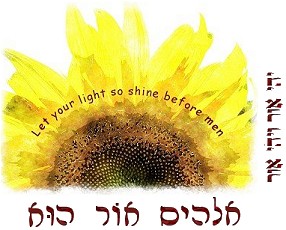 |
 |
The Way of the Disciple...
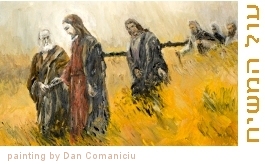
02.18.25 (Shevat 20, 5785) It is common for people today to think that the words of Scripture are "malleable," that is, able to be manipulated and interpreted in various and different ways, and therefore they insist that we must consider how our present cultural and personal experiences affect the way we are reading and thinking about the Scriptures... Moreover, since Yeshua's words are likewise "elastic," we ought to be tolerant and open-minded regarding different ways of understanding what he may have meant, even if these interpretations seem contrary to our assumptions...
Now this "reader-centric" hermeneutic, as it might be called, makes the hearer (or reader) the judge of what is meanful "to them," rather than attempting to truly understand the original intent of the speaker... The problem with this approach is the skepticism it engenders, for it assumes either that we are unable to transcend our limitations to know the source message or it is a matter of indifference, but in either case the original meaning is not as important as how the reader chooses to "translate" the message in his or her own words. The truth of the Bible therefore is relative to how each person understands it...
Of course we should "follow peace" with all people, but that doesn't mean we should undergo a "theological lobotomy" by doubting that true interpretation is possible. We can't become "semantic nihilists" because language is grounded in the consensus of historical usage, and denying the shared (and public) meaning of words will lead you to the prison of a "private language" and solipsism (i.e., the idea that only your private self can be known). We should exercise empathy when listening to others, but we should not so open our minds that we lack any filter for truth. "Peace" sometimes means having the courage to disagree with others, especially when it comes to matters of ultimate concern.
When Yeshua said that he alone is the way to relate to God, for instance, and that he was God's eternal spokesperson -- the One who was from the beginning and who upholds all things by the word of his power -- he didn't invite hairsplitting over the meaning of his words. Nor did he encourage his listeners to quibble or interpret what he was saying in light of their present circumstances. On the contrary, he boldly said he was the truth of God manifest and that our response was to receive that truth by recognizing his authority.
There is something more basic than human reason that is definitive, and that is the will, or rather what the heart chooses to believe. Reason provides the way of establishing right relationships and logical order between our beliefs, but it is not the final authority. Logic is a matter of formality, but truth is gained by apprehension and revelation. Truth is something encountered and then reason may be employed to interpret its significance and relation to other things. We do not need to first understand in other to believe, but the other way around: we come to believe and then reason negotiates the implications of our faith.
Of course after we decide to believe something, there are further questions that may be asked about it, and the urgency of these questions will correspond with the relative significance of what is believed, so that, for instance, believing (or encountering) Yeshua will lead to "faith seeking understanding" that affects the entire soul, since the subject matter is of ultimate concern... The decision to believe in Yeshua is the first step of the walk with God.
The genuine disciple of Yeshua will read the Scriptures to test the heart, to convict of sin, and to present the counsel of divine light. The Holy Spirit quickens the heart to discern truth and guides the believer on the path. The "dialog" of the heart with God is an ongoing commitment, a life and death relationship with the Lord that is "bekhol levavkha," with all your being...
Consider the person who turns to God for "accidental" reasons, however, perhaps from emotional impulse or for selfish concern. He may have been easily "converted" and may be quite "upbeat" and sunny about the way of faith. Such an "enthusiast follower" may be attracted to what Jesus can do for him, or he may be impressed with the music, liturgy, and other "signs and wonders." He may also be looking to emend or improve the quality of his life, to reach his personal goals, or to experience a sense of belonging in a community. Whatever the motive, if things don't go as hoped, however, this person may become disillusioned, jaded, and eventually turn away from the faith.
The way of true discipleship, however, accepts that "it is through much tribulation that we enter into the kingdom of God" and the disciple is therefore willing to persevere despite present sorrows. God knows the beginning from the end, but we are "somewhere in the middle..." We are told to "count it all joy" when we are tested and undergo trials, for this forms steadfast faith, and God invites us to ask for wisdom to endure our journey.
"Enthusiast followers" may also be excited about certain charismatic teachers they hear about. These usually are attractive and self-assured people, exuding a sense of success or "victory" over the tedium of everyday life. They are "winners" more than "sinners" for Jesus, and they aim to share the secrets that will make you a winner too. Their ministry often draws large crowds by promising them that they can enjoy their "best life now" rather than teaching them to deny themselves, to take up their cross, and to surrender everything to God. There is nothing intrinsically wrong about having a charismatic personality, of course, but serving up false expectations is a dangerous business, especially when it comes to the care of the soul.
Was Yeshua a "charismatic" person? Well people were irresistibly drawn to him, but their motives were mixed and many regarded him with suspicion and scorn. He apparently was not especially good looking, nor was there a "regal air" about him that evoked honor (Isa. 53:2). He was an obscure person, a man of no reputation, without family connections in Israel that would set him apart. The disciples were draw to him because they believed the message of John and God had quickened their hearts. The leadership of Israel disparaged his message however, and "followed" him simply to keep an eye on a potential enemy of the establishment. The common people of Israel generally regarded him as a miracle worker, perhaps a prophet, though others regarded him as a curiosity or "circus attraction." But there was no "halo" effect surrounding him. He didn't shine with worldly glitter or have a dazzling smile that melted people's hearts. When he was later betrayed, Judas Iscariot had to identify him with a special greeting so that the Roman soldiers could pick him out among the ragtag disciples.
God hides his face from the proud but reveals himself to the simple (James 4:6). What marked Yeshua was not what was on the outside but what was on the inside -- his heart, his character, and his great love. In a sense you had to close your eyes to see who Yeshua really was. Appearances can be deceiving, but despite his lowliness, poverty, and modesty there stood the Living God. Those given "ears to hear" were able to see the unseen. "Truly, you are a God who hides himself, O God of Israel, the Savior" (Isa. 45:15).
There are self-deceived "disciples" too. Lovers of pleasures rather than lovers of God. They may think they have surrendered their lives to God, but they retain areas of their life as their own. Often these areas concern carnal comforts such as food, sex, and worldly entertainment, but the result is being "double minded" and unstable, half-hearted and fickle. And while it is an ideal to be fully surrendered to God, it is nevertheless the goal of a true disciple. It is a full time passion of the heart to walk with the Lord. It is "bekhol levavkha," the great commandment itself. When Abraham heard the call of the Lord, he left everything behind and focused on the promise of God.
Are you ashamed of the gospel? Do you change your attitude or your language when you are with different groups of people? If you are among "liberal" or "alternative" believers, for example, do you loosen up and try to fit in with the crowd? If you are among skeptical unbelievers, do you shrink back in order to avoid embarrasment or offense? An honest disciple will be what they are without dissimulation or fear of others. They "set the Lord always before them" and are unmoved by the pressure of the crowd (Psalm 16:8).
Some people want to serve both God and "mammon." They want to mix heaven and hell. They may regard themselves as "sophisticated" or "exvangelical" or "woke," or "non-traditional." They read books that patronize or belittle "traditional" Christianity. They may call themselves "social justice" warriors. It doesn't matter what they call themselves since their labels are used to justify their love for the world. They laud themselves by "interpreting" the Bible with cultural sensitivity, but they redefine terms of faith and God's moral law to suit their biases and preferences. They teach a different gospel based on human interest rather than on God. A true disciple, on the other hand, dies daily to the world's allure and keeps attention on what is most essential. Seek first the kingdom of God and be rich toward the things of heaven.
Which of you, desiring to build a tower, does not first sit down and count the cost, whether he has enough to complete it? (Luke 14:28). We have to count the cost. What commands of Yeshua are you tempted to regard as "impractical" or hyperbolic? How about do not covet? Love your neighbor as yourself? Turn the other cheek? Love your enemies and pray for those who hurt you? Rejoice when you are persecuted? Love the Lord your God above all else, and with all of your being? Give up all that you have? Take up your cross and follow me? Share the gospel message that Yeshua alone is the Savior of the world?
"When the Son of Man comes in His glory, and all the holy angels with Him, then He will sit on the throne of His glory. All the nations will be gathered before Him, and He will separate them one from another, as a shepherd divides his sheep from the goats. And He will set the sheep on His right hand, but the goats on the left." The difference in fate between these two groups had to do with whether they got beyond their selfish perspective and desires. "Inasmuch as you cared (or did not care) for one of the least of these, you cared (or didn't care) for me."
It's one thing to say and another to do.... We all know this distinction. The gap is the measure of our hypocrisy, or at least the smallness of our faith. You can fool yourself. You can memorize Scripture, listen to sermons, read books, and so on, but faith is a verb more than a noun. It shows up in your actions. You are to be a "doer" of the Word, not merely a hearer.
That's why Yeshua said, "If you continue in my word then are you my true disciples, and you will know the truth that makes you free" (John 8:31-32). "Take heed therefore how you hear: for whoever has will be given more; but whoever does not have, even what he thinks he has will be taken from him" (Luke 8:18). Truth is not something "up in your head" but within your heart, and it shows up in your feet. It is a matter of the will more than the abstract intellect. It's "subjective," to use Kierkegaard's term, meaning that it's a passion of the inner life and heart, a hunger and thirst for the true meaning of your life. It has to do with your way in the world, the "how" of your existence, not the "what" of your circumstances. There can be no theology of real value apart from the fire of the heart, the passion to walk in its light.
There is a real danger to become a mere "professor" of the Bible, or a theologian who builds a castle in the air but lives outside its doors. And a professional minister is contradiction in terms. Serving God in a perfunctory manner, reciting creeds or performing liturgies as a matter of course can be spiritually dangerous. The same can be said for those who ritually recite prayers or believe that belonging to a particular denomination can save the soul... What is essential and the heart of the matter is whether Yeshua truly lives within you -- or not.
There are various risks about losing our "first love." Habit can be destructive trance. We can take things for granted; we can grow indifferent and even bored with the things of God! We can think, "O I know that" and thereby dismiss what is being said. We can grow lukewarm; we can become theologically obese; we may yawn as we hear the gospel. "Jesus died on the cross to save you and wash away your sins..." O I know that! I learned that long ago as a babe. Well you may think you know what that means, but how does that truth live in your life? That is the central concern of a true disciple, after all, as Paul said: "I have been crucified with Christ; it is no longer I who live, but Christ lives in me; and the life which I now live in the flesh I live by faith in the Son of God, who loved me and gave Himself for me" (Gal. 2:20). Amen. Paul kept the message of the cross before his eyes: "For I determined not to know anything among you except Yeshua the Messiah and him crucified." Paul understood that the gospel is the "power of God" to all who believe. Let us therefore not grow weary but press on in faith, looking for our future end and the blessing that abides with our Lord forever.
Now to Him who is able to keep you from falling, and to present you faultless before the presence of His glory with exceeding joy, to the only wise God our Savior, be glory and majesty, dominion and power, both now and ever. Amen.
Hebrew Lesson
Psalm 25:8 reading (click for audio):
מי אתה אומר שׁאני
Who do you say I am?

02.18.25 (Shevat 20, 5785) Yeshua did not come to this earth primarily to be a "teacher" of religion but to offer himself up as the sacrifice for our sins, and thereby to heal us from everything that separates us from God. His life was the expression and culmination of the prophecies of the coming Redeemer of Israel.
Whenever Yeshua did teach, however, it was always in reference to his work of redemption as the God-Man. When he spoke of the law, for instance, it was to indicate that he was the substance of what Moses foresaw, both as the advent of the King of Israel and as the great Lamb of God. He often spoke in parables to challenge his hearers to know God's heart.
Yeshua created confrontation and forced a choice wherever he went. Interacting with him created a crisis of the will whether to believe in him or to draw back in horror. Either receive his light or turn away into the darkness. Does this mean Yeshua was intolerant of those who rejected who he was? Indeed it is so, for he is the revelation of truth, and the truth of God constituted his being. Turning away from him was turning away from the truth itself... He could no more deny who he was than he could deny the truth of God.
When Yeshua once asked his disciples who they thought he was, Peter spoke up and confessed, "You are the Messiah, the Son of the Living God!" Yeshua commended him because his revelation did not come from "flesh and blood" but from God the Father. Paradoxically, Yeshua then gave the disciples orders not to tell others that he was indeed the Messiah, and even more surprisingly, he explained that his mission was to go to Jerusalem to suffer at the hands of the leaders of Israel, to be killed, and to be raised from the dead on the third day...
When Peter heard Yeshua say that his mission was to be rejected and killed, he was appalled. "God forbid this should happen to you! After all, is not the Messiah the promised Son of David who would rebuild fallen Israel? What you are saying is unthinkable! May it never be!" In response Yeshua said to him, "Get behind me Satan, for you are an offense to me: for you are not thinking about the things of God but of man."
His rebuke may seem harsh, but remember that the very reason for Yeshua's ministry - and the heart of God's plan - was for him to be sacrificed for our sins. That was the price he was willing to pay to redeem humanity, as was foretold by the prophet: "He was pierced for our transgressions; he was crushed for our iniquities; upon him was the chastisement that brought us peace, and with his wounds we are healed. All we like sheep have gone astray; each of us has turned to his own way; but the LORD has laid on him the iniquity of us all" (Isa. 53:3-4). Now was not the time to establish the Kingdom of Zion on the earth: first must come the ultimate sacrifice to God to sanctify and make possible the kingdom!
After rebuking Peter, Yeshua turned to the others and said, "If anyone would come after me, let him deny himself and take up his cross and follow me. For whoever would save his life will lose it, but whoever loses his life for my sake will find it" (Matt. 16:24-25).
These are shocking words that only the God-Man could honestly speak. And they are words not open for negotiation or compromise. His words brought forth the sword - a confrontation and a choice whether to believe or to draw back in unbelief.
This is the offense of the gospel, though in a more general sense it is the offense over God's authority itself. The cross represents the abandonment of hope in ourselves, the confession of our powerlessness and the radical nature of our sickness. It's also an offense because it reveals that the "world system" itself is under divine judgment, and that the romantic ideals of humanism are illusory and utterly damning. Contrary to the aspirations of the proud, we find life by the death of Yeshua alone, and there is no way to find life apart from him.
Yeshua said: "I am the light of the world. Whoever follows me will never walk in darkness, but will have the light of life" (John 8:12). Let me quote C.S. Lewis in this connection. "A man who was merely a man and said the sort of things Jesus said would not be a great moral teacher. He would either be a lunatic - on the level with the man who says he is a poached egg - or else he would be the Devil of Hell. You must make your choice. Either this man was, and is, the Son of God: or else a madman or something worse. You can shut Him up for a fool, you can spit at Him and kill Him as a demon; or you can fall at His feet and call Him Lord and God, but let us not come with any patronizing nonsense about His being a great human teacher. He has not left that open to us. He did not intend to" (Mere Christianity).
Lewis' point here is that Yeshua's claim to be God is either true or false. If it is false, then he either knowingly or unknowingly made the claim. If the former, he is a liar; if the latter, he is insane. The option that Yeshua was a "good moral teacher," however, is not viable, and is really a bit of patronizing nonsense. Yeshua did not come to teach us the moral law but to vicariously die upon the cross for our sins. To try to add him as one of a "pantheon" of great spiritual teachers is a farce and a sham. Those who say such things, such as "universalists" or "Bahai" members, simply do not understand who and what Yeshua was all about. Someone may say that they do not believe that Yeshua is the only way to God, but they cannot then go on to say that he nevertheless remains "a" way to God without speaking nonsense.
Again, Yeshua did not intend to surpass Moses and the Hebrew prophets regarding moral issues because these were sufficient for the purposes of revealing our moral duties. In a more radical sense he came to put an end to the strictures of the law by creating a new kind of humanity that would be inwardly transformed by means of a new power of life. To regard Yeshua merely as a "teacher of religion" completely misses the goal of his ministry on our behalf. He did not come to set up more religion or to offer moral platitudes, but to fundamentally transform the nature of reality forever.
When we encounter Yeshua we encounter the "absolute paradox" that the infinite one speaks to us in our finite estate. God himself is speaking! To a person of faith, there is no "tolerance" for understanding him as just another human teacher, regardless of how profound. Yeshua is not a "discoverer" or "mouthpiece" of truth but embodies the truth in his life. His life itself is the truth, and that that is why he is called the "way" as well as the truth and the life (John 14:6). Because of this, our decision to believe in Him is to be absolute and unconditional, at least in the sense of being wholly committed to the meaning of his life for us, for he alone is the only true God and our Savior. When we "hear" the Lord, then, we are to obey his voice, since otherwise we no longer are hearing him but something else. If we do not obey, we turn away from the light of truth to darkness... "To you who believe he is precious, but to those who are disobedient, he will be a Stone of Stumbling (אֶבֶן נֶגֶף) and a Rock of Offence (צוּר מִכְשׁוֹל), for they stumble over the Word of God, being faithless" (1 Pet. 2:8; Isa. 8:14).
There is a difference between being an honest "seeker" and being a "follower" of the Lord, though there is certainly overlap. However once we have made the earnest decision to believe, once we have truly understood Who is speaking to us, we are bound to yield our will before him. We will then deny ourselves and take up our cross with him. We will not turn back because we will be consumed with the passion and presence of our God. Everything will be changed, all will be made new, and we will walk the way of the Lord in the truth.
Hebrew Lesson
Isaiah 8:14a Hebrew reading:
Saved by God's Hope...

Hope is about the possible, despair is about the impossible, and therefore despair is the precondition for the miracle of salvation, because it confesses the impossibility of salvation apart from the miracle of God's love...
02.17.25 (Shevat 19, 5785) The Scriptures teach that we are "saved by hope" (i.e., Τῇ ἐλπίδι ἐσώθημεν; Rom. 8:24), but this hope is not simply some vague kind of optimism that believes "everything will work out in the end" but rather an affirmation that because the healing of Yeshua the Savior of the world pervades all things, we can rejoice and anticipate the blessings of eternal life. Despair, on the other hand, sees no way to escape the inevitability of death, and this forlorn conviction leads to sorrow, depression, and anger. It dwells on what apparently cannot be changed and therefore concludes that change is not possible. The way of despair teaches that you are ultimately a hapless victim. Hope, on the other hand, believes that real change is genuinely possible - even in the worst of circumstances - and therefore it refuses to let despair have the last word.
Hope agonizes through the darkness and refuses to let go until the blessing comes. It perseveres; it endures; and it overcomes. As the prophet Job testified in his grave darkness: "For I know that my Redeemer lives, and at the latter day he will stand upon the earth. And even after my skin has been destroyed, yet in my flesh I will see God - whom I shall see for myself, and my eyes shall behold, and not another. My heart faints within me!" (Job 19:25-27). Hope is grounded in the truth of faith, even if the truth is not presently evident.
Friend, if you are in despair, turn open your heart to hope. Believe the "impossible." Quiet your heart and listen for the invitation: "Come unto me, you who suffer, and I will give you rest." Faith gropes in the darkness, reaches out in hope, and finds courage in the conviction that the lonely wound of your heart, the thought that you are unwanted, unimportant, and unacceptable, is not the truth about who you really are, but on the contrary, you are terribly loved, forgiven, and welcomed before God, and that there is place prepared for you, an eternal place of home, life, and blessing. Do not let despair consume your heart in grief. "All shall be well, and all manner of thing shall be made well." Can you believe it? Are you willing to open your heart to the possibility of God's love that will make you whole?
Hebrew Lesson
Job 19:25-26 Hebrew reading:
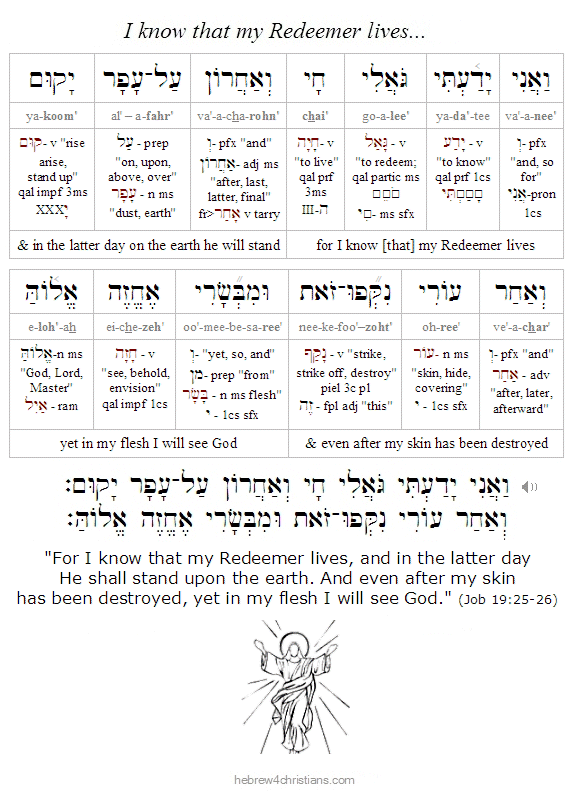 |
No Fear in Love...
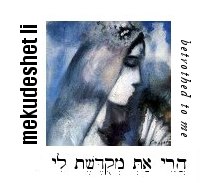
02.17.25 (Shevat 19, 5785) This week's Torah reading (i.e., parashat Mishpatim) concerns various social and civil laws of ancient Israel. Regarding the opening statement of the portion: "And these are the judgments (הַמִּשְׁפָּטִים) which you shall set before them" (Exod. 21:1), the sages state that this means there must be the recognition of basic social obligation between man and his fellow man before the obligation between man and God can be affirmed (see Matt. 5:23-24). This foundational idea may be summed up as, "respect precedes Torah" (דרך ארץ קדמה לתורה), since without any form of brotherhood, unity, or basic civility, we are left with anarchy, anomie, and despair...
As we move closer to the prophesied "End of Days" (אַחֲרִית הַיָּמִים), the world is becoming more and more a place of anarchy, anomie, and despair. Civil law is flouted and every person does "what is right in his own eyes." The storm clouds are gathering, chaverim....
Nonetheless Scripture admonishes us: "There is no fear in love, but perfect love casts out fear" (1 John 4:18). Fear and faith are antithetical, but if you're anything like me, you struggle with fear. The Greek New Testament says that "perfected love" (ἡ τελεία ἀγάπη) "casts out fear" since it is rooted in the idea of punishment (κόλασις). The verse goes on to say that the one who keeps fearing has not been brought to maturity with regard to love.
My fears often center on the future, for example, regarding the matters of providing for my family, being a good parent, husband, etc. The prospect of the "End of Days" makes me more than a little concerned about the moral and spiritual condition of this country. I sometimes find myself anxiously thinking of my childrens' future. Regardless, there is one thing we can (and must) do to fortify ourselves in these perilous times, and that is to renew our faith and to reaffirm our convictions. "When in the dark night of suffering worldly wisdom cannot see a handbreadth ahead of it, then faith can see God, since faith sees best in the dark" (Soren Kierkegaard).
"Faith sees best in the dark," which is to say that it closes its eyes to this world and its thinking to apprehend the truth of eternity. As it is written: "For we walk by faith, not by sight" (2 Cor. 5:7). If you feel tempted to surrender to the despair of worldly thinking, redouble your efforts to study the Scriptures and hold to the truth that sets you free. Make time to study the Torah and the words of Yeshua our Savior!
Hebrew Lesson
Psalm 46:1-2 Hebrew reading:
This Week's Torah:
Parashat Mishpatim...
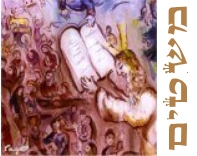
After the LORD spoke the Ten Commandments to Israel, he called Moses up to Sinai for 40 days and 40 nights to teach him details of the commandments and how they were to be applied. The sixth section of the Book of Exodus provides a sampling of these various rules (called "mishpatim" in Hebrew) that God explained to Moses at that time.
02.16.25 (Shevat 18, 5785) Recall that last week we learned that exactly seven weeks after the Exodus from Egypt (i.e., 49 days from the first Passover), Moses gathered the Israelites at the foot of Mount Sinai to enter into covenant with the LORD. In a dramatic display of thunder, lightning, billowing smoke and fire, the LORD descended upon the mountain and recited the Ten Commandments (or Ten Declarations) to the people. Upon hearing the awesome Voice of God, however, the people shrank back in fear and begged Moses to be their mediator before God. The people then stood far off, while Moses alone drew near to the thick darkness to receive further instructions from the LORD.
In this week's Torah reading (i.e., Mishpatim, i.e., Exod. 21:1-24:18) we learn about these additional instructions that Moses received on the mountain. The Jewish sages traditionally count 53 distinct commandments in this portion of the Torah, easily making it one of the most "legalistic" (i.e., law-focused) sections of the entire Bible. Civil laws, liability laws, criminal laws, agricultural laws, financial laws, family purity laws, Sabbath laws, and holiday laws are all given in this portion. These various social and civil laws are called "mishpatim" (מִשְׁפָּטִים), the plural form of the masculine noun mishpat (מִשְׁפָּט), meaning a "judgment," "ordinance," "law" or legal ruling. The word derives from the verb shafat (שָׁפַט) meaning to judge or govern. A shofet (שׁוֹפֵט) is the Hebrew word for "judge," and the LORD is called Ha-Shofet kol ha'aretz (הֲשׁפֵט כָּל־הָאָרֶץ) -- the "Judge of all the earth" who loves justice (Gen. 18:25, 37:28, Psalm 50:6, 94:2).
In this connection we note that the application of the mishpatim became the basis for the tradition application of Jewish case law as well as for halakhah. Recall that the idea of establishing a legal system with courts, judges, and officers was derived from Yitro's advice given to Moses in last week's Torah portion: Moses chose God-fearing men from all over Israel and appointed them as leaders over the people. He put them in charge of groups of one thousand, one hundred, fifty, and ten (see Exod. 18:25).
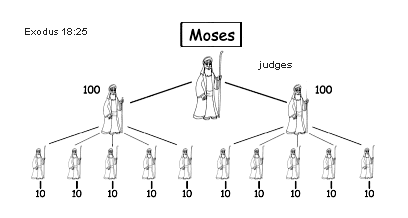 |
According to Jewish legal tradition, mishpatim are called ethical judgments (or laws) given for a clearly specified reason (i.e., logical laws), as opposed to chukkim (חֻקִּים) which are divine fiats or "decrees." An example of a mishpat would be the commandment to give charity or the prohibitions against theft and murder. These mitzvot (commandments) are inherently rational since the denial of their validity would make civil life impossible. In other words, the legal framework for Israel's society was derived from the Ten Commandments and the further instructions given to Moses, and these additional instructions were codified into case law and legal discussions as part of the oral Torah of Israel:
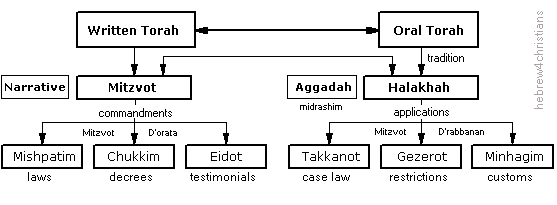 |
After receiving these additional rules, Moses descended Sinai and went before the people to explain the words of the LORD. Upon hearing the details, the people responded in unison, "all the words which the LORD has said we will do" (כּל־הַדְּבָרִים אֲשֶׁר־דִּבֶּר יְהוָה נַעֲשֶׂה). Moses then wrote down the words of the covenant into a separate scroll (sefer habrit), built an altar at the foot of Sinai, and ordered sacrifices to the LORD to be made. He then took the sacrificial blood from the offerings, threw half upon the altar, and read the scroll of the covenant to the people. The people ratified the covenant by saying, "all that the LORD says we will do and obey" (i.e., na'aseh ve'nishmah: נַעֲשֶׂה וְנִשְׁמָע). Upon hearing this, Moses took the other half of the sacrificial blood and threw it on the people saying, "Behold the blood of the covenant that the LORD has made with you in accordance with all these words" (Heb. 9:18). After this ceremony, Moses, Aaron, and seventy of the elders of Israel ascended Mount Sinai to eat a "covenant affirmation meal" between Israel and the LORD.
Upon returning from the mountain with the elders, the LORD commanded Moses to go back up to receive the tablets of stone inscribed with the Ten Commandments. On the seventh day there, he heard the Voice of the LORD calling to him from the midst of the cloud of glory, and then entered into the Presence of the LORD. He remained on the mountain for a total of forty days and forty nights receiving further revelation about the Mishkan (i.e., Tabernacle) while the Israelites waited for him at the camp down below.
Hebrew Lesson
Exodus 21:1 Hebrew reading:
Being alive to Truth...

02.16.25 (Shevat 18, 5785) We read in the Scriptures the call of God: "You shall keep my decrees and my judgments, the pursuit of which man shall live: I am the LORD" (Lev. 18:5). The Kotzker Rebbe advised reading this verse as "You shall keep my decrees and judgments to bring life into them," meaning that we should bring all our heart, soul, and strength into the teaching of Torah. The commandments nourish the soul as food does the body. Just as we seek to season our food to make it flavorful, so we seek to observe the truth with conviction and joy. Amen. The underlying motive for obedience is faith in the love and kindness of our God. "May the beauty of the LORD our God be upon us: and establish the work of our hands upon us; yea, establish the work of our hands" (Psalm 90:17).
ויהי נעם אדני אלהינו עלינו
ומעשׂה ידינו כוננה עלינו
ומעשׂה ידינו כוננהו

"May the beauty of the Lord our God be upon us,
and establish the work of our hands upon us;
yea, establish the work of our hands."
(Psalm 90:17)

Hebrew Lesson:
Psalm 90:17 reading (click):
The Mitzvah Connection...
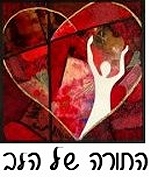
02.14.25 (Shevat 16, 5785) The Hebrew word "mitzvah" (מִצְוָה) is often translated as "commandment," though its basic idea is about connection to God (i.e., the root צוה means to bind or unite). Being connected with the Almighty means talking with him, relating to him as your heavenly Father, and trusting that he esteems you as his beloved child. Whatever else you may think about the commandments of God, this idea of a love connection is foundational and essential. The very first of the Ten Commandments is anochi Adonai Elohekha, "I am the Lord your God," which invites you to open your heart to receive the touch of the Spirit of God. There is no love like that of the Lord, but you can't feel that love if you don't speak to Him, pouring out your heart and clinging to the truth of his love for you....
Pouring out your heart to God in an honest and earnest way is called hitbodedut (הִתְבּוֹדְדוּת). After we "talk our hearts out" before the Lord, in our emptiness we can begin to truly listen, as it says, "In returning and rest you shall be saved; in quietness and in trust shall be your strength" (Isa. 30:15). Only after we sigh deeply and surrender are we receptive to the voice of the Spirit's whisper. "Blessed are all those who wait for Him" (Isa. 30:18). We wait, we abide, even when God takes his time or does not immediately intervene. We do not lose heart, for we find strength when we trust in God's love... The Light of the world still shines: Yeshua, be my inner word, my heart, and my groaning for life today, and forevermore, amen.
Since the essence of Torah is connection to God, the greatest blessing is to be filled with a steadfast desire to draw close to him, to experience hunger and thirst (visceral yearning) for God's presence and touch. Holy desire – expressed in the yearning of heartfelt prayer – is therefore a state of true blessedness, and the more desperate our need for God the more blessed we are. It is our desire, our holy need, that creates a bond between our soul and its Creator, and that is the deeper meaning of mitzvah... "Blessed are those who hunger and thirst for righteousness, for they shall be satisfied" (Matt. 5:6).
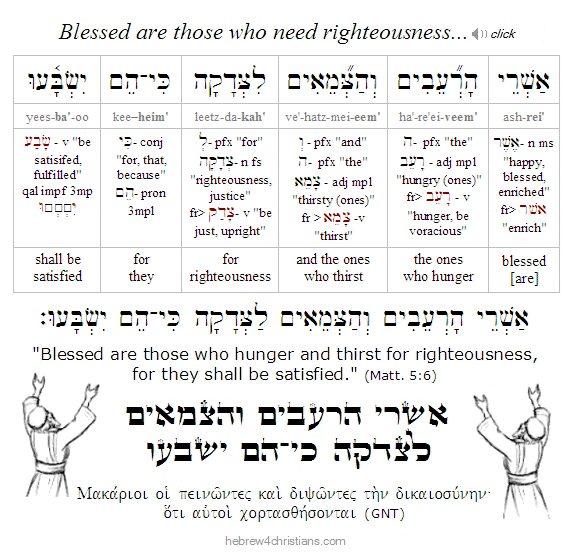 |
True Discipleship...

02.14.25 (Shevat 16, 5785) Yeshua warns us to enter by the "narrow gate," for the gate is wide and the way is easy that leads to destruction, and many are those who enter it. "Because narrow is the gate and difficult is the way that leads to life, and there are few who find it" (Matt. 7:13-14). It is a dreadful possibility that not everyone who calls Yeshua "Lord" truly belongs to him... Many people say they are one of his followers but they are fooling themselves because they don't obey his commandments. That is the essence of the matter. People may profess they "believe" in the Lord for any number of reasons, but they are still unknown to God (Matt. 7:20-23).
Some people admire Yeshua as a compassionate teacher or regard him as an advocate for the downtrodden and oppressed; others seek him for their personal prosperity (or as superstitious protection from evil); still others may feel wordy affection for him and venerate him as great teacher, even regularly attending religious ceremonies in his honor. Perhaps most surprising, however, is that many of the self-deceived may be "ministers" in various forms of professional Christian service. Priests, pastors, deacons, worship leaders, church administrators, card-carrying church members, as well as seminary professors, popular preachers, and respected Bible "scholars" may seek Jesus for personal power. Whether they be self-righteous Pharisees or hedonistic Sadducees, whether self-appointed prophets or button-down traditionalists -- any of these may be not belong to the Lord at all...
The true test for whether you belong to the Lord is straightforward and simple, however, namely, that you will honor Yeshua's authority and keep his commandments (John 14:21; 1 John 2:3-6). Of course that does not mean we will never fail in our obedience, but when we do we will come before the Lord and confess our sin, asking to be restored to fellowship. Even if we ask "seventy times seven" times for forgiveness, we can be assured of God's love and grace for us (1 John 1:9). Remember that the opposite of sin is not our virtue but God's goodness, and it is the obedience of that faith that is essential. "Examine yourselves to see whether you are living the life of trust. Test yourselves. Surely you know that Yeshua the Messiah is among you; if not, you have failed the test of genuine faith" (2 Cor. 13:5).
A life that is fully surrendered or yielded to God is not formed by the ups and downs of impulsive emotions but rather by the sober decision to believe. Once that decision is made, anxiety will be displaced by divine peace. The decision may be sometimes faltering, and it made need to be reaffirmed throughout the day, but the decision must be made.
But how does this happen? What is the source or impetus of this essential willingness? Is it a matter of our own inner resolve? Do we need to be convinced or persuaded in order to make the decision? Do we need "signs and wonders" to believe? Does our relationship with the Lord depend on our ability, our passion, our willingness, our earnestness -- or on His?
On a mysterious level no one is able to turn to the Lord and cleave to him apart from God's personal choice of them. It is the divine prerogative, and it is a miracle. As Yeshua said, "no one can come to me unless the Father who sent me draws them to me" (John 6:44). This was foretold by the prophet by a vision: "The Lord appeared to me from afar saying, 'I have loved you with an everlasting love, therefore I have seized you in grace'" (Jer. 31:3).
Now this may offend human pride which seeks to justify why it is worth being "chosen" (and that wants, moreover, to be the one who makes the choice), but Yeshua was clear: "The Spirit is the one who gives life; human nature is of no help. The words that I have spoken to you are spirit and are life... Therefore I said to you that no one can come to me unless he is enabled to so by my Father" (John 6:63-5). Tragically, because of these words many of Yeshua's supposed "disciples" turned back and "walked with him no more" (John 6:66). These people turned away because God's authority and prerogative reduced them to nothing, and ironically they felt justified as they rejected him. A true disciple, on the other hand, accepts that faith itself is a gift from above, and that we need God to even need God!
Unless God calls you to know him you will not know him. How could it be otherwise? There may be signs of quickening by the Spirit of God, however, leading to rebirth - a sense of the mystery and wonder of life, a haunting anxiety that your soul is in trouble, an inner cry of the heart for deliverance from evil (both your own and outside you), a poignant lament that you are in exile, that you have a terrible need for mercy, that you no longer trust yourself and that you are desperate over the shattered mess of your life.... These sorts of concerns are preconditions for being enabled to turn to God and come to faith in salvation in Yeshua.
Just as you must realize you're sick before you'll seek the cure, so you cannot come to the Lord before you realize your desperate need for him. You must push through the crowd to touch the tzitzit of his robe (Luke 8:43-48). It's a matter of life and death: find God or die... Yet it is this very wound, our incurable need, this blessed fault, that impels us to come and know the Lord, just as it is His very wound, given for our healing, that makes us whole.
Hebrew Lesson
Jer. 31:3b Hebrew reading:
 |
Ten Matters of Heart...

02.14.25 (Shevat 16, 5785) The Ten Commandments (i.e., עֲשֶׂרֶת הַדִבְּרוֹת, literally, "the ten declarations") may be summarized this way: 1) "I AM your only deliverer, the One who loves and chooses you; 2) love me exclusively; 3) regard my love as sacred; 4) rest in me; 5) honor your life and its history. Do no harm to others: 6) forsake anger, 7) abandon lust, 8) respect others, 9) abhor lying, and 10) refuse greed and envy. Know that you belong to me and that you are accepted. Love others as you are also loved.
The "heart of the law" is the Torah of love, just as the "law of love" is the Torah of the Gospel (John 15:12). "Teach me the whole Torah, a heathen said, while I stand on one foot. Shammai cursed and drove the man away. He went to Hillel. Hillel said, What is hateful to you, do not do to anyone else: that is the whole Torah. The rest will follow – go now and learn it." As the Apostle Paul taught: "For the whole law is fulfilled in one word: Ve'ahavta: "You shall love your neighbor as yourself" (Gal. 5:14). Love does no wrong to a neighbor; therefore love is the fulfilling of the law" (Rom. 13:10).
The sages have said that when the Holy One spoke to the people of Israel, each one felt personally spoken to by God, and thus it says in the singular, 'I am the Eternal One, your God'" (Midrash Shemot Rabbah). Indeed the very first commandment given at Sinai was to accept the reality of our personal deliverance by the LORD: "I am the LORD your God, who brought you (singular) out of the land of Egypt, out of the house of slavery" (Exod. 20:2). In fact, God used the second person singular (not plural) for all the verbs throughout the Ten Commandments: "you (singular) shall have no other gods beside me"; "you (singular) shall not take the Name of the LORD your God in vain," and so on. The very first commandment, however, is the starting point for all that follows. Until you are personally willing to accept the LORD as your God and to trust Him as your own Deliverer and King, the rest of the commandments are not likely to be heeded.
Hebrew Lesson
Exod. 20:2 Hebrew reading:
 |
God began the Ten Commandments by saying, "I AM the LORD your God, who brought you out of the land of Egypt, the house of slavery" (Exod. 20:2), rather than saying, "I AM the LORD your God, Creator of heaven and earth" (Gen. 1:1). The LORD refers to himself as our Savior first, since creation is designed to demonstrate His redemptive love given through Yeshua, the "Lamb slain from the foundation of the world" (Rev. 13:8; 1 Pet. 1:18-20; Eph. 1:4; 2 Tim. 1:9). "All things were created by Him (i.e., Yeshua), and for Him" and in Him all things consist (συνεστηκεν, lit. "stick together") (Col. 1:16-17). Creation therefore begins and ends with the love of God as manifested in the Person of Yeshua our Messiah, the great Lamb of God... He is the Center of Creation - the Aleph and Tav - the Beginning and the End (Isa. 44:6; Rev. 1:17). All the world was created for the Messiah: "For from him and through him and to him are all things. To him be glory forever. Amen" (Rom. 11:36).
Hebrew for Christians Podcast

The Fruit of our Words...
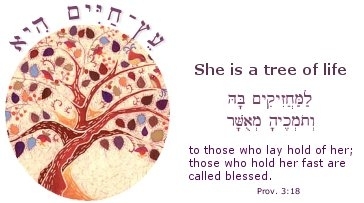
The following is related to Tu B'Shevat, or the "new year" for trees, a holiday that provides opportunity for us to reflect on the idea of fruitfulness and the fruit of the Spirit in our lives...
02.13.25 (Shevat 15, 5785) Our Lord said that as a tree is to its fruit, so is a person's heart is to his speech. Our words arise from an underlying source and root, and it is vital, therefore, to address the source of our angry, cynical or cruel words, our fearful and deceptive words, our despairing and faithless words: "I tell you, on the Day of Judgment people will give account for every careless word (πᾶν ῥῆμα ἀργὸν) they speak, for by your words you will be justified, and by your words you will be condemned" (Matt. 12:36-37).
First note that the phrase translated "every careless word" can further be understood as "every 'workless' word," that is, every vain or empty word spoken, every broken promise, every insincere utterance, and so on. Second, note that there is a relationship between naming and being in Hebrew thought, and indeed the Hebrew word davar (דּבר), usually translated as "word," can also mean "thing." This suggests that our words define reality - not in an absolute sense, of course - but in terms of our perspective and attitude, and for that we are held responsible before the LORD. Since our words express our thoughts, Yeshua wants us to make up our minds: "Either make the tree good and its fruit good, or make the tree bad and its fruit bad, for the tree is known by its fruit" (Matt. 12:33).
"By your words you will be justified, and by your words you will be condemned..." Our words can be vessels of light, healing, mercy, and grace -- or vessels of darkness, destruction, and blame -- and sometimes both! (James 3:10). "Death and life are in the power of the tongue, and those who love it will eat its fruits" (Prov. 18:21). Therefore let us ask God for help, for "the tongue can no man tame; it is an unruly evil, full of deadly poison" as James the Righteous wrote (James 3:8). May we appeal to God for the power to obey his commandment: "Let no corrupt word proceed out of your mouth, but what is good for necessary edification, that it may impart grace to the hearers" (Eph.4:29; Col. 4:6). Using our words to express appreciation, kindness, encouragement, etc., is analogous to using the "good eye" to see by means of the light of God; it is a form of offering "kaf zechut," the benefit of the doubt and choosing to regard the best, even in difficult circumstances...
Listen to the words of your heart and understand that they are devarim (דְּבָרִים) "things" that are defining the course of your life right now. Our thoughts and words "exhale" the breath of God that was given to each of us. In a very real sense they serve as "prayers" we are constantly offering.... And may it please our gracious and long-suffering LORD to answer the cry of our heart: "Let the words of my mouth and the meditation of my heart be acceptable in your sight, O LORD, my Rock and my Redeemer." Amen.
יהיו לרצון אמרי־פי
והגיון לבי לפניך יהוה צורי וגאלי

"Let the words of my mouth and the meditation of my heart
be acceptable to You, O LORD, my Rock and my Redeemer."
(Psalm 19:14)

Hebrew Lesson
Psalm 19:7 Hebrew reading (with comments):
"And now, dear brothers and sisters, one final thing. Fix your thoughts on what is true, and honorable, and right, and pure, and lovely, and admirable. Think about things that are excellent and worthy of praise" (Phil. 4:8).
Revelation and the Law...
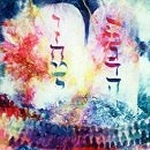
The following is related to Parashat Yitro and the giving of the Ten Commandments at Sinai...
02.13.25 (Shevat 15, 5785) The climactic event of this week's Torah portion (Yitro) is of course the great revelation of God at Mount Sinai - a transformative experience in which the people heard the voice of the LORD (קוֹל יהוה) speaking directly to them. And while this awesome event marked the birth and commissioning of the nation of Israel at the time of the Exodus, it also serves as a parable for each sojourning soul. As it is said in the traditional Passover hagadah, "Dor va'dor: Each person in every generation must regard himself or herself as having been personally redeemed from Egypt" (Pesachim 116b).
For instance, in our "desert wanderings" today we may come upon a time of revelation as we begin to understand the truth of our connection to God who is the Source of our lives and of all that exists (1st Commandment). We then realize that God alone is our ultimate concern and our Deliverer, and our idols of heart and mind - those desires that attach us to vanity and illusions - are suddenly regarded as worthless (2nd Commandment). Like a moment of "satori," the fragments and shattered pieces of our lives come together into a vision of beauty and unity. We understand that the LORD is greater than all our conceptions and imaginations. We confess our limitations as we honor God and thank him for the miracle of life (3rd Commandment).
Continuing with the allegory, we let go of our daily cares and preoccupations to set apart time to reflect on what is sacred, beautiful, and true (4th Commandment). We reconnect with the gift of life and remember that we are all part of one another (5th Commandment), and therefore we cannot hurt others without thereby hurting ourselves (6th-8th Commandments). We realize that we are to respect and honor others, to use the "good eye," and to abhor any temptation to envy them or to say false things about them (9th Commandment). Instead of comparing ourselves to others, we affirm our connectedness before God. This enables us to let go of our inner turmoil that comes from a feeling of lack, since we understand that with God we have everything that really matters, and that we are therefore rich beyond all measure (10th Commandment).
This allegory (or parable) suggests that the commandments are not to be regarded as an external burden imposed upon the soul but rather a by-product or "out flowing" of revelation itself. To know God is to love him, and heartfelt faith in his love reveals the way to live. The pieces and fragments of life are resolved as we find shalom living before God's presence.
Our Torah portion offers guidance about how to prepare for revelation through the advice of Yitro, Moses' father-in-law, who counsels us to "make space" for God by letting go of our busyness and allowing others to help us carry our burdens. That was Yitro's advice concerning the establishing judges and leaders to help Moses fulfill his particular mission (Exod. 18:13-16). Yitro's wisdom is about finding balance and inner peace to become more receptive to God's presence. Moses was overrun and overwhelmed in his service to others, and it was essential for him to quiet his heart and pray. Yeshua did this often by getting alone with the Father (Mark 1:35; Luke 5:15-16; Luke 6:12; Matt. 14:13). Likewise the apostles were harried in their service and needed help from others so they could devote themselves to "prayer and the ministry of the word" (Acts 6:2-4). Each of us has needs for solitude, private prayer, quiet reflection, rest, experiencing nature, and so on.
This way at looking at the revelation at Sinai is helpful, since it discerns God's heart beneath the imperative language of the commandments, but of course the moral imperatives of the law are nevertheless the expression of God's will, and -- as we will see later in both parashat Bechukotai and Ki Tavo -- there are serious consequences for disregarding God's commandments, namely, the "curses of the law" and the "tochachah" judgments that result from disobedience. So we must qualify what has been said by noting that the law reveals both that we are guilty for breaking covenant with God and furthermore that we are powerless not to do so apart from the power of the Holy Spirit. And this is part of what Paul meant when he said that faith "establishes" the law in the book of Romans (Rom. 3:1).
The law reveals our sin and therefore our need for deliverance. It is acknowledgment both of the just verdict for our guilt and God's remedy given in Yeshua which restores us and enables us to fulfill the heart of the law by means of the agency of God's power and Spirit. The law is holy and just and good, but our sinful condition alienates us from God because we are in dread over judgment for our sins. The grace and truth of God, the "righteousness of God," is what saves us, not by nullifying the truth of the law but by reconciling that truth with the mercy and kindness of God embodied in the sacrificial life of Yeshua on our behalf (Psalm 85:10). Amen, the essence of the gospel is that "God made him who had no sin to be sin for us, so that in him we might become the righteousness of God" (2 Cor. 5:21).
Hebrew Lesson
Psalm 19:7 Hebrew reading:
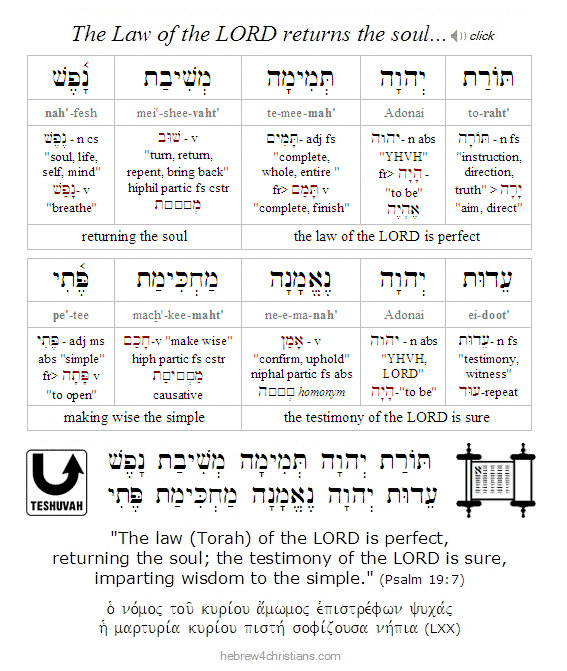 |
The Torah of Trees...

Sunset today marked Tu B'Shevat, the 15th of Shevat, the "new year" for trees...
02.12.25 (Shevat 14, 5785) The Torah alludes that human life is like "the tree of the field," i.e., כִּי הָאָדָם עֵץ הַשָּׂדֶה, Deut. 20:19), and many people therefore observe Tu B'Shevat as time to assess man's place within creation as well. Since God created the world for a habitation (Isa. 45:18), some have pictured the world itself as a "great tree" with human beings as its fruit. Indeed, Yeshua often used such agricultural images in his parables. For example, he explained that people are known by the "fruits" of their lives (Matt. 7:16-20). He likened the spread of his message in terms of "sowing and reaping" (Matt. 13:3-23) and compared the Kingdom of Heaven to the secret working of a mustard seed (Matt. 13:31-32). Yeshua regarded the world as a "field" for planting with different "types of soil" (Matt. 13:38-43), and warned of the "great harvest" of souls at the end of the age (Luke 10:2; Matt. 13:30). He pointed to signs from a fig tree to indicate the nearness of the prophesied End of Days (Matt. 24:32-33). Yeshua also used the metaphor of a "vine and its branches" to explain how his followers are to be connected to Him (John 15:1-6).
The Scriptures explicitly state various laws regarding the use of trees. In other words, there is a "Torah of Trees." For example, "When you enter the land and plant any tree for food, you shall regard its fruit as "uncircumcised" (i.e., orlah: עָרְלָה) for three years; in the fourth year all its fruit shall be holy, an offering of praise to the LORD; only in the fifth year may you use its fruit, to increase its yield for you: I am the LORD your God" (Lev. 19:23-25; 26:3-4). The Torah also clearly forbids the destruction of fruit trees during times of warfare: "When you besiege a city for a long time, making war against it in order to take it, you shall not destroy its trees by wielding an axe against them. You may eat from them, but you shall not cut them down. Are the trees in the field human, that they should be besieged by you?" (Deut. 20:19-20). Clearly, then, God cares for trees...
The psalmist describes the trees of the forest as singing for joy (Psalm 96:12), just as the prophet Isaiah foretold the day when the trees of the field shall "clap their hands" in praise to the LORD God of Israel (Isa. 55:12). Indeed the wisdom of Torah (chochmat haTorah) is metaphorically called etz chaim, a "Tree of Life," and the ideal righteous man is described as the one who delights in the Torah (תּוֹרָה) and meditates upon it daily. "He is like a tree planted by streams of water that yields fruit in its season."
וְהָיָה כְּעֵץ שָׁתוּל עַל־פַּלְגֵי מָיִם
אֲשֶׁר פִּרְיוֹ יִתֵּן בְּעִתּוֹ וְעָלֵהוּ לא־יִבּוֹל
וְכל אֲשֶׁר־יַעֲשֶׂה יַצְלִיחַ
ve·ha·yah · ke·etz · sha·tool · al-pal·gei · mah'·yeem
a·sher · peer·yoh · yee·ten · be·ee·to · ve·a·lei'·hoo · loh · yee·bol
ve·khol · a·sher-ya·a·sei · yatz·lee'·ach

"And he [i.e., the one who loves Torah] is like a tree planted by streams of water
that yields its fruit in its season, and its leaf does not wither.
And all that he does shall prosper."
(Psalm 1:3)
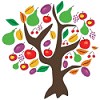
Hebrew Lesson
Proverbs 3:18 reading (click for audio):
Eyes of the Heart....

"If your eye is good, your whole body will be full of light..."
02.12.25 (Shevat 14, 5785) The Danish philosopher Soren Kierkegaard (1813-1855) told the story of two young portrait artists who both sought to capture the essence of beauty in their paintings. One artist looked high and low for the "perfect face of beauty" but never found it. Tragically, he later gave up painting and lived in despair. The other artist, however, simply painted every face he saw and found beauty in each one. Now here's your question: Which of the two was the sincere artist?
The heart looks through the eye.... The good eye (i.e., ayin tovah: עַיִן טוֹבָה) - sometimes called the "beautiful eye" (עין יפה) - refuses to think evil about others (it "does not impute the bad" - οὐ λογίζεται τὸ κακόν - in 1 Cor. 13:5), but it rejoices in the truth – even if such truth is found only in the hope of a future good (1 Cor. 13:7). The good eye is the instrument of a giving heart that looks upon the needs and pains of others with genuine compassion. The "evil eye" (i.e., ayin hara: עַיִן רָעָה), on the other hand, is cynical, jaded, envious, and unsympathetic to other people and their struggles... Using a good eye takes from the treasure within the heart and gives it out freely to others: "The good person out of his good treasure brings forth good, and the evil person out of his evil treasure brings forth evil" (Matt. 12:35). There never is a risk that love may be given away without warrant from heaven. In the future judgment to come, I'd rather be found guilty of "casting pearls before swine" than to be found guilty of withholding love from others...
A person with a "good eye" looks at things from the perspective of love. Ayin tovah looks at circumstances -- and especially at other people -- and finds something beautiful.... "Whoever sows sparingly will also reap sparingly, and whoever sows bountifully will also reap bountifully" (2 Cor. 9:6). As we give, so we are given...
טוֹב־עַיִן הוּא יְברָךְ
כִּי־נָתַן מִלַּחְמוֹ לַדָּל

"The one with a good eye will be blessed,
for he gives from his bread to the poor."
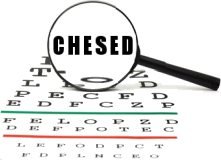
Hebrew Lesson
Proverbs 22:9 Hebrew reading (click):
Our Lord Yeshua told us, "The light of the body is the eye. If therefore your eye is good (i.e., ἁπλοῦς, sincere, heartfelt, compassionate), your whole body will be full of light, but if your eye is evil (i.e., πονηρὸς, wicked, malicious, ungracious), your whole body will be full of darkness. If then the light in you is darkness, how great is the darkness!" (Matt. 6:22-23). May it please God to make each of us shocher tov (שׁחֵר טוֹב), "a seeker of good." May He give us new hearts to behold the good in all things... Amen.
The Ground of our Lives...
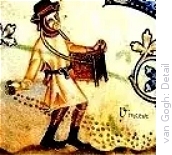
"Take heed therefore how you hear: for whoever has will be given more; but whoever does not have, even what he thinks he has will be taken from him." - Jesus
02.12.25 (Shevat 14, 5785) Simply knowing about God is insufficient for a transformed life; something more is needed, namely, receptivity of the heart - a sense of concern, a hunger and a thirst for life, and the willingness to believe in the truth of love. Yeshua taught that the condition of our heart is revealed by how we hear. Without charity and a deep sense of concern, loss will inevitably occur. He warned us: "Take heed therefore how you hear: for whoever has will be given more, but whoever does not have, even what he thinks he has will be taken from him" (Luke 8:18). Just as "the good eye" (הָעַיִן הַטּוֹבָה) looks for what is good, so "the good ear" (הַאֹזֶן הַטּוֹבָה) listens to the word of hope; and just as "the evil eye" (הָעַיִן הָרָעָה) looks for what is evil, so "the evil ear" (הַאֹזֶן הָרָעָה) attends to the message of loss and despair. We receive what seek. As we inwardly receive the truth of Yeshua, more truth is revealed; but if we resist, untruth will take root and grow...
Yeshua often employed parables (משׁלים), or analogical stories, in his teaching because they simultaneously conceal and reveal spiritual truth. A parable obscures the truth to those who don't really want it, so that "seeing they may not see, and hearing they might not understand" (Luke 8:9-10; Isa. 6:9-10), and yet it reveals truth to the humble of heart. Since Yeshua's whole life was a parable of sorts - a "disguise" that led to the victory of our deliverance (Phil. 2:7) - it is not surprising that he regularly used "figures of speech" to provoke people to examine their own heart condition and the quality of their faith... In this connection note that Yeshua never explained the "mysteries of the kingdom of God" directly to the crowds, nor did He ever pander to the crowd's clamor or interests. God's word is freely "sown" to all, but it is received only by those who are willing to hear. The message is always directed to the individual willing to follow Him -- to the one who has "ears to hear."
For example, the famous "Parable of the Sower" (מָשָׁל לְזוֹרֵעַ; Luke 8:4-8) teaches us that God is like a farmer who sows seed upon the "soil" of the human heart, the quality of which may be hard, shallow, choked, or good:
- A "hard heart" (לֵב קָשְׁה) is likened to impenetrable soil that repels the "seed" of the promise of God (ὁ λόγος τοῦ θεοῦ, Luke 8:11). Because of bitterness, a person can become indifferent and numb inside, and this heart condition enables the devil to snatch the seed of hope from the heart like a ravenous bird (Luke 8:12).
- A "shallow heart" (לֵב רָדוּד) is likened to topsoil that overlays bedrock. At first the soil receives the seed and quickly begins to grow, but since there is no depth of soil, the growth fails to take root and the growth withers for lack of nutrients and moisture. When tested, the shallow heart reveals its lack of commitment and does not persevere (Luke 8:13).
- A "choked heart" (לֵב חָנוּק, or לב חָסוּם) is likened to weedy soil that hides other roots that exhibit "thorns," namely worldly fears, the desire for riches, and the pursuit of comfort or pleasures. Such people are double-minded and their spiritual life becomes obstructed, throttled by busyness, distracted by desires for comfort, security, and worldly vanities. They are full of inner conflict and despair and consequently become stunted in their growth (Luke 8:14).
- Finally, a "good heart" (לב טוב) is likened to tilled and receptive soil that receives the seed to yield an abundant harvest: "yielding thirty, sixty, or a hundredfold." Because the righteous honor the seed and nurture its presence, the hidden power of the Life is powerfully released (Luke 8:15). They are also likened to a tree planted by rivers of living water that bring forth fruit in their season (Psalm 1:3).
In this connection it is helpful to remember that fruit does not immediately crop up but requires time and its own season... The process of spiritual growth is ultimately mysterious and divine: "The kingdom of God is like someone who spreads seed on the ground. He goes to sleep and gets up, night and day, and the seed sprouts and grows, though he does not know how. By itself (αὐτομάτη, "automatically") the soil produces a crop, first the stalk, then the head, then the full grain in the head. And when the grain is ripe, he comes in with his sickle because the harvest has come" (Mark 4:26-29). With God all things are possible, and the life of God is a miracle that comes from God's own source of Life. It is the fruit of the Spirit, after all, and not the result of human effort or moral reformation...
So the "parable of the sower" teaches us that how we hear will determine the quality of the ground (or basis) of our spiritual life. If we are honest with ourselves, we will see our own hardness, shallowness, and selfishness in contrast to the fruitfulness marked by the good heart, and this should provoke us to seek God for help... Again, only a new heart (לֵב חָדָשׁ) created by power of God's Spirit can possibly yield the fruit of the Spirit (פְּרִי הָרוּחַ). "Take care then how you hear, for to the one who has, more will be given, and from the one who has not, even what he thinks that he has will be taken away" (Luke 8:18).
Believers are likened to earthen vessels that hold the treasure of God's truth, and therefore they are in constant need of God's grace to persevere. Therefore Yeshua told his disciples: "I am the true vine (הַגֶּפֶן הַאֱמִיתִית), and my Father is the gardener (הַכּוֹרֵם). Every branch in me that does not bear fruit he takes away, and every branch that does bear fruit he prunes, that it may bear more fruit" (John 15:1-2). Note that it is the healthy branch that will be cut back - not the withered one that will be altogether removed – and this purging process may be painful at times. The heavenly Gardener's goal is for the fruitful branch to reveal more and more the connection to the heart of the Vine, so that God is glorified (see John 15:8). The end here is the beatific vision: "Blessed are the pure in heart, for they shall see God" (Matt. 5:8). The goal of "purging" is fruitfulness and blessing, but the agency is not the will of man but the power of God. You are made "clean" through the word of God spoken within your own heart (John 15:3). This is the acceptance of the Messiah's life within you. Your sanctification, however, depends on your communion with God, staying connected to what is real, central, vital, the core truth of God's Presence and love, the ultimate Reality of Life itself.
In light of these things I hope we might better appreciate and understand Yeshua's admonition: "Abide in me, and I in you. As the branch cannot bear fruit by itself, unless it abides in the Vine, neither can you, unless you abide in me. I am the vine; you are the branches. The one who remains in me – and I in him – bears much fruit, because apart from me you can accomplish nothing" (John 15:3-5). Our connection to Yeshua is intended to bear fruit that glorifies God, but if we refuse to find life in him, we will eventually wither and die (John 15:6). We find sustenance and healing only as we remain connected to Messiah who is the Source and Conduit of life (מְקוֹר וְאת הַצִּינוּר שֶׁל חַיִּים), for he alone is the Savior and LORD.
True life grows out a heart connection with our Lord, and without that connection our lives become vain and will yield no eternal significance. Nevertheless let us remain encouraged, friend, since God calls us to Himself. This is "the work of faith." Look to heavenly reality and not to the vanity and deceits of this world (Col. 3:1-4). Find life in connection with Yeshua, drawing strength and vitality from your relationship with Him. The fruit of the Spirit is produced as we open our hearts and yield ourselves to the love and presence of the Lord. May you grow in grace and be fruitful in God's love. Amen.
Hebrew Lesson
Exodus 19:5a reading (click):
What is the Torah?
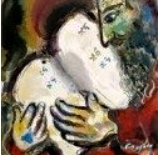
The following might seem a bit "technical," but understanding some of the distinctions discussed may give a better idea of the meaning of the Scriptures... This is a short article, however, and not everything that can be said has been said on the subject! For more information go to the Hebrew for Christians website and search for the role of Torah articles I've written over the years.
02.12.25 (Shevat 14, 5785) Shalom chaverim. Since this week we are reading about the giving of the law at Mount Sinai, I think it's fitting to revisit the question of what the Torah is. Does the word simply refer to the tablets with the Ten Commandments inscribed on them, or perhaps to the written scrolls that contained the collected writings of Moses? If the latter, then by whom and by what process were these writings ratified as divinely inspired Scripture? And does this ratification imply that the idea of "Torah" includes "oral" traditions that have identified, discussed, interpreted, and applied the meaning of the written words for every generation? If so, does "oral" Torah have the same authority as the written words of Moses (and by extension, the words of the prophets)? In short, how are we to understand what the Torah is and how we are to apply it to our lives?
In order to answer some of these questions, we need to dig a bit deeper. As many of you know, the Hebrew word Torah (תּוֹרָה) comes from the root word yarah (יָרָה) meaning "to shoot an arrow" or "to hit the mark." When used in relation to moral and spiritual truth, the word means "direction" or "instruction" regarding doing the will of God. Practically speaking, however, Torah refers to the apprehension of divine wisdom (חָכְמָה), that is, upright thinking and doing as directed by divine imperatives (mitzvot: מִצְווֹת) revealed in the holy Scriptures and practiced through sanctified discipline (mussar: מוּסָר). In other words, "Torah" is related to the idea of commandments, or the imperatives given by God.
The sages note that are two basic categories of commandments: mitzvot aseh (מִצְוֹת עֲשֵׂה), or positive directives ("thou shalt..."), and mitzvot lo ta'aseh (מִצְוֹת לא תַעֲשֵׂה), or negative directives ("thou shalt not..."). A positive commandment is obligation to do something, whereas a negative commandment is an obligation to refrain from doing something.
The Jewish Scriptures are filled with directives intended to awaken us to the reality of God's immanent Presence. Da lifnei mi attah omed (דַּע לִפְנֵי מִי אַתָּה עוֹמֵד) - "Know before Whom you stand." There are 613 commandments given in the Torah of Moses, hundreds more found in the Writings (הַכְּתוּבִים) and the Prophets (הַנְּבִיאִים), and over a thousand revealed in the New Testament (הַבְּרִית הַחֲדָשָׁה). All of these imperatives are intended to give voice to the concern and love of God by pointing to the blessing of knowing the Divine Presence in the midst of our daily lives. Torah teaches us to make choices according to the divine light revealed in Scripture. Godly wisdom is grounded in the fear (i.e., respect) for the gift of life that will be expressed through the discernment between the sacred and the profane, good and evil, right and wrong, in our daily lives. This is called yirat shamayim (יראת שמים).
Hebrew Lesson
Prov. 9:10 Hebrew reading:
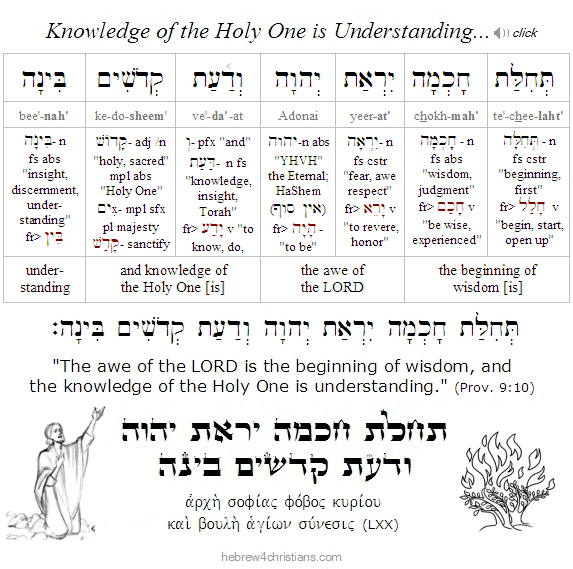 |
In Jewish thought, the word "Torah" (תּוֹרָה) is therefore a general term that implies a wide range of related ideas and concepts that focus on discerning God's will. A primary distinction is between the written Torah, on the one hand, and the oral Torah on the other. The written Torah, called she'bichtav (שֶׁבִּכְתָב, "that which is written"), refers to the text that has been meticulously transmitted since the time of Moses in the form of a Sefer Torah (i.e., a kosher Torah scroll). The oral Torah, on the other hand, is called shebal peh (שֶׁבְּעַל פֶּה, "that which is oral"), and refers to legal and interpretative traditions handed down by word of mouth until these were codified in the Mishnah and Gemara (i.e., the Talmud). The Oral tradition further includes the Midrash (traditional exegesis), the Responsa (questions and answers given by "poskim," or legal scholars), the Shulchan Aruch (16th century codification of Jewish case law), and various other commentaries handed down over the centuries. Some people also say that Kabbalah (קַבָּלָה), or the text of the Zohar (זֹהַר), is also oral tradition, though strictly speaking it is not regarded as part of the Oral Torah as understood in Jewish tradition.
Jewish thought or "hashkafah" (השקפה) further maintains that the written Torah and the oral Torah are complementary, since Moses himself (inspired by Yitro) established the role of judges and law courts as part of the written Torah from the very beginning (see Exod. 18:13-26; Num. 11:24-29; Deut. 16:18-20; 17:8-12), and ultimately the oral Torah derives its justification and substance from the written revelation. Indeed it is somewhat artificial to distinguish between the two in practice, since the written Torah was preserved through tradition (i.e., the scribal transmission, the books to be included in the canon, etc.), just as the oral Torah was validated by the written words of the Torah scroll itself.
In short, there is a sort of "circular reasoning" involved in the traditional Jewish idea of Torah: The written Torah was passed down (validated) by means of the oral Torah; but the oral Torah derives its authority from the written Torah:
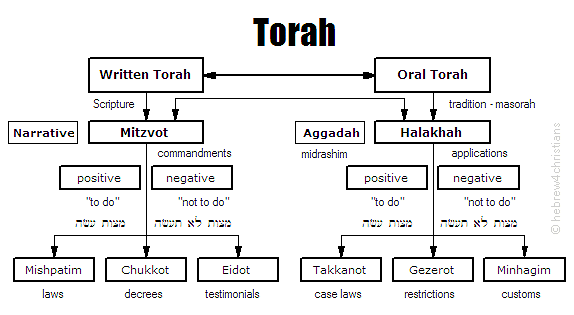 |
It should be noted that this same sort of interplay between interpretation (i.e., theology) and the written Scriptures appears in the Christian tradition as well...
Interestingly enough, Jewish tradition seems to go two ways with the idea that Torah can be explicated by means of halakhah. On the one hand, it carefully enumerates every nuance of each of the various commandments of the Torah, creates various takkanot (case laws) and even multiplies the Torah's principles by building "fences" (i.e., gezerot) around the commandments, yet on the other hand it can (and does) distill the various commandments of the written Torah to more general principles that are fewer and fewer in number. For example, in Makkot 23b-24a the discussion goes from an enumeration of the 613 commandments identified in the Torah, to David's reduction of the number to 11 (Psalm 15), to Isaiah's reduction of the number to six (Isaiah 33:15-16); to Micah's reduction to three (Micah 6:8); to Isaiah's further reduction to two (Isaiah 56:1); ultimately leading to the one essential commandment spoken by the prophet Habakkuk ("The righteous shall live by his faith" - Habakkuk 2:4). Obviously the Apostle Paul distilled the various mitzvot to this selfsame principle of faith (see Rom. 1:17, Gal. 3:11, Heb. 10:38).
Now Yeshua was "the Voice of the Living God (קוֹל אֱלהִים חַיִּים) speaking (davar) from the midst of the fire" at Sinai (Deut. 5:26), and therefore He is the Divine Lawgiver (מְחוֹקֵק) of mankind. As the Ruler of Israel (ריבון ישראל), Yeshua reiterated and amplified the axioms of the Ten Commandments in the Sermon on the Mount, emphasizing that they were not merely external rules of conduct but matters of the heart... In this connection is important to make the distinction between the general idea of Torah (תּוֹרָה) with the more specific idea of covenant (בְּרִית), since these are different (though related) things.
While the Hebrew word "Torah" means "instruction" or "teaching," the word "covenant" refers a specific agreement or "contract" made between God and man. In order to avoid potential confusion between the Torah of Moses (תּוֹרַת משֶׁה) and the Torah of Yeshua (תּוֹרַת הַמָּשִׁיחַ), then, we must keep in mind that Torah is always a function of the underlying covenant of which it is part. This implies that if the covenant were to change, so would our responsibility (i.e., Torah). As it is written in the New Testament: "For when there is a change (μετατιθεμένης) in the priesthood, there is necessarily a change in the law as well" (Heb. 7:12). Now the word translated "change" in this verse comes from the verb μετατίθημι (from meta, "after" + tithemi, to "set") which might better be translated as "transposed." The idea is the priesthood reverted to the original Malki-Tzedek priesthood of Zion and therefore required a corresponding "transfer" of authority (μετάθεσις) to the original kingship as well. Yeshua alone is both High Priest and King... The failure to make this distinction leads to exegetical errors and invalid doctrines. We must "rightly divide" (ὀρθοτομέω, lit. "cut straight") the "word of truth" (דְּבַר הָאֱמֶת, see 2 Tim. 2:15).
Note: This article continues here -- or you can visit the H4C Substack page here.
Overcoming Despair...

The argument of the devil (i.e., "argumentum diaboli") is that your worst nightmare will be true, that change is impossible, and therefore hope is delusional. There is no way out of your self; love is lost; you are outcast, condemned, forever alone. For those who sometimes feel that way, know that God can intervene and save....
02.11.25 (Shevat 13, 5785) Our most serious struggles are inward, matters of heart, as we wrestle with dark emotions like fear, anger, disappointment, and guilt. We often despair over the contradiction between our ideals and our realities; we regard our failures and then feel lost and unlovable in the hardness of unspoken shame...
On the very deepest level, however, the presence of despair may be a sign of real hope, since it may express a holy "protest" over what the heart knows is wrong in its yearning for deliverance from its own wretchedness. The desperate heart knows it must find God or die. This sort of despair laments because it believes, and it believes in the midst of its lament.
Do you sometimes feel like an utter failure? That you've "ruined" your life? That no matter what you do, you cannot escape your own mediocrity and shortcomings? There is hidden blessedness in your discomfiture. As Yeshua said, "Blessed are those who are poor in spirit - the needy, the bankrupt, the powerless - for theirs is the Kingdom of heaven" (Matt. 5:3). The hidden life of the seed is not released until it first is broken and dies (John 12:24).
Hebrew Lesson
Matthew 5:3 Hebrew reading (click):
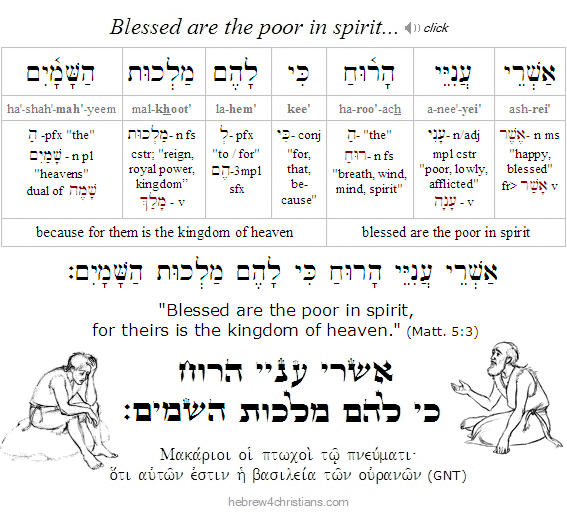 |
Should you be scandalized over your brokenness? Should you rue the day we were born into your fallen world of troubles? Whenever I re-encounter my own ineptitude, my own failures, my immaturity and weaknesses, I have to choose whether to allow these things to define what is most real about me -- or instead to look to the Lord. For me healing is found not in shameful self-examination but in liberating self-forgetting, looking away from what I am to who He is... Of course that does not mean we should not examine ourselves and confess our sins, but we must do so in remembrance of his suffering and death for us upon the cross. We repent in dust and ashes and yet are lifted up into his compassionate heart. Despite ourselves we affirm: "by the grace of God I am what I am."
The fact that God knows the number of hairs on your head means that he knows you better than you know yourself... Your heavenly Father "sees in secret," and that also means that he can and will save you from whatever is hidden within you that still cannot fully receive his love and touch... We have to trust in God's power to heal us, even when it seems that healing is not forthcoming, even when we still find ourselves divided, troubled, and anxious. We have to believe that God's help is always present. "Be strong, and let your heart take courage, all you who hope for the LORD" (Psalm 31:24).
God sees what He does within us, His "it-is-finished" work, the effect of His great salvation within our hearts, even if at this present hour this may be hidden from our eyes... There is appearance, and there is reality; and only God sees what is ultimately real. We have to trust in His promise to be transformed into the divine nature, even if today we find ourselves sinful, needy, and in disrepair... By God's grace we are what we are. So don't give up. We are saved by hope (ἐλπίδι ἐσώθημεν, Rom. 8:24), a hope for you today. Amen.
 |
Finding Real Treasure...
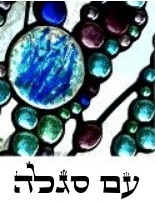
02.11.25 (Shevat 13, 5785) "The kingdom of heaven is like treasure hidden in a field, which a man found and covered up. Then in his joy he goes and sells all that he has and buys that field. Again, the kingdom of heaven is like a merchant in search of fine pearls, who, on finding one pearl of great value, went and sold all that he had and bought it" (Matt. 13:44-46). Here Yeshua teaches us that a relationship with God is the true source of joy and value in life, and that all other passions and desires are like "fools gold" when compared with its overwhelming worth... In this connection Soren Kierkegaard wrote: "If anyone thinks he is a Christian and yet is indifferent toward being that, then he really is not one at all. Indeed, what would we think of a person who gave assurances that he was in love and also that it was a matter of indifference to him?" (Works of Love).
The Shema, the "great commandment," is to love God "bekhol levavkha" (בְּכָל־לְבָבְךָ) with all our hearts, yet how is that love possible apart from the revelation of the passion of love itself? "We love because God first loves us" (1 John 4:19), and therefore teshuvah ("repentance") is a matter of being in love, celebrating God's heart for us, awakening to its wonder, and being thrilled and overjoyed at its reality. Is this not the essence of the matter? "Shimon ben Yonah, atah ohev oti?" – "Simon son of Jonah, do you love me?" (John 21:17). But how can we love the Lord apart from trusting his heart for us? "Come unto Me," Yeshua says, "live in Me and I will live in you." O Lord God our Savior, deliver us from apathy and indifference! Soften our hearts and awaken us to our great desire and need for you! Hashivenu, Adonai: turn us, O LORD, and we shall be turned; heal us, and we shall be healed Let know the breadth and length and height and depth of your great love!.
So for what do you hope, friend? What are your dreams? Your deepest desires? Where is your treasure? Yeshua cautioned those who sought their happiness in this world: "Do not store up for yourselves treasures upon earth... be rich toward God" (Matt. 6:19-20; Luke 12:21). When we treasure God, our focus is directed toward the eternal reality, and our interest in this world fades. We trust God to meet our daily needs and surrender our future to His care. The only worry we face concerns our own deficiencies in our obligations to the Savior. Our duty is to love God in the truth - bekhol levavkha - with all our heart, having no thought of ourselves. Indeed, self-denial means to quit thinking about yourself (from α-, "not," + ῥέω, "to speak") by accepting what God has done for you. "It is not my business to think about myself. My business is to think about God. It is for God to think about me" (Simone Weil). Amen, where your treasure is, there will be your heart also.
Hebrew Lesson
Jer. 24:7a reading (click):
Seek First God's Kingdom...
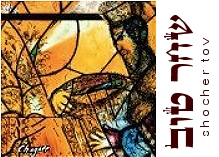
"Seek first the kingdom of God and His righteousness... " - Yeshua (Matt. 6:33)
02.11.25 (Shevat 13, 5785) When we worry, are we not afraid that God will leave us unprotected and vulnerable? Are we not questioning his heart for us? Are we not asking, as the people of Israel once did as they thirsted in desert places: הֲיֵשׁ יְהוָה בְּקִרְבֵּנוּ אִם־אָיִן - "Is the LORD with us or not?" (Exod. 17:7). Indeed, does not the recurring presence of worry within our hearts amount to a confession of our unbelief?
The Scriptures warn us not to "spy after our heart and after our eyes" (Num. 15:39). The Torah mentions the heart first and then the eyes to indicate that the eyes follow the heart. We see as we believe with our heart: "According to your faith be it done unto you." When the spies said, "We are not able to go up (לא נוּכַל לַעֲלוֹת)... for they are stronger than us" (Num. 13:31), they revealed their unwillingness to believe in God's promise, or, to put it another way, they revealed their faith in God's inability to deliver on his word.... Indeed, the Hebrew word for "than us" (מִמֶּנּוּ) can also mean "than Him," suggesting that the spies believed that even God would be unable to uproot the Canaanites. According to their faith, so it was done; by believing that it was impossible, they lost the possibility of God's promise...
Are we truly seeking God "first" or are there other things that have a higher priority in our hearts? Do we wonder if God is to be trusted in the "desert experiences" of our lives? Do we think that God has been unfair to us? Have we sometimes lamented that our way is too hard for us, and more than we can bear? "Lord, I knew you to be a hard man, reaping where you have not sown, and gathering where you have not scattered seed" (Matt. 25:24).
It is possible to misjudge God and misinterpret our relationship with him. "We walk by faith, not by sight." This is true for all people, since every soul lives by faith of some kind or another. Our ability to know him is based on the blessing of the Spirit, not on our own merits. How can we, broken vessels, seek first the kingdom of God, apart from faith in him? Is that not presupposed in all our seeking of the heart? It is faith in God's promises, and faith that God will keep his promises to us, that is the key to seeking first God's kingdom. Those who do not seek do not believe that God is the ultimate concern of their lives.
Faith sees what is possible and refuses to yield to the artificiality of mere appearance. Indeed, appearances are often a test of our courage. We may never know how often a test was given and - just before victory was manifest - the heart grew faint and was lost to fear. "According to your faith be it done to you" is a spiritual principle that applies to everyone. In that sense, it is not that we have faith that matters (since we all do), but whether our faith is grounded in the promises and power of the LORD God of Israel, or something else....
When God told Abram to "get out of your land," he called him to focus on heavenly places – to find his identity there. "Seek ye first the kingdom of God and his righteousness" (Matt. 6:33). The "righteousness of God" is his love, mercy, glory, and goodness. Therefore King David says, אַחַת שָׁאַלְתִּי מֵאֵת־יְהוָה - "One thing have I asked of the LORD, that will I seek after: that I may dwell in the house of the LORD all the days of my life, to behold the beauty of the LORD, and to enquire before his presence" (Psalm 27:4). Likewise, followers of Yeshua no longer find their identity in this world but rather through their spiritual union with the resurrected LORD (Gal. 2:20; 6:14; Eph. 1:3; 2:6)... Therefore we are told to "seek the things that are above (τὰ ἄνω ζητεῖτε) where the Messiah is seated at the right hand of God; focus your thoughts on the things above - not on things here on earth - for you have died, and your life has been hidden (κέκρυπται) with Messiah in God. Then when the Messiah, who is your life, appears, you too will appear with him in glory" (Col. 3:1-4).
Hebrew Lesson
Psalm 16:8 reading (click for audio):
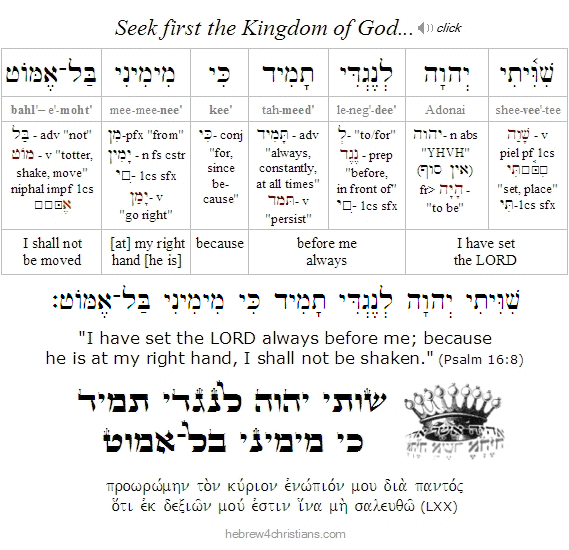 |
The Only Way to Life...
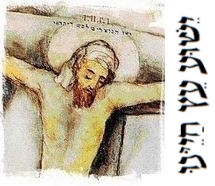
02.10.25 (Shevat 12, 5785) "How long will you go limping between two different opinions?" (1 Kings 18:21). This question from Elijah the prophet is meant for us to hear today. We are being called to make up our minds and turn (shuv) to the LORD. After all, what is more important to you than your relationship with God? Is there anything more important than this?
Abraham Heschel once wrote, "God is of no importance unless he is of supreme importance." Stated differently, it is impossible to be indifferent toward God. You cannot serve two masters. Ultimately you will either hate or love him, but he will never let you be half-hearted toward him (Rev. 3:16).
"Christianity, if false, is of no importance and, if true, is of infinite importance. The one thing it cannot be is moderately important."
- C.S. Lewis: God in the Dock
Yeshua always forced the issue. Consider how often people were offended by his ministry. The gospel message is always offensive to those who make much of themselves. Accepting the cross of Yeshua means abandoning the whole religious game. As Dietrich Bonhoeffer said, "When Christ calls a man, he bids him to come and die."
It is a severe mercy. There is nothing more important to your life -- and therefore nothing more serious -- than your relationship with God. In the end nothing else will matter. Do you truly believe? Are you willing to give up everything you hold dear for the sake of knowing the Lord and living as he bids? Are you prepared to give account for your life?
The exclusive message of the gospel is that we can only find life when we are awake to the risen reality and saving Presence of the One who overcame and vanquished the power of sin and death for our sake. Without Him we are hopeless; with Him we are more than conquerors (1 Cor. 15:14; Rom. 8:37).
In this connection Yeshua said, "I am the vine; you are the branches. If you live in me and I live in you, you will bear much fruit; apart from me you can do nothing" (John 15:5). Whatever else you may hope to do in your life, whatever your dreams or goals may be, all are utterly vain if you if you do not have Christ living within you...
Yeshua also warned those who might be offended over his exclusive claims to be the only Savior of the world: "Enter by the narrow gate; for wide is the gate and broad is the way that leads to destruction, and there are many who go in by it. Because narrow is the gate and difficult is the way which leads to life, and there are few who find it."
We cannot be indifferent to Christ; he is either the most important person we will ever know or he we be nothing to us. "In relationship to God one can not involve himself to a certain degree. God is precisely the contradiction to all that is 'to a certain degree'" (Kierkegaard). The words of Yeshua are scandalous because they demand our full attention. He did not reason with people or make any apology about his utterly unique role as the sole Redeemer of the world. He alone is the way to the Father; He alone is the Healer of the lethal disease of spiritual death. He did not tolerate any discussion on that point, nor did He intend to.
We cannot find an easier, softer way to walk the truth. "Cheap grace is the idea that "grace" did it all for me so I do not need to change my lifestyle. The believer who accepts the idea of "cheap grace" thinks he can continue to live like the rest of the world. Instead of following Christ in a radical way, the Christian lost in cheap grace thinks he can simply enjoy the consolations of his grace" (Bonhoeffer).
May the Lord help us understand that our relationship with him is the most important concern of our lives... May He give us grace to wake up to what really matters! Amen.
Hebrew Lesson
Psalm 27:4 reading (click):
Endurance and Healing...
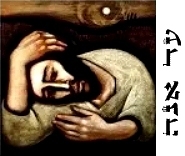
"The test of whether we have truly found the peace of God will be in how we face the sufferings which befall us. Whoever regards suffering and trouble in their own life as something wholly hostile, wholly evil, can know by this that they have not yet found peace with God at all." - Dietrich Bonhoeffer
02.10.25 (Shevat 12, 5785) Though our promised healing assuredly will come to us, it remains the exclusive prerogative of God to allow trials in our lives for our ultimate good. Therefore faith is the key here: Steadfastly affirm your healing even in the midst of your anguish, because your suffering is a test designed to teach you to trust God and to receive the blessing apart from any empirical evidence (2 Cor. 4:18). As the Torah declares of our father Abraham: והאמן בּיהוה ויּחשׁבה לו צדקה -- "And he believed in the LORD, and He counted it to him for righteousness" (Gen. 15:6); and also of Job's faith in the midst of his agonizing struggle: הֵן יִקְטְלֵנִי לוֹ אֲיַחֵל -- "Though he slay me, I will hope in him" (Job 13:15).
Sometimes all we can do is cry out to the LORD for deliverance... Our heart's cry does not question God's goodness to us, though we may silently wonder about the extent to which affliction may be required to mend our hearts. As C.S. Lewis once said, "We are not necessarily doubting that God will do the best for us; we are wondering how painful the best will turn out to be" (Letters of C.S. Lewis, 1964). There is a trust issue in suffering, and an intimacy that comes through its fires. Do not jump to conclusions; resist any insinuation that the Lord is being unjust! As Kierkegaard reminds us, "It is one thing to conquer in the hardship, to overcome the hardship as one overcomes an enemy, while continuing in the idea that the hardship is one's enemy; but it is more than conquering to believe that the hardship is one's friend, that it is not the opposition but the road, is not what obstructs but what develops, is not what disheartens but ennobles" (Four Upbuilding Discourses, 1844).
The difficulty of ongoing personal suffering is deeply existential: how do you keep hope in the midst of this tension? "Lord I believe; help my unbelief" (Mark 9:24). How do you affirm that your heavenly Father will heal you but at the present hour you must continue to endure suffering? Do you then devise a "soul-building theodicy" to explain your struggle – providing a narrative to answer the "why" of your suffering -- or do you attempt to sanctify suffering as a means of healing others by the grace of the Messiah (Col. 1:24)?
When Yeshua victoriously proclaimed, "It is finished" just before he died on the cross, he foreknew that his followers would experience a "purging process," a "refining fire," and time on the "potter's wheel" to perfect their sanctification. At the cross of Yeshua death itself was overcome – and all that it implies – and yet it is nevertheless true that we will suffer and die ourselves and that death persists an enemy (see 1 Cor. 15:26). While we celebrate the reality of the final redemption, the "instrumentality of our sanctification" needs to be willingly accepted and endured. I say "endured" here because I don't think we will ever have a complete answer to the question of "why" we undergo the various tests we face in this life. Our disposition in the midst of seemingly unanswered prayers is where our faith is disclosed: will we despair of all temporal hope or not? Will we console ourselves with the vision of a future without tears and loss - a heaven prepared for us -- or will we resist the present darkness and seek to find deliverance in this hour? Do we trust God with our pain and submit to his will, or will we "die" inside – losing hope and despairing of all remedy?
As King David once wrote, "At an acceptable time, O God, in the abundance of your steadfast love answer me in your saving faithfulness. Deliver me from sinking in the mire; let me be delivered from my enemies and from the deep waters. Let not the flood sweep over me, or the deep swallow me up, or the pit close its mouth over me. Answer me, O LORD, for your compassion is life; in the abundance of your mercies turn to me" (Psalm 69:13-16).
ענני יהוה כי־טוב חסדך
כרב רחמיך פנה אלי

"Answer me, O LORD, for your compassion is life;
in the abundance of your mercy turn to me."
(Psalm 69:16)

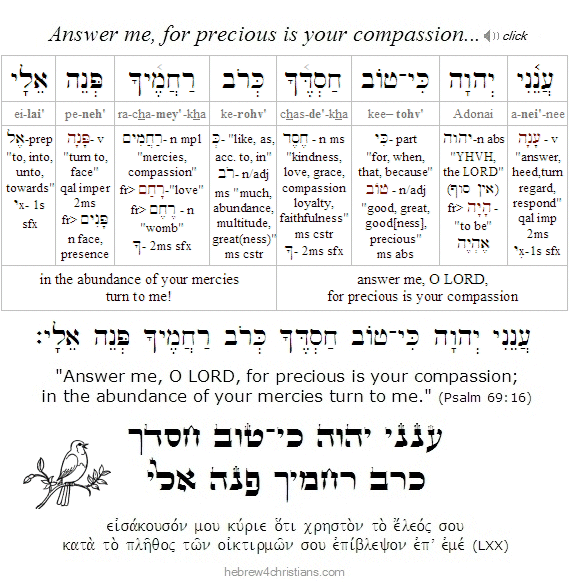
"But You, O GOD my Lord, do Thou for me for your own Name's sake; because your steadfast love is good, deliver me" (Psalm 109:21). "Do thou for me" is the confession that God alone has the power to help. Asking God to bring glory to His own Name -- to honor and magnify His Name -- is the theme of all true intercession.
Suffering has a way of focusing the heart and mind, reminding us that "today is the tomorrow of yesterday." Life is short, and our need is great to turn to the LORD and take hold His promises. We take comfort that God is for us the God of salvation: "Blessed be the Lord, who daily bears us up; God is for us our salvation. Selah. Our God is a God of salvation (יְשׁוּעָה), and to GOD, the Lord, belong deliverances from death" (Psalm 68:19-20).
Be encouraged, chaverim. All those who are "fathered by God" conquer the world, since God imparts the victory of faith by means of His powerful Spirit (1 John 5:4). Therefore the heart of faith steadfastly affirms, "In all these things [afflictions, tribulations, etc.] we are 'more than conquerors' (lit., "hyper-conquerors," i.e., ὑπερνικῶμενfromὑπέρ, "hyper" + νικάω, "to overcome") through Him that loved us (Rom. 8:37).
 |
Waking Up in Time...
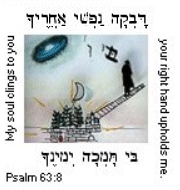
"The end of all things is at hand: therefore be in your right mind and full of prayer" - 1 Pet. 4:7
02.10.25 (Shevat 12, 5785) As we make time to draw close to God and confess ourselves to his heart, we will be delivered from the pain of our fears, despite the ongoing darkness of ha'olam ha'zeh (הָעוֹלָם הַזֶּה), this present age (Psalm 119:105). As King David said, Adonai ori v'yishi, mimi ira: "The LORD is my light and my salvation" – literally, "my Jesus," my Yeshua – "whom shall I fear? Adonai ma'oz chayai: mimi efchad: "The LORD is the strength of my life, whom shall I dread?" (Psalm 27:1). Yeshua is the Light of Life (אוֹר הַחַיִּים), the Healer of the fearful heart, the I-AM-WITH-YOU-ALWAYS One. His love overcomes all our fears. As the apostle Paul asked, "If God is for us, who can be against us?" (Rom. 8:31).
Hebrew Lesson
Psalm 27:1 reading (click):
If we listen closely we will hear the "footsteps of the Messiah" (עִקְּבוֹת מְשִׁיחַ) approaching. Let us then remember the words of our Savior: "when you see these things taking place, you know that the time is near, right at the door" (Mark 13:29), and let us therefore encourage one another to wake up and come alive: "Awake, O sleeper, and arise from the dead, and Messiah will shine on you!" (Eph. 5:14). The message of teshuvah (repentance, "turning back to God") is always, "Wake up - you are living a nightmare." There is only one remedy, and that is found by coming to the Divine Light and opening your heart to the love and Presence of God.
The "Old Covenant" at Sinai?

"In your Seed shall all the nations of the earth be blessed; because Abraham obeyed my voice and guarded my call, keeping my commandments, my statutes, and my laws." (Gen. 26:4-5)
02.10.25 (Shevat 12, 5785) In our Torah portion this week (i.e., parashat Yitro), God revealed the Ten Commandments (i.e., עֲשֶׂרֶת הַדִבְּרוֹת, literally, "the ten declarations") to the Israelites at Sinai, a dramatic event that represented the giving of the law, or the "Old Covenant," to Israel.
Now it may be said that the revelation at Sinai represents an "older covenant" compared with the ministry of Yeshua (see 2 Cor. 3:14; Heb. 7:18, 8:6,13, and here), when looked at from another perspective, Sinai actually represents a relatively new covenant, since it was given later and served as a proviso to the covenant given earlier to Abraham (Gal. 3:18).
As we will see in next week's Torah reading, the culmination of the covenant at Sinai was the revelation of the Altar (i.e., the Tabernacle), which pictured the sacrificial blood "covering" the tablets of God's judgment. This, in turn, recalled Abraham's great sacrifice of his son Isaac (the Akedah), which further recalled the very first sacrifice of the Bible, namely the lamb slain in the orchard of Eden to cover the shame of Adam and Eve's sin (Gen. 3:21; Rev. 13:8). Therefore it was the promise God made to Eve regarding the "Seed to Come" that was the original covenant (Gen. 3:15), and it was this covenant that was later fulfilled by Yeshua, the "Serpent Slayer" of God (Num. 21:9; John 3:14).
This is the "Gospel in the Garden" message, the original promise of the lamb of God that was slain from the foundation of the world... In other words, the "new covenant" (בְּרִית חֲדָשָׁה) may better be understood as the fulfillment of the original covenant, the promise to redeem all of humanity from the curse of sin and death. The redemptive plan of God therefore moves in an ascending circle. The "Tree of Life" (עץ החיים) reaches back to the primordial orchard of Eden and extends into the World to Come...
Because there has been so much confusion regarding the topic of the role of the law, particularly among certain "Messianic believers," I would like to reiterate a few things mentioned elsewhere on this site. Let me first remind you that the legal aspect of the "Torah" refers to the subset of the written Torah called Sefer Ha-Brit (סֵפֶר הַבְּרִית), a portion that defined various ethical, social, and ritual obligations given at Sinai (Exod. 24:7-8). It is therefore a "category mistake" to simply regard the first five books of the "Torah" as the "law," since the law was given later in sacred history, after the Exodus.
Moreover, the Book of Genesis reveals that the very first "priest" (i.e., kohen: כּהֵן) was neither a Jew nor a Levite nor a descendant of Aaron, but rather Someone who is said to have "neither beginning of days nor end of life" but is made like (ἀφωμοιωμένος) the Son of God, a priest continually (Heb. 7:3). This priest, of course, was Malki-Tzedek (מַלְכִּי־צֶדֶק), the King of Salem (מֶלֶךְ שָׁלֵם) to whom Abraham offered tithes after his victory over the kings (Gen. 14:18). The author of the Book of Hebrews makes the point that the priesthood of Malki-Tzedek is greater than the Levitical priesthood and is therefore superior to the rites and services of the Tabernacle (Heb. 7:9-11). It was to Malki-Tzedek that Abram (and by extension, the Levitical system instituted by his descendant Moses) gave tithes and homage -- and rightly so, since Yeshua is the great High Priest of the better covenant based on better promises (Heb. 8:6). As the Scriptures teach, in everything Messiah has preeminence (John 5:39; Luke 24:27; Col. 1:18).
Hebrew Lesson
Genesis 14:19b Hebrew reading:
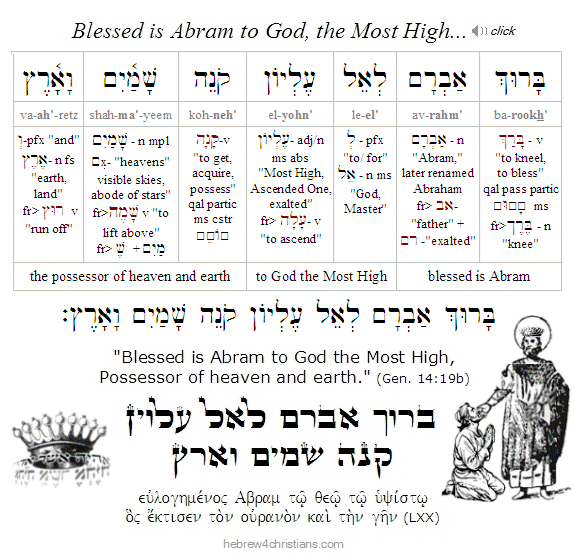 |
These are the words...
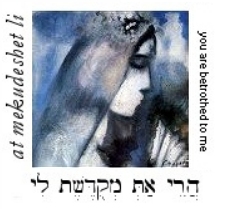
02.10.25 (Shevat 12, 5785) From our Torah portion this week (i.e., parashat Yitro) we read words of great promise and comfort as the LORD "proposed" betrothal with his redeemed people: "You shall be for me a treasured people; you shall be children of the King; you shall be priests who will help others draw near to God... these are the words (אֵלֶּה הַדְּבָרִים) that you (Moses) shall speak (to the people)" (Exod. 19:5-6).
These are the words of love God speaks forth and which evoke the antiphon: "And you shall love the LORD your God with all your heart, with all your soul, with all your substance. Set these words (הַדְּבָרִים הָאֵלֶּה), which I command you this day, upon your heart" (Deut. 6:5-6).
We store up these words so that, in a holy moment, they are quickened within us and we are able to hear the Voice of the LORD speaking from the midst of the fire that burns within our hearts. As Simone Weil said, "love is revelation, and revelation comes only with love."
Hebrew Lesson
Exodus 19:6 Hebrew reading:
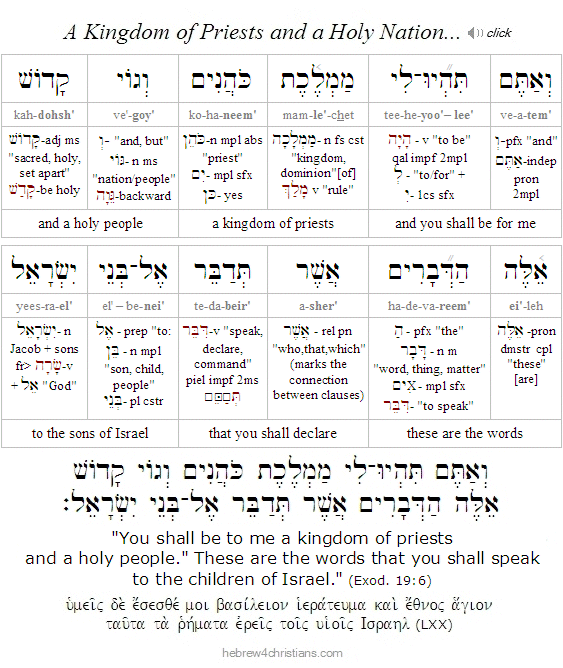 |
Tu B'Shevat New Year...
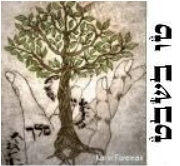
Wednesday February 12th at sundown begins "Tu B'Shevat" (ט"ו בשבט), or the 15th of the month of Shevat, which marks the traditional date celebrating the "New Year" for Trees...
02.09.25 (Shevat 11, 5785) The Bible begins and ends with the great Tree of Life -- first in the orchard of Eden, and later in the midst of the paradise of heaven: "The Tree of Life (i.e., etz ha' chayim: עֵץ הַחַיִּים) was in the midst of the garden..." (Gen. 2:9). "Then the angel showed me the river of the water of life, bright as crystal, flowing from the throne of God and of the Lamb through the middle of the street of the city; also, on either side of the river, the Tree of Life (etz ha-chayim) with its twelve kinds of fruit, yielding its fruit each month" (Rev. 22:1-2). Notice that the "twelve fruits" (καρποὺς δώδεκα) from the Tree of Life are directly linked to the "twelve months" of the Jewish year (κατὰ μῆνα ἕκαστον ἀποδιδοῦν τὸν καρπὸν αὐτοῦ: "each month rendering its fruit"). Twelve months; twelve fruits.... This teaches us that the sequence of the biblical holidays (mo'edim) was intended to teach us revelation about God. That is why God created the Sun and the Moon for signs and for "appointed times" (Gen. 1:14), as it also says: "He made the moon to mark the appointed times (לְמוֹעֲדִים); the sun knows its time for setting" (Psalm 104:19).
Hebrew Lesson
Revelation 2:7 reading (click):
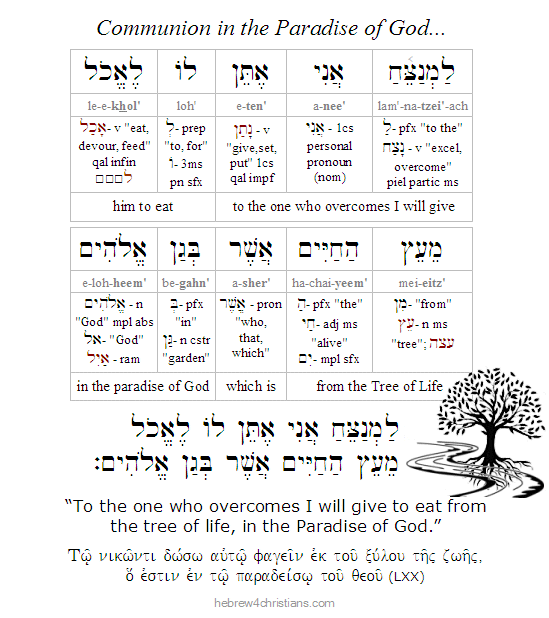 |
The Scriptures state twice: "Take root downward and bear fruit upward" (2 Kings 19:30; Isa. 37:31). As Yeshua said, "unless a grain of wheat falls to the ground and dies, it abides alone; but if it dies, it brings forth much fruit (John 12:24). We pray we might surrender ourselves to the Lord fully, being immersed in His passion, "bearing fruit in every good work (ἐν παντὶ ἔργῳ ἀγαθῷ καρποφοροῦντες) and growing in da'at HaShem (דַעַת אֱלהִים) - the knowledge of God" (Col. 1:10). The "fruit of the righteous is a Tree of Life" lit., etz chayim (עֵץ חַיִּים), literally, "the Tree of lives" (Prov. 11:30). It is the fruit of Yeshua, the Tzaddik of God, the Righteous One, who bears fruits of healing in the lives of those trust in Him...
The "Tree of Life" is mentioned a total of ten times in Scripture, corresponding to the "ten words of God" (i.e., the Ten Commandments). It is first mentioned in the center of the original garden of Eden (Gen. 2:9; 3:22-4), but it was soon lost to humanity because of Adam's transgression. In the book of Revelation, it reappears in the center of the heavenly Paradise of God (Rev. 2:7, 22:2), resurrected on account of the faithful obedience of Yeshua as mankind's "last Adam" (1 Cor. 15:45). Those who have washed their robes by means of His righteousness are given access to this Tree in the heavenly Jerusalem (Rev. 22:14). The paradise lost by Adam has been regained by the greater "Son of Man," Yeshua the Messiah, the Savior of us all. Amen.
Giving of the Law:
Parashat Yitro - יתרו

Our Torah reading this week (Yitro) includes the account of the giving of the Torah at Sinai...
02.09.25 (Shevat 11, 5785) Last week's Torah portion (i.e., Beshalach) recounted how the LORD delivered the children of Israel from Pharaoh's advancing armies by dramatically drowning them in the Sea of Reeds. The Israelites were overjoyed over their new freedom and celebrated by singing the "Song of the Sea." Despite their newfound freedom, however, the people soon began complaining about the hardship of life in the desert. Nonetheless God was gracious and provided fresh water and manna from heaven as he led them by the Pillar of Cloud by day and the Pillar of Fire by night to Mount Sinai (Exod. 13:21-22).
In our Torah portion for this week, parashat Yitro, Moses' remarkable father-in-law Jethro (i.e., "Yitro") heard how God delivered Israel from Egypt and set out from the land of Midian to the desert area of "Rephidim" to meet with Moses. There Moses recounted the great story of the Exodus, telling him all that the LORD had done to Pharaoh and to the Egyptians for Israel's sake. Jethro rejoiced, blessed the LORD, and offered sacrifices which were communally eaten with Moses' brother Aaron and the 70 elders of Israel (Exod. 18:1-12).
After this celebration, Jethro observed how Moses sat every day to judge the people "from morning to evening" and expressed concern that his son-in-law was taking on too much responsibility. Jethro then advised his son-in-law to appoint a hierarchy of magistrates and judges to help him govern the people, thereby freeing Moses to be a more effective prophet and intercessor before the LORD. Jethro's wise counsel helped implement the system of justice that later became the basis of Jewish social law (i.e., the Sanhedrin, etc.).
Six weeks after leaving Egypt (i.e., the 1st day of the month of Sivan), the Israelites encamped opposite Mount Sinai, the place where Moses was initially commissioned at the "burning thornbush." Moses then ascended the mountain, and there God instructed him to tell the leaders that if they would obey the LORD and keep His covenant, then they would be mamlekhet kohanim ve'goy kadosh -- a "kingdom of priests and a holy nation." After returning down the mountain to deliver this message to the elders, the people responded by proclaiming, kol asher diber Adonai na'aseh ("all that the LORD has spoken, we shall do"). Moses then ascended the mountain again and was told to command the people to prepare themselves to experience the presence of God upon the mountain in three days.
According to Jewish tradition, on the morning of the "third day" (i.e., the sixth of Sivan, exactly seven weeks (49 days) after the Exodus), all the children of Israel gathered at the foot of Mount Sinai, where the LORD descended amidst thunder, lightning, billowing smoke, fire, and the voluminous blast of the heavenly shofar. The LORD then declared the foundation of moral conduct required of the people, namely, the Ten Commandments, which begins with the words: "I AM" (Exod. 20:2). Because the vision was so overwhelming, the terrified Israelites began beseeching Moses to be their mediator lest they die before the Presence of God. The portion ends as the people stood far off, while Moses alone drew near to the thick darkness where God was (Exod. 20:21).
Hebrew Lesson
Exodus 19:5a Hebrew reading:
יציאת הגדולה של ישוע
Greater Exodus of Yeshua...
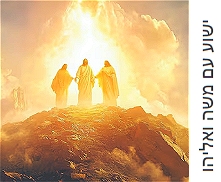
The vision of Yeshua's eternal glory revealed to the disciples on the mountain foretold that His sacrificial death and resurrection was the essence of God's redemption of humanity... With Moses to his right and Elijah to his left, the Lord spoke of the greater Exodus that would be secured 'b'yad chazaka u'vizroa netuyah' - by his strong outstretched arms upon the cross.
02.07.25 (Shevat 9, 5785) Recall that after the apostle Peter had rightly confessed that Yeshua was the "Messiah of God" (מְשִׁיחַ הָאֱלֹהִים), Yeshua went on to explain that his role as the "Son of Man" would require suffering many things, including being rejected by the elders and chief priests and scribes of Israel, and that he would be killed, but raised from the dead on the third day (Luke 9:18-22). He then asked his followers to soberly count the cost of discipleship: "If anyone desires to come after Me, let him deny himself, and take up his cross daily, and follow Me. For whoever desires to save his life will lose it, but whoever loses his life for My sake will save it. For what profit is it to a man if he gains the whole world, and is himself destroyed or lost? For whoever is ashamed of Me and My words, of him the Son of Man will be ashamed when He comes in His own glory, and in His Father's, and of the holy angels" (Luke 9:23-26). Yeshua then foretold that that were some standing there who would not "taste death" until they had seen the Kingdom of God...
Some eight days later Yeshua called Peter, James, and John to ascend with him upon a mountain (likely Mount Hermon) to pray. As Yeshua was praying, he was "transfigured" before them and his face and clothes becoming dazzlingly bright and radiant with the Shekhinah glory (תהילת שכינה). The disciples then saw Moses and Elijah in their glorified state talking with Yeshua - a fantastic scene right out of the heavenly places! But notice that that the topic of conversation during this amazing meeting was Yeshua's "departure," that is, his death and resurrection -- literally, his "Exodus": τὴν ἔξοδον αὐτοῦ -- which he would accomplish at Jerusalem (see Luke 9:31). This is the great connecting point between the revelation of Torah at Sinai (Moses and the prophets) and the revelation of Torah at Zion (Yeshua as Messiah ben Yosef, the Suffering Servant). At Mount Sinai the great vision was given of the Altar upon which a lamb was offered every day and night (קָרְבָּן תָּמִיד) in commemoration of the Passover (Exodus) from Egypt; at Mount Zion the great vision was the cross of Messiah, upon which the blood of the true Lamb of God would be offered as "Messiah our Passover" (1 Cor. 5:7) that delivers us from slavery to sin and spiritual death.
Recall that Yeshua said: "Do not think that I have come to abolish the Law or the Prophets; I have not come to abolish them but to fulfill them. For truly, I say to you, until heaven and earth pass away, not a Yod (י), nor a "thorn" of a Yod (i.e., kotzo shel yod: קוֹצוֹ שֶׁל יוֹד), shall in any way pass from the Law until all is accomplished" (Matt. 5:17-18). Both the Torah of Moses (תורת משה) and the words of the Hebrew prophets (דברי הנביאים) foretold of the coming of Messiah who would purge Israel from her sins and establish the glory of God before the nations. Yeshua is the central meaning of all true Torah....
The Exodus from Egypt is the central miracle of the Torah because it prophetically tells the story of the redemption of God's people throughout the dispensations. Israel's deliverance from bondage to Pharaoh serves as an allegory of both the salvation promised to Adam and Eve after losing their freedom to Satan as well as the fulfillment of the promises to the Jewish people of the ccoming Savior of Israel (מושיע ישראל) who would establish God's kingdom on the earth. Yeshua is both the Savior of the world (מושיע העולם) as well as Israel's true King and Deliverer. The true Exodus, however, is the one accomplished by the sacrifice of Yeshua as the great Lamb of God who takes away the sins of the world. The death, burial, and resurrection of Yeshua is the central miracle of the Scriptures, fulfilling the original promise given to Adam and Eve of the coming deliverer who would remedy the curse of death and restore the glory of Eden.
The great story of God's redemption is revealed on two levels in Scripture - one that concerns the restoration of Eden (the universal level), and the other that concerns the restoration of Israel (the particular level). Therefore Yeshua is both rightly called the "Lamb of God who takes away the sins of the world" (John 1:29) and "the Messiah our Passover Lamb who has been sacrificed for us" (1 Cor. 5:7). Likewise he is both called the "Seed of the woman," and "the Son of David"; he is called the "Second Adam," and the "King of the Jews," and so on.
 |
God's redeeming love was present from the very beginning (Psalm 90:3). He is the Lamb slain from the foundation of the world. The midrash states that Adam was created from the "dust of the Temple." After Adam's transgression, the Tree of Life was "removed from reach" and guarded by cherubim until the blood that spoke a "better thing than the blood of Abel" was offered for the redemption of mankind (Heb. 12:24). This "better thing" was prefigured in many ways in Scripture: through the martyrdom of Abel, through the Akedah of Isaac, through the blood of the lamb that delivered Israel from the angel of death, through the blood sprinkled upon the kapporet ("mercy seat") of the Ark of the Covenant, through the sacrifice of the Red Heifer, and most especially through the sacrificial death of Yeshua upon the Cross at Moriah.... Those who trust in the sacrifice and victorious resurrection of the Messiah are given access to eat of the Tree of Life in the Paradise of God (Rev. 2:7; 22:14).
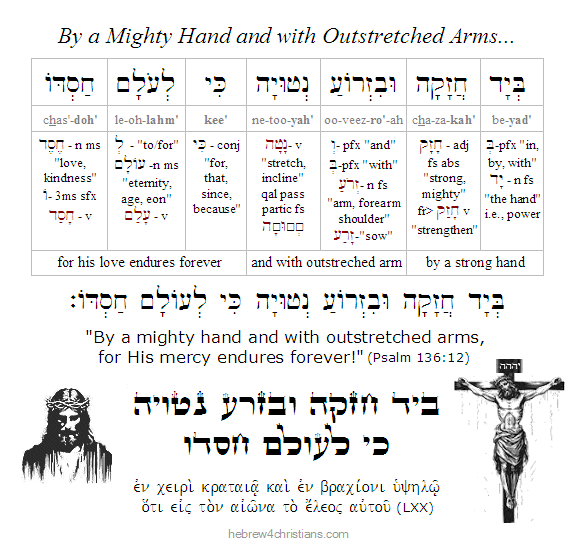 |
Yeshua "lifted up" is the antidote to the venom delivered through the serpent's bite (John 3:14-15). "For as in Adam all die, so also in Messiah shall all be made alive" (1 Cor. 15:22). The "new seed" of life given to us in Yeshua makes us into a "new creation" (בְּרִיאָה חֲדָשָׁה) that fully restores the disfigured image of God within us: "Just as we have borne the image of the man of dust, we shall bear the image of the man of heaven" (1 Cor. 15:49).
Hebrew Lesson
Psalm 68:18a reading (click):
Blessing of Willingness...
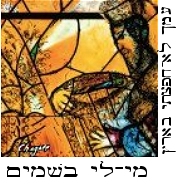
"Let me seek you in the darkness of my silence, and find you in the silence of Your light, which is love shining as the sun, flowing like the river, and joying like the heart." - Meister Eckhart
02.07.25 (Shevat 9, 5785) When King David repented from his sin and asked God's forgiveness, he appealed to the LORD: "Restore me to the joy of your salvation (יְשׁוּעָה) and sustain me with a willing spirit. Then I will teach transgressors your ways, and sinners will return to you" (Psalm 51:12-13). The sages comment that this is indeed the way of the LORD (דֶּרֶךְ יְהוָה), namely, to confess your sin, and in brokenness and heartfelt contrition, to return to the LORD full of hope in his steadfast love. In this way, sinners will understand the truth of Torah and return to the LORD God as well.... Hashiveinu, Adonai.
In the Torah we read: "if you seek for the LORD your God from there (i.e., in your place of exile), you will find him, if you search for him with all your heart (בְּכָל־לְבָבְךָ) and with all your soul" (Deut. 4:29). From where do we search, from what place, except from a place of hardship, testing, and tribulation? If you seek for the LORD your God from there - in the midst of your exile, in the midst of your heart's cry - you will find him there, in your heart. This message is a prophecy to the heart of faith, so that after testing befalls you, in the end you will belong to the LORD and will hear his voice. Amen, may God keep you close to his heart.
Hebrew Lesson
Psalm 51:12 reading (click):
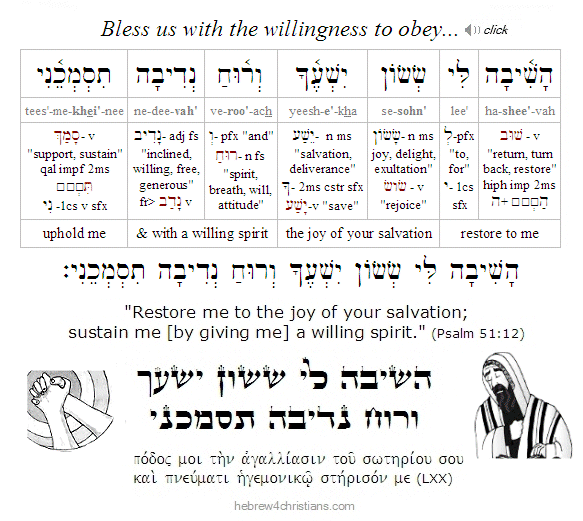 |
Heavenly ABC's...
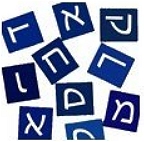
02.07.25 (Shevat 9, 5785) A verse from our Torah portion this week (i.e., Beshalach) contains all the letters of the Hebrew alphabet (i.e., aleph (א), bet (בּ), gimmel (ג), etc.). The special verse reads, "This is what the LORD has commanded: 'Gather of it, each one of you, as much as he can eat. You shall each take an omer (עמֶר), according to the number of the persons that each of you has in his tent'" (Exod. 16:16).
Since this refers to the manna the Israelites were to collect for their daily bread, and this verse contains all the letters of the alphabet, we may "poetically" infer that if we immerse ourselves in the Scriptures, "from Aleph (א) to Tav (ת)," God will provide us with the "daily bread" (לֶחֶם חֻקֵּנוּ) we need, just as He did when the bread from heaven (לֶחֶם מִן־הַשָּׁמָיִם) was miraculously given to feed the Israelites in the desert.
Therefore Yeshua, who is the Aleph and Tav, taught us to pray, "Give us this day our daily bread," which surely refers to the spiritual food (i.e., encouragement, hope, life) that we receive from the Word of Life (Deut. 8:3; Matt. 4:4).
The Lord said to those trusting Him: "Don't be anxious about tomorrow, for tomorrow has its own troubles. Live one day at a time" (Matt. 6:34). It makes no sense to worry about the future if the LORD is the Good Shepherd who tenderly watches over your way (Psalm 23:1). Every day we are given daily bread, but we must remember that manna could not be stored up without becoming rotten (Exod. 16:20). God's provision is "sufficient unto the day...."
Hebrew Lesson
Matt. 6:11 Hebrew reading (click):
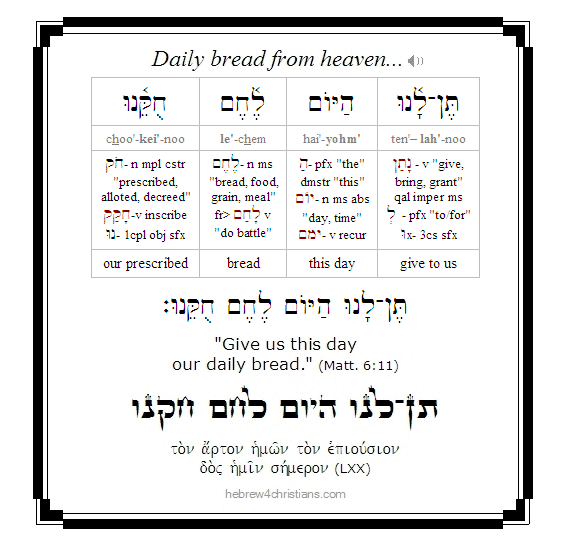 |
Isn't it amazing how studying the Hebrew text reveals further insights into the Scriptures? Kotzo shel yod... And may you rest in the promise: "My God will supply every need of yours - "from A to Z" - according to his riches in glory in Yeshua the Messiah" (Phil. 4:19). He is lechem ha'chaim - the Living Bread from heaven (John 6:51)!
|













































